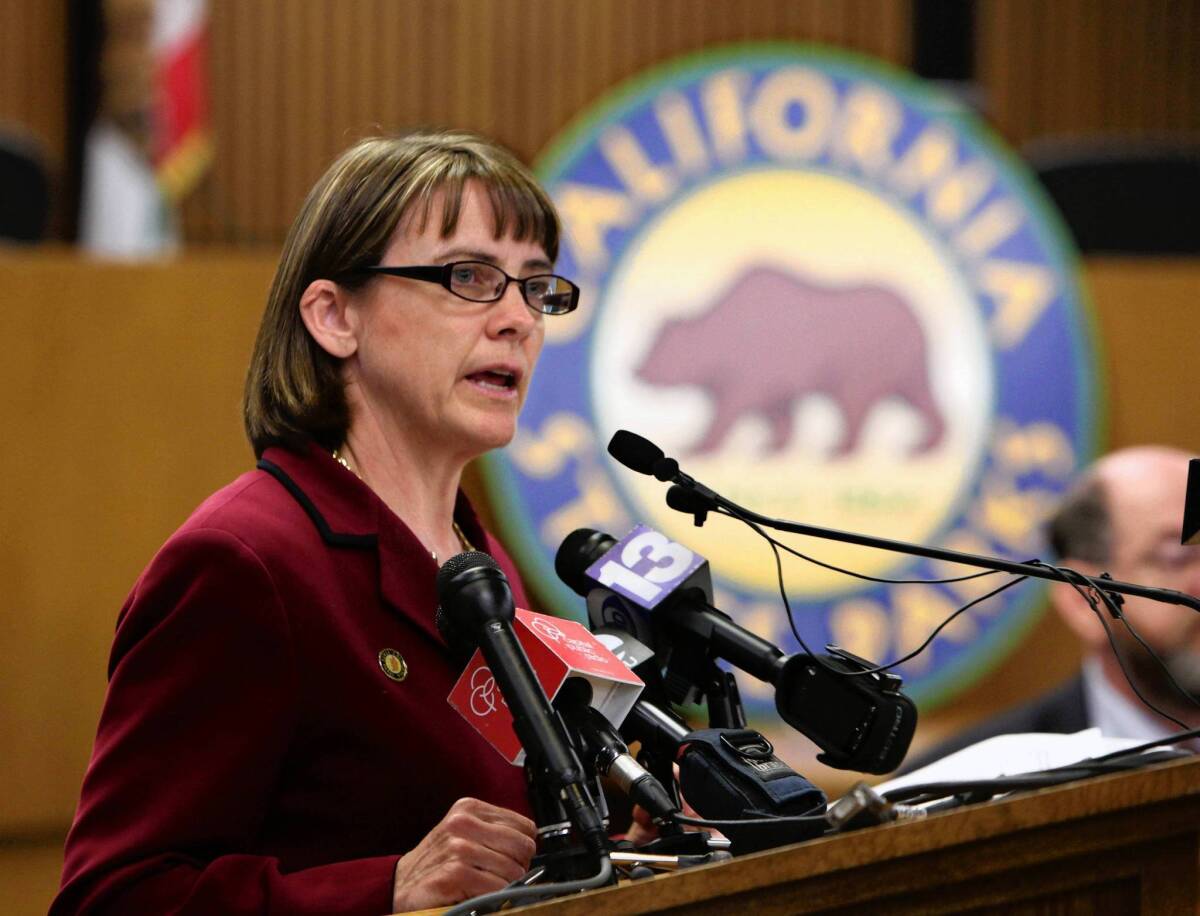California Politics Podcast: The view of the Trump era from the Golden State
It’s been an unprecedented 100 days. And perhaps no state in the nation has reacted more strongly to the administration of President Trump than California.
This week’s podcast is a special episode taped at the recent Los Angeles Times Festival of Books. Our topic was the view of the Trump era from California, a glimpse at how the state’s political compass has been reset as the president’s agenda unfolds.
I’m joined by a special panel of Los Angeles Times political writers: Mark Barabak, Seema Mehta, Liam Dillon and Melanie Mason.
California’s budget could miss the mark on April tax revenues by $600 million

California’s most important month for collecting income taxes could end some $600 million short of official projections, based on preliminary data collected Friday.
The independent Legislative Analyst’s Office reported that personal income tax collections stood at $13.45 billion, with a final day of tax refunds to be reported on Monday. By comparison, Gov. Jerry Brown’s proposed budget assumed the month would net $14 billion for state budget coffers.
April is historically a key month for taxes paid by Californians, bringing in a larger share of the revenues used to run the state government than any other part of the year.
Once refunds were subtracted, Friday’s tally came in at just $9 million. That’s compared to more than $300 million collected on the same day in 2016.
The state’s fiscal year ends June 30. If tax revenues fail to meet projections, that changes the available dollars Brown and lawmakers have to divvy up for the coming budget year.
In January, the governor projected a $1.6-billion deficit in the coming budget. April’s revenue total — if it misses the target as expected — could lead to new worries about lawmakers when it comes to setting new funding priorities. However, state tax revenues through the end of March were $1.15 billion above Brown’s estimates, meaning that a slump in April could be easily absorbed.
“This probably will leave the state close to even with the administration’s projections for 2016-17 as May begins,” wrote the analysts in an online tax revenue update posted Friday.
Villaraigosa pledges to restore ‘a little luster’ to the California dream in a campaign stop in the Inland Empire
Antonio Villaraigosa argued Friday that he is best suited to be California’s next governor because he had been tested when he was Los Angeles’ mayor during the recession, and had proven that he could make politically unpopular decisions in the best interests of the people.
“Look at the track record. I’ve not been afraid to take on my friends. I’ve not been afraid to say no,” Villaraigosa told a couple hundred people at a luncheon at an automotive school in Rancho Cucamonga. He noted that he furloughed 37,000 city employees and laid off 1,000 workers during the recession to stave off bankruptcy, and challenged the city’s school district and teachers union because he believed they were failing students.
“I took on those interests even though they were probably the most important group that got me elected. I made tough calls,” he said. “I think the next governor is going to have to make tough calls.”
Villaraigosa is one of three main Democrats running to replace termed-out Gov. Jerry Brown next year. Lt. Gov. Gavin Newsom and Treasurer John Chiang have a financial advantage over Villaraigosa, but the former Los Angeles mayor was the last of the trio to enter the race. He didn’t mention his rivals by name, but he noted that after he accepted the invitation to address the Inland Empire Economic Partnership, the others followed suit. The other two men will address the group in June.
Villaraigosa’s appearance in Rancho Cucamonga is not surprising. His path to victory relies upon garnering support in the Inland Empire and the Central Valley, once GOP strongholds that are now more politically mixed, but whose Democrats are not as rigidly liberal on economic and environmental issues as coastal and Bay Area voters. His campaign is also predicated on support in Los Angeles and among Latinos, groups of voters who don’t cast ballots in proportion to their numbers.
Villaraigosa noted that he spent 51 days touring the state and talking to voters. Twenty-six were in the Central Valley and five were in the Inland Empire, two regions where the economic recovery has not taken hold as strongly as it has in other parts of the state.
“The next governor,” he said, must understand “he has to show up in the Inland Empire not just when he’s knocking on your door and asking for your vote.”
Ensuring that opportunities for residents of inland areas are equal to those in more affluent, coastal areas is crucial to restoring “a little luster” to the California dream, the 64-year-old said.
Villaraigosa, who was elected mayor in 2005 with great fanfare but faced tumult over his two terms because of personal scandal as well as the challenges of the recession, demurred when asked if he hoped to run for president.
“I want to be governor of this state, and I want to do a great job as governor and then we’ll see what happens after that. But more than likely, I’ll be riding into the sunset,” he said. “After two terms, just to be clear.”
Brown administration releases draft rules for sale of medical marijuana in California

The Brown administration on Friday released draft regulations for the sale and use of medical marijuana in California, beginning a process that is likely to see changes sought by some in the industry, law enforcement and state legislators.
For instance, the Legislature has to determine how to merge the rules for medical pot with regulations approved by the voters in November legalizing the sale of recreational cannabis.
“The broad objectives of these proposed regulations are to create a state licensed and regulated commercial cannabis market,” the rules said. “The specific benefits anticipated are increased protection of the public and the environment from the harms associated with an unregulated commercial cannabis market.”
The rules require applicants for licenses to grow, transport and sell marijuana for medical use to get a license from the state Bureau of Medical Cannabis Regulation and undergo a background check.
People who transport marijuana between farms and dispensaries would be prohibited from owning that pot, according to the rules, and they must be 21 or older.
Dispensaries would have to use a track-and-trace system to monitor activity involving the cannabis they sell.
The new rules say cannabis edibles must be sold in child-resistant, opaque packaging and have no more than 10 milligrams of THC per serving. Dispensaries will be restricted to operating from 6 am to 9 pm
Assemblyman Ken Cooley (D-Rancho Cordova) objected Friday that proposed changes to the law approved in 2015 by the Legislature “are not just a problem for lawmakers, but actually are in violation of how Proposition 64 described how the two systems of law would operate side-by-side.”
The state has scheduled four hearings on the proposed rules, including one for 10 a.m. June 8 at the Junipero Serra Building in Los Angeles.
California lawmakers to introduce anti-offshore-drilling legislation next week
California Atty. Gen. Xavier Becerra vows to fight any attempt to allow more oil drilling off coast of state
California Atty. Gen. Xavier Becerra said Friday he is prepared to fight any attempt to expand oil drilling off the California coast despite an order signed by President Trump calling for a study of new oil and natural gas exploration.
“We will vigorously oppose new drilling off the shores of our coast,” Becerra said in a statement. “California is leading the way in clean energy production and policies that preserve our state’s pristine natural resources. Instead of taking us backwards, the federal government should work with us to advance the clean energy economy that’s creating jobs, providing energy and preserving California’s natural beauty.”
See the Los Angeles Times coverage of the new order here.
Lawmakers propose expanding L.A. County Board of Supervisors from 5 to 7 members with one elected executive
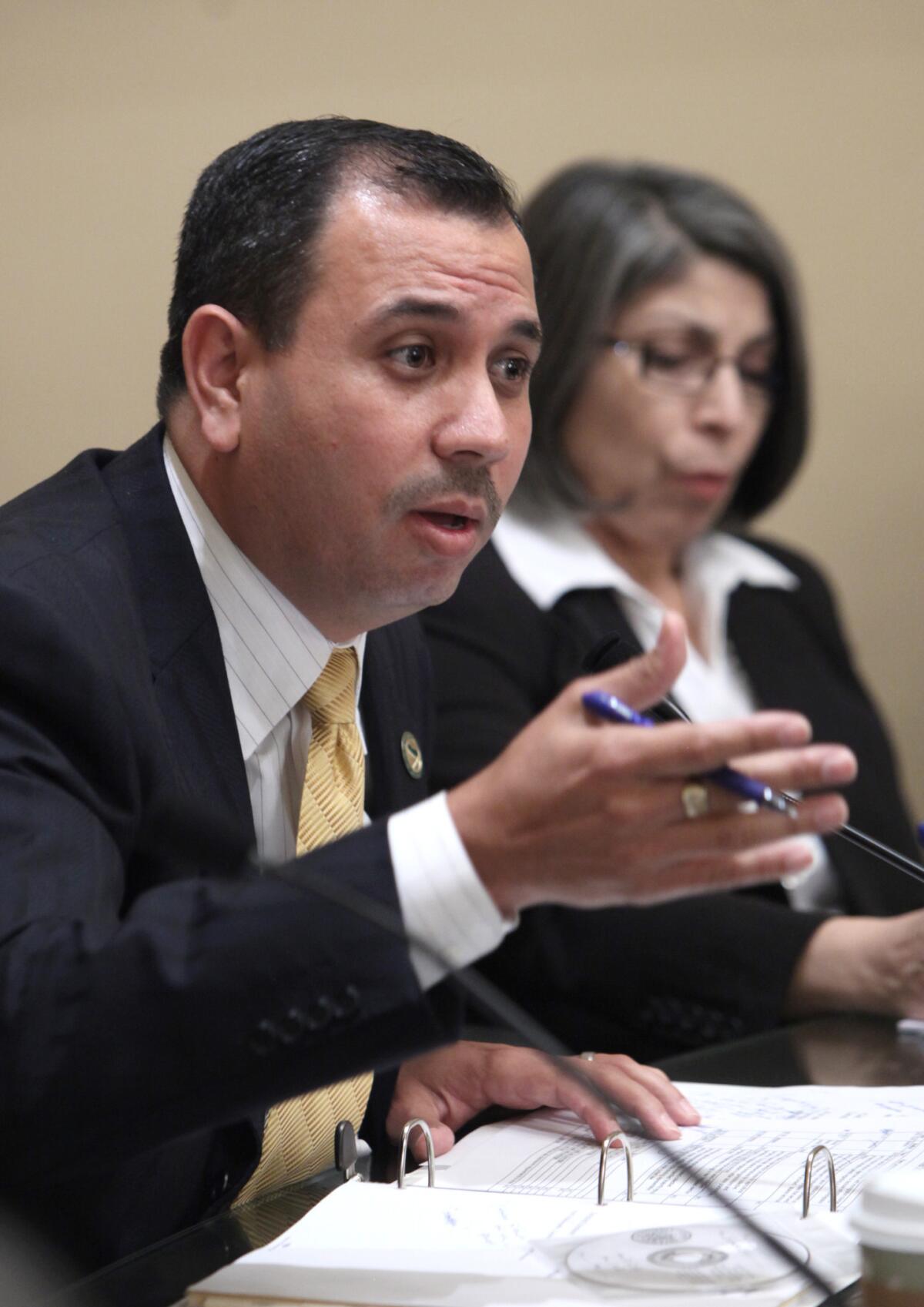
A group of nine state lawmakers on Thursday introduced a bill that would seek to improve representation of people of color on the Los Angeles County Board of Supervisors by expanding it from five to seven members and creating a position of an elected county executive.
State Sen. Tony Mendoza (D-Artesia) is the lead author on the legislation that would put the matter of changing the state Constitution to a vote on the California ballot in June 2018.
“Counties with millions of residents deserve a government that is responsive, transparent and accountable,” Mendoza said Thursday. “By expanding representation and creating a professional management position, we address multiple issues and will actively improve local government for all Californians.”
A civil county grand jury recommended last year that the board be expanded and an elected executive position be created, but the Board of Supervisors turned down the proposal.
In 2015, a similar proposal by Mendoza to expand the boards of supervisors in Los Angeles and other large counties failed to win a necessary two-thirds vote in the Senate. That proposal did not include an elected county executive.
Sen. Ben Allen (D-Santa Monica) had opposed the 2015 plan as unwieldy because it lacked an elected chief executive.
He is a co-author of the new bill, along with Republican Sen. Scott Wilk of Santa Clarita and Democratic senators such as Bob Hertzberg of Van Nuys and Steven Bradford of Gardena.
“If Los Angeles County were a state, it would be the eighth largest,” Wilk said. “I believe L.A. County is too large and should split up. However, this proposal will make county government more accountable and is an important first step to transforming regional government.”
Currently, two people of color sit on the five-member Los Angeles County Board of Supervisors.
Alan Clayton, a demographics expert who consulted on the bill, said a seven-member board would result in one seat competitive for Asian American candidates and two seats competitive for Latinos, who make up half of the county’s population. The current board does not have Asian American representation among its members.
“It will have a huge impact on the minority communities of Los Angeles County,” Clayton said. “It will create a more diverse board.”
Clayton also said the creation of the position of an elected county executive would provide a new opportunity for the large crowd of top Democrats in the state vying to move up to a limited number of powerful positions.
County voters have rejected previous proposals to expand the board, in part because of concerns it would create a more expensive and larger bureaucracy.
The new measure, SCA 12, which would take effect in 2022, would seek to hold costs down by prohibiting the expanded board’s budget from exceeding funding in 2021, and limit the new elected county executive’s pay to the salary received by the presiding judge for the Los Angeles County Superior Court. The supervisors would remain limited to three terms of four years each.
Rep. Jeff Denham says he’s a ‘no’ on the new GOP healthcare bill, but most California Republicans are undecided
Nearly two-thirds of the 14 Republicans in the California congressional delegation are still reviewing changes to the GOP healthcare plan, and only four have taken a firm position on it.
In the latest version of the healthcare bill, Republicans are considering an amendment designed to win over the most conservative members of their majority by giving states the option of doing away with the so-called essential health benefits that Obamacare requires insurers to cover. The previous version of the bill was pulled off the House floor before a vote was held.
The undecideds include Reps. Steve Knight (Palmdale), Darrell Issa (Vista), Dana Rohrabacher (Costa Mesa), Ken Calvert (Corona), Paul Cook (Yucca Valley), Doug LaMalfa (Richvale), Ed Royce (Fullerton) and David Valadao (Hanford), according to their staffs and media reports.
Rohrabacher and Calvert were among the Republicans who had said they would have voted “yes” for the previous version of the bill that was pulled before they could vote.
Staff for Reps. Mimi Walters (Irvine) and Duncan Hunter (Alpine) said the members support the new version. House Majority Leader Kevin McCarthy (Bakersfield) also supports it.
Rep. Jeff Denham (Turlock) told the Hill, a newspaper focused on Capitol Hill, that he does not support the new version of the healthcare bill.
Since most Democrats are expected to remain lined up pretty firmly against the bill, Republicans are on their own to pass it.
House Republicans can afford to lose around two dozen of their own members and still pass it without Democratic help.
State-funded nonprofit group spent on ‘questionable activities’ including overseas travel, auditor finds
A poorly run nonprofit group that has received state funds to help small businesses get loans is in danger of becoming insolvent next year unless it gets more money, but the state should not provide funding without reforms, a state audit concluded Thursday.
The report by State Auditor Elaine Howle said the State Assistance Fund for Enterprise, Business and Industrial Development Corporation (SAFE‑BIDCO) has done some good helping businesses.
But it has not attempted to obtain more money from fundraising, and has imprudently spent limited funds on “questionable activities,” including 16 out-of-state trips and a trip to Ireland by its chief executives, the audit said.
In addition, the group continued to use a business development contractor even though he did not achieve his performance goals, and it continued with this contract without a competitive bidding process.
“As a result of these issues, we are reluctant to recommend that the state appropriate funding without increased direct oversight to ensure adequate reporting and controlled expenses,” Howle wrote to Gov. Jerry Brown and the Legislature. “We believe direct oversight could occur by establishing SAFE-BIDCO as a program within the state treasurer’s office.”
California single-payer healthcare bill passes first committee test
A sweeping measure that would establish government-run universal healthcare in California cleared its first legislative hurdle on Wednesday, as scores of supporters crammed into the state Capitol to advocate for a single-payer system.
The Senate Health Committee approved the measure on a 5-2 vote after a nearly three-hour hearing, but Democrats and Republicans alike signaled unease with the major question still unanswered in the legislation: how the program would be paid for.
The bill, SB 562, would establish a publicly run healthcare plan that would cover everyone living in California, including those without legal immigration status. The proposal would drastically reduce the role of insurance companies: The state would pay for all medical expenses, including inpatient, outpatient, emergency services, dental, vision, mental health and nursing home care.
Freshman state Sen. Josh Newman says campaign to recall him comes from ‘hyper-partisan special interests’
Freshman State Sen. Josh Newman (D-Fullerton) filed a formal response Wednesday to the recall campaign that is targeting him because he voted for a bill increasing gas taxes and vehicle fees for road and bridge repairs and mass transit.
The recall papers were filed April 19 by Elvira Moreno and 59 others, with the aid of conservative radio talk show host Carl DeMaio. They must collect 63,592 signatures of registered voters in 160 days to qualify the measure for the ballot.
In a statement, Newman’s campaign noted that he was just elected in November.
“Now the same out-of-town, hyper-partisan special interests who opposed Josh’s election are attempting to stage a costly and unnecessary recall campaign,” the statement said. “They are cynically misrepresenting Josh’s support for sorely needed local road repairs as a pretext for removing him from office.”
Records show responses to state auditor’s surveys were altered after intervention by UC Office of the President
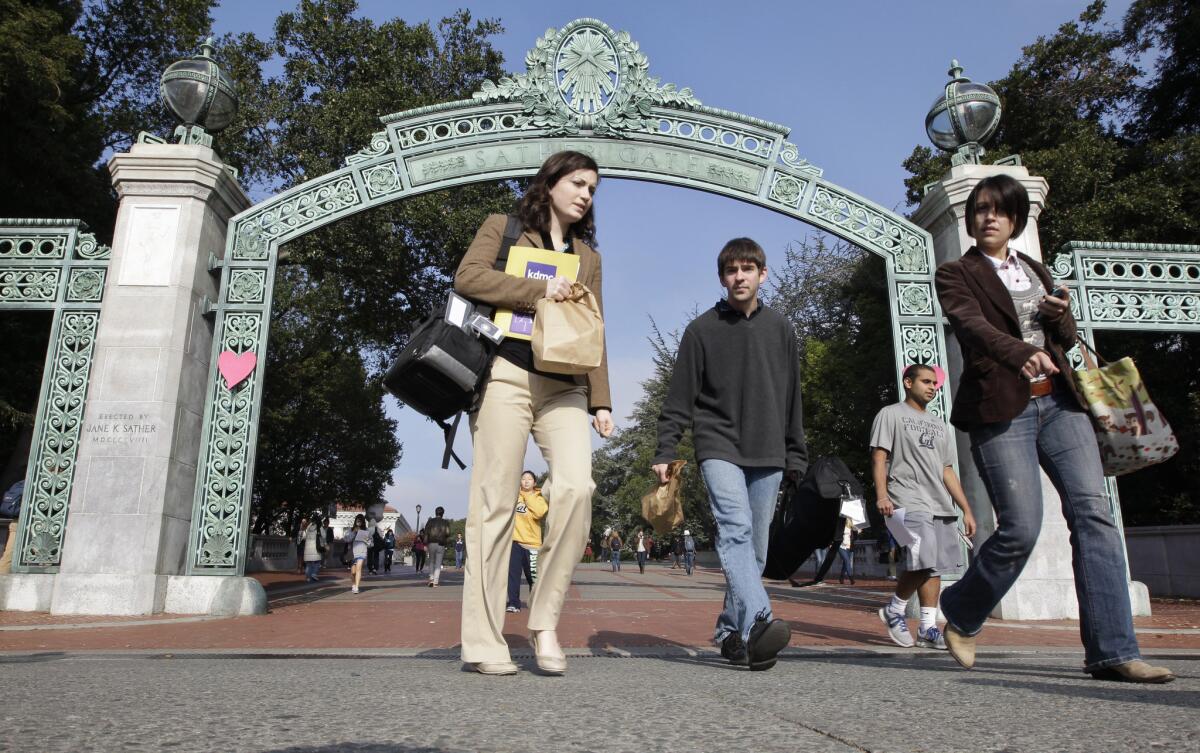
Hit with a surprise survey by state auditors, officials at University of California campuses changed their responses and dropped criticism of the UC Office of the President after it contacted them, instead offering more positive reviews of its effectiveness, according to documents released as part of the audit.
UC officials said Wednesday that the president’s office did not censor the responses, but State Auditor Elaine Howle said her office is continuing an inquiry into the alleged interference by the UC administration to determine whether it violated policies or laws and should be referred for further action.
“My legal staff is looking at it to determine whether we’ve got a situation where there might be an improper governmental activity,” Howle said. “Then once we complete some of that assessment, that will determine whether we conduct an investigation internally or whether we make any referrals.”
Howle’s audit, released Tuesday, found that the UC Office of the President paid excessive salaries and benefits to its top executives and did not disclose to the UC Board of Regents, the Legislature, and the public $175 million in budget reserve funds that could have helped reduce a 3% tuition increase scheduled for this fall.
Howle alleged in the audit and a letter to the governor that “the Office of the President intentionally interfered with our audit process.”
Two legislative committees have scheduled a joint hearing on the audit and the allegations of interference for 2:30 p.m. Tuesday at the Capitol. The survey was an attempt to find out how administrators at the 10 UC campuses viewed the effectiveness of the Office of the President.
“Although we explicitly asked each campus not to share its survey results with anyone outside of the campus, we learned in February 2017 that the Office of the President had requested campuses to send their survey responses to it,” the audit said, “and that the deputy chief of staff of the Office of the President organized a conference call with all campuses to discuss the survey and screened the surveys before the campuses submitted them to us.”
The audit said Howle’s office asked the deputy chief of staff to provide her with copies of the original survey results to compare with the final versions turned over to auditors. Auditors were given both copies.
“When we compared the prescreened versions of the surveys to the versions the campuses subsequently submitted to us, we found that the responses were changed to make the Office of the President appear more efficient and effective,” the audit said.
UC spokeswoman Dianne Klein denied that the president’s office acted improperly.
“Nobody was asked to alter anything,” she said.
Assemblyman Phil Ting (D-San Francisco), chairman of the Assembly Budget Committee, said he wants to hear answers at his hearing on Tuesday.
“Every year the University of California complains the Legislature doesn’t give them enough money. Yet, the audit found they don’t spend what we give them and secretly hoard it for pet projects,” Ting said. “This is not a good start to ensure the best interests of students as we close out the budget. I hope the system comes to this hearing seeking to restore its credibility and discuss how these extra funds can be used to increase access to this great university.”
Nancy Pelosi wades into congressional runoff to replace Xavier Becerra
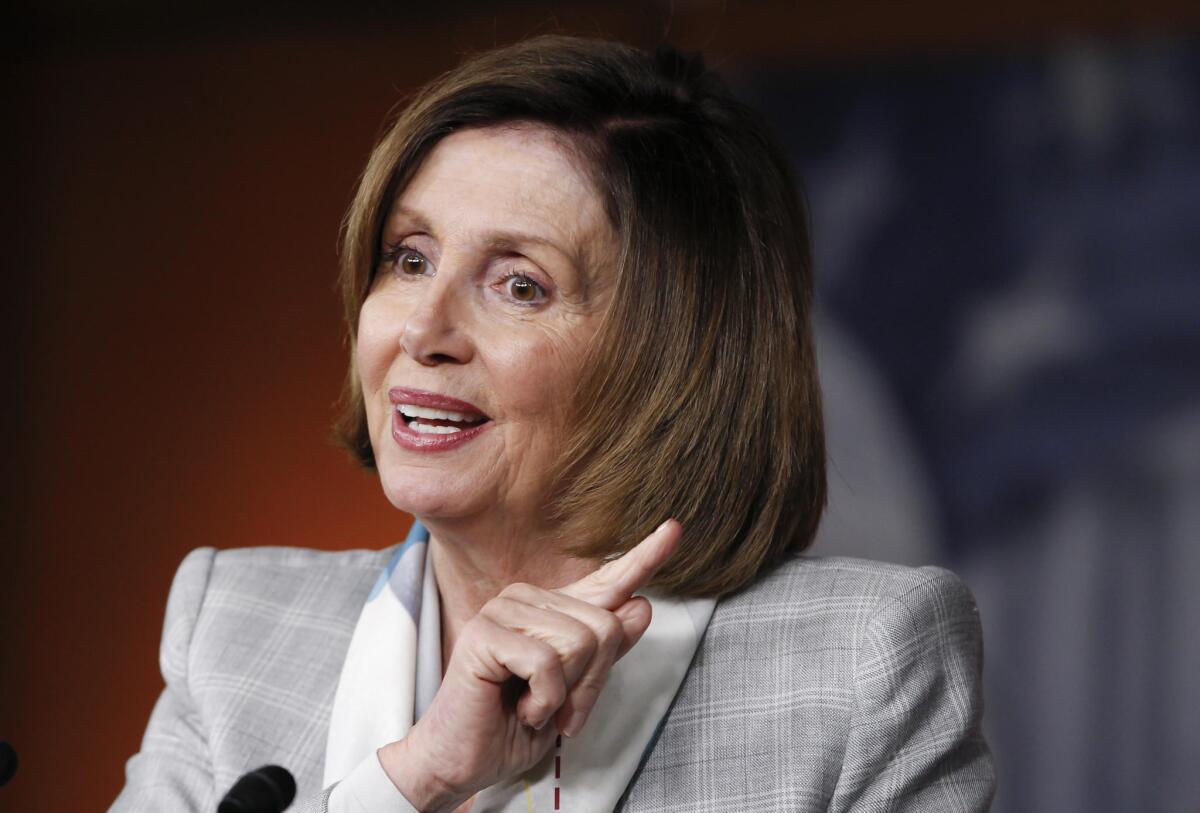
House Minority Leader Nancy Pelosi (D-San Francisco) has weighed in on the race in Los Angeles’ 34th Congressional District, endorsing Assemblyman Jimmy Gomez over former L.A. city planning commissioner Robert Lee Ahn.
Pelosi spokesman Jorge Aguilar confirmed the endorsement.
Gomez and Ahn are both Democrats.
Gomez has received dozens of endorsements from elected officials in California’s Democratic Party establishment. Pelosi is the most prominent of a dozen California members of Congress who have endorsed Gomez so far.
Democrats hitting California Republican lawmakers on proposed exemption for Congress in new health bill
The Democratic Congressional Campaign Committee is up with digital ads dinging Republicans over a proposal to exempt mbmers of Congress from some changes to the Affordable Care Act.
The amendment, which was introduced Tuesday night and first reported by Vox, allows states to opt out of the Affordable Care Act’s ban on charging more or denying health insurance to people who have a preexisting condition. But, as it’s currently written, that opt-out would not apply to Congress and congressional staff.
The sponsor of the carveout, Rep. Tom MacArthur (R-N.J.), said Wednesday his proposed amendment is being changed so it no longer exempts members of Congress and their staff. A vote on the bill isn’t expected until next week at the earliest.
The Democrats’ ads will target seven California Republicans who represent districts that backed Hillary Clinton for president: Reps. Jeff Denham (Turlock), David Valadao (Hanford), Steve Knight (Palmdale), Ed Royce (Fullerton), Mimi Walters (Irvine), Dana Rohrabacher (Huntington Beach) and Darrell Issa (Vista).
“This digital ad campaign will educate voters in targeted districts about this morally bankrupt congressional carveout,” DCCC spokesman Tyler Law said in a statement.
Nationally, the ads will target 30 Republican-held districts.
The National Republican Campaign Committee pushed back on the ad buy.
“Democrats’ desperate defense of the failing Obamacare law has cost them dearly election after election. If national Democrats want to continue spending money to prop up public support for the status quo causing skyrocketing premiums and families to lose coverage, that’s their money to burn,” NRCC spokesman Jack Pandol said.
-------------
UPDATES
11:24 a.m.: This article was updated with comment from the National Republican Campaign Committee.
This article was originally published at 9:32 a.m.
Nancy Pelosi just got a challenger and he’s a ‘pretty hard-core’ Bernie Sanders supporter
San Francisco attorney Stephen R. Jaffe is a lifelong Democrat and he intends to do what no Democrat has been able to do so far: make it to a runoff election against House Minority Leader Nancy Pelosi.
Jaffe, 71, is an employment attorney who became a volunteer for the Bernie Sanders presidential campaign last year.
------------
FOR THE RECORD
1:08 p.m.: A previous version of this post misstated Jaffe’s age as 72.
------------
“I was a pretty hard-core Bernie supporter,” said Jaffe, who gave money to the campaign and volunteered during the Nevada caucuses. He was one of two attorneys who filed for an injunction on behalf of Sanders supporters in the California primary, requesting “re-votes” and an extension of the voter registration deadline. (The request was denied.)
Jaffe said he was “devastated” by Sanders’ loss to Hillary Clinton in the primary season and that Sanders, in part, inspired him to run. He says he supports single-payer healthcare and criticized Pelosi for raising money from corporations and special interests.
Pelosi, the highest-ranking Democrat in the House, has never faced a serious challenger on the left in her liberal San Francisco district. Preston Picus, another Sanders supporter who ran as a no-party-preference candidate, came the closest when he received 19% of the vote in November, according to the California Target Book.
“I know that Ms. Pelosi’s strategy has been to essentially ignore anyone who has challenged her, but I anticipate she’ll have a more difficult time doing that with my candidacy,” Jaffe said in an interview. He thinks if local, progressive activists can propel him to a runoff with Pelosi, he’ll have a “quite realistic chance” of winning.
“There’s a rumbling, a wave of activism here by people who have really never stepped forward before.”
Riverside Democratic Rep. Mark Takano faces two Republican challengers for 2018
Two Republican challengers will run against Riverside Democratic Rep. Mark Takano in the 2018 primary.
Air Force veteran Aja Smith, who now works as an information technology specialist at the March Air Reserve Base, is the latest Republican to jump into the race. She grew up and now lives in Moreno Valley.
Republican Doug Shepherd of Riverside, a real estate broker who lost to Takano in 2016, will be looking for a rematch in 2018.
Both face long odds: Democrats represent 46.57% of registered voters in the district, while Republicans comprise just 27.9%. An additional 21.08% list no party preference.
Takano won reelection with 64.95% of the vote last year.
Smith has a compelling personal story: She joined the military after the Sept. 11, 2001, terrorist attacks; her grandfather and grandmother served in the military; and her great-uncle was a Tuskegee airman.
Though this is her first campaign, she’ll come to it with some local political experience. She helped lead a recall effort against former Moreno Valley City Councilman Marcelo Co before he resigned amid a bribery scandal.
She launched her campaign attacking Takano as a “do-nothing” politician.
“Constantly speaking out of both sides of his mouth is something voters in this district have come to expect from a career politician like Takano,” she said.
Shepherd said the local Republican Party will be investing in voter registration ahead of the midterm elections. He hopes the lack of a presidential election will mean the race will be about local issues.
“I think we can focus on some of the real local issues and not all that national junk,” he said.
California Atty. Gen. Becerra praises court ruling that blocks Trump executive order threatening ‘sanctuary cities’
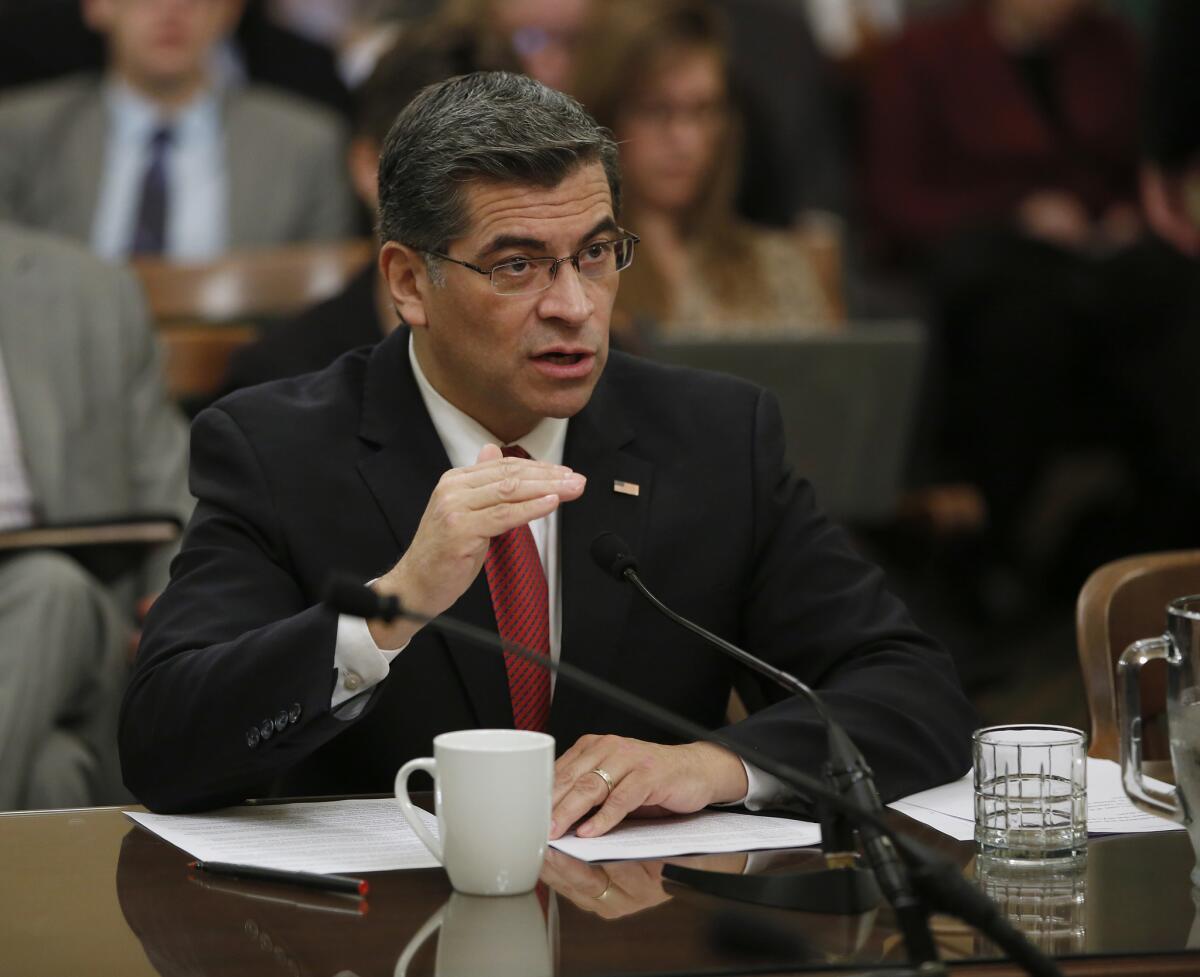
California Atty. Gen. Xavier Becerra said he welcomed a federal court decision Tuesday that blocked President Trump’s executive order threatening to withhold federal funding from cities, counties and states that adopt so-called sanctuary policies on immigration.
Becerra’s office had filed court papers challenging the threat to withhold money from jurisdictions that do not cooperate with federal immigration agents.
A federal judge in San Francisco granted a preliminary nationwide injunction Tuesday against the order.
“As California continues to abide by the Constitution, yet another court has ruled against the Trump Administration’s executive overreach,” Becerra said in a statement. “My office has been clear: we will not compromise our values to accommodate the new Administration, which seeks to hijack crucial resources, sow fear among California families and make our communities less safe. This injunction is consistent with the rule of law. In California, we will always fight to protect our people.”
The court decision also drew approval from state Senate President Pro Tem Kevin de León (D-Los Angeles).
“President Trump has tripped over the Constitution again,” De León said in a statement. “A federal judge has rightfully issued a constitutional victory for states, counties and cities. The state of California, along with our cities and counties like San Francisco and Santa Clara that value the contributions of their immigrant communities, will continue to protect all of our honest, hardworking residents against the cynical and destructive policies of this administration.”
Rep. Devin Nunes draws a challenger: a Fresno County deputy D.A.
Fresno County Deputy Dist. Atty. Andrew Janz will challenge Rep. Devin Nunes in the 22nd Congressional District.
“I have a strong connection to the area. I think I can be a competitive candidate, I think I have a pull here on what people think is important,” Janz, a 33-year-old Democrat, said in a phone interview.
Nunes, a Republican from Tulare, has gained national notice in recent months in the course of his role as chairman of the House Select Intelligence Committee.
He stepped away from leading the House investigation of Russian interference in the 2016 presidential election over accusations that he may have disclosed classified information. Those accusations came after Nunes revealed to reporters that conversations by Trump transition officials may have been inadvertently picked up by U.S. surveillance, and said he met with the source of the information at the White House.
As he stepped down from leading the investigation, he blamed “left-wing activists” for causing a “distraction.”
Janz seems poised to use Nunes’ perceived missteps as he pursues the congressional seat.
“The congressman is more concerned with defending himself, defending the president, Donald Trump, against all these allegations,” Janz said.
Janz grew up in the Central Valley district in Visalia, returning after college in 2014 to join the Fresno County district attorney’s office, where he works in the violent crimes unit.
Janz attended Cal State Stanislaus, earning a bachelor’s degree in economics in 2006 and a master’s degree in public administration in 2009. He earned a law degree from Southwestern Law School in 2012 and clerked for Nevada 8th Judicial District Court Judge Carolyn Ellsworth. His wife, who is also a native of the district, owns a marriage and family counseling business.
People back in the farming district south of Fresno don’t seem too concerned about Nunes’ Washington troubles, and Janz will have to fight an uphill battle to unseat him.
Nunes has gotten more than two-thirds of the vote in all but one of his eight congressional elections. In 2016, he beat Democrat Louie Campos with 68.2% of the vote. Republicans hold a significant voter registration advantage in the district, which includes parts of Tulare and Fresno counties.
Janz said he hopes to build support from progressives, moderates and dissatisfied Republicans.
“The bottom line is that the people are frustrated with their representative and they really just want to be heard,” Janz said. “Their feeling right now is that they’re being ignored by their congressman.”
------------
FOR THE RECORD
4:47 p.m.: This article was updated to correct a quotation from Fresno County Deputy Dist. Atty. Andrew Janz to say, “I think I have a pull here on what people think is important,” rather than “I think I have a poll here on what people think is important.”
-------------
Build it and be banned: Lawmakers move to block state contracts for any builders of Trump’s border wall
California legislators took the first step Tuesday to ban state government contracts for any company that helps build President Trump’s promised wall along the Mexico border, with the author of the plan urging colleagues “to be on the right side of history.”
The bill by state Sen. Ricardo Lara (D-Bell Gardens) would prohibit any company from receiving a new or extended contract with the state of California if it participates in a future effort to build a new wall along the 2,000-mile international border.
“The wall is another attempt to separate and divide us,” Lara said in testimony to the Senate Governmental Organization Committee. “It sends a message that we are better off in a homogenous society.”
Senate Bill 30 won committee passage on a party-line vote, with Republicans expressing concern about the need for additional border security. Representatives of the construction industry also voiced opposition, arguing Lara’s bill forces contractors into the middle of a divisive political fight.
“This is precedent-setting,” said Todd Bloomstine, a lobbyist representing the Southern California Contractors Assn. “What next unpopular project would be [on the] blacklist?”
Lara told lawmakers he will amend the bill to exclude any work by a company — including current bids on border wall projects — that takes place prior to the bill’s becoming law.
Trump’s campaign promise of a new border wall remains in limbo in Washington, as members of Congress on both sides of the aisle voice skepticism about its funding.
Tuesday’s hearing in Sacramento often veered into the appropriateness of the wall itself, with environmental groups expressing concerns about animal species that live on both sides of the border. That testimony became emotional for Juan Altamirano, an associate director of Audubon California who crossed the border with his family as a young child.
“We need more migration and not stagnation,” Altamirano said.
Water officials brief lawmakers on $275-million price tag for Oroville Dam repairs

California will be racing to finish $275 million in repairs to the Oroville Dam spillways to prepare for the next rainy system, top water officials told lawmakers on Tuesday.
Bill Croyle, acting director of the Department of Water Resources, said the deadline is Nov. 1.
Damage to the spillways in February forced thousands to evacuate from the area downstream of the country’s tallest earthen dam.
Croyle surprised some lawmakers by saying the emergency spillway, a hillside adjacent to the dam, worked as intended by releasing water from the reservoir when it overflowed after heavy rains. Erosion in the hillside could have caused a concrete wall along the rim of the reservoir to collapse, sending torrents of water into the rivers and towns below.
“Erosion was expected,” Croyle said. “The erosion of the rock,” which helped fortify the hillside and the concrete wall, “was not expected.”
The emergency spillway, which had never been used before, handled far less water than expected before failing.
“That’s a design flaw. Right?” said Assemblyman James Gallagher, a Republican whose district’s border runs along the dam.
The crisis was averted when officials decided to risk more damage to the concrete spillway, which had also suffered from erosion as tens of thousands of cubic feet of water per second were being released.
University of California administration is paying excessive salaries and mishandling funds, state audit says
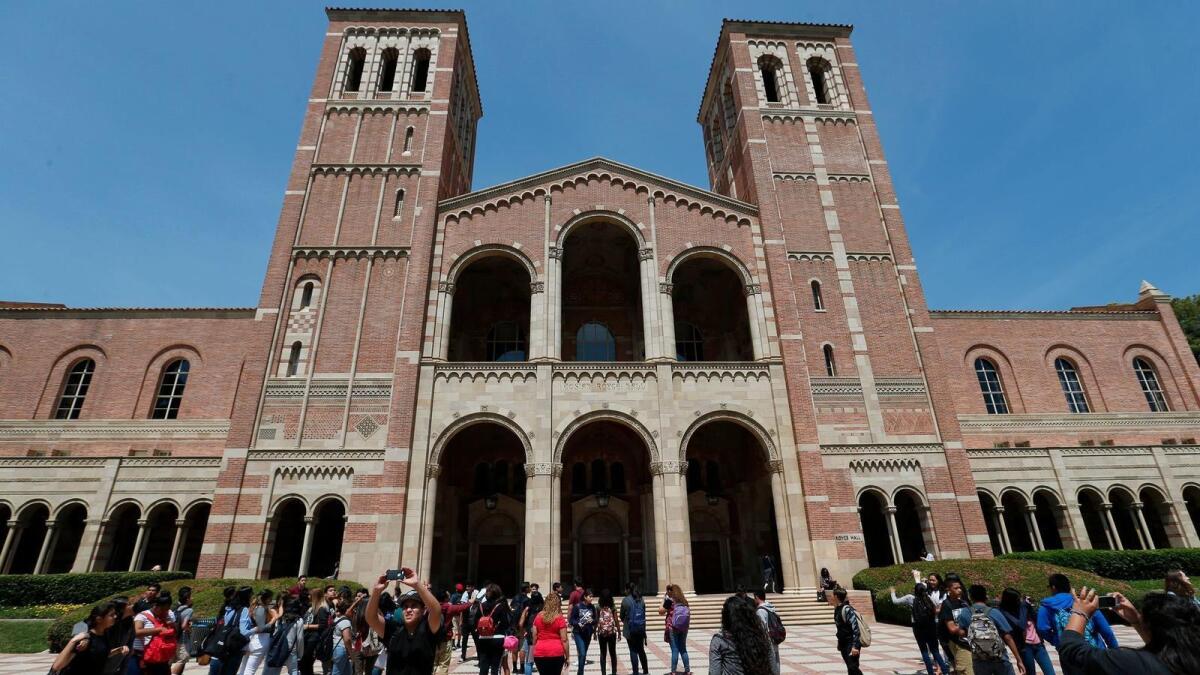
The administration of the University of California system pays top workers salaries and benefits significantly higher than that of similar state employees, and failed to disclose to the Board of Regents and the public that it had $175 million in budget reserve funds while it was seeking to raise tuition, a state audit found Tuesday.
The audit triggered a dispute with UC President Janet Napolitano, who said charges of hidden funds were false, while two members of the UC Board of Regents charged recommendations to give the Legislature budget authority over the Office of the President encroached on UC’s constitutional powers.
Among the sticking points, the auditors believe the regents should contract with an independent third party that can assist the regents in monitoring a three-year corrective action plan.
The audit of the Office of the President also found that it failed to satisfactorily justify its spending on system-wide initiatives and “inappropriately” screened surveys submitted by auditors to campus officials.
“Our report concludes that the Office of the President has amassed substantial reserve funds, used misleading budgeting practices, provided its employees with generous salaries and atypical benefits, and failed to satisfactorily justify its spending on systemwide initiatives,” State Auditor Elaine Howle wrote to Gov. Jerry Brown and the Legislature.
“Furthermore, when we sought independent perspective from campuses about the quality and cost of the services and programs the Office of the President provides to them, the Office of the President intentionally interfered with our audit process,” Howle wrote.
The auditor said that because of recent tuition hikes, she recommends the Office of the President should refund available funds in the reserves by returning them to the campuses for the benefit of students.
Ralph Washington Jr. president of the U.C. Students Assn. said if any reserve money is found it should go to help students, possibly by killing the tuition increase or helping students who are starving or homeless, but he is concerned legislators may use the audit to say the U.C. doesn’t need so much general fund money.
“Students definitely don’t want their tuition to go up,” he said.
Assembly Speaker Anthony Rendon (D-Paramount), who serves on the board of regents, said the audit requires more inquiry.
“The audit of the UC Office of the President appears to have uncovered the same kind of budgetary misrepresentations and executive excess that we’ve seen before with the State Parks Department and the Public Utilities Commission,” Rendon said in a statement. “There are many questions that need to be answered—and answered honestly.
The audit was requested by legislators concerned about high tuition and complaints of a bloated administration overseeing the UC system’s 10 campuses.
“The reserve included $32 million in unspent funds it received from an annual charge levied on the campuses—funds that campuses could have spent on students,” the audit said.
Auditors said salaries paid to those in the president’s office are much higher than the pay of comparable positions in other state government jobs.
President Napolitano agreed with the vast majority of recommendations for improving budget processes and spending, but denied that $175 million was hidden from the UC Board of Regents.
In a letter to Howle, the president said changes were already underway.
“The recommendations to [the UC president’s office] are helpful,” Napolitano wrote. “We welcome this constructive input, which aligns with our proactive efforts to continually improve UCOP’s operations, and UCOP intends to implement the recommendations.”
However, Board of Regents Chair Monica Lozano and Regent Charlene Zettel asked Howle to remove recommendations that they feel encroach on the constitutional autonomy of the university system, including proposals to have the Legislature approve the Office of the President’s budget.
“As written, we believe these recommendations threaten the University’s standing as a constitutionally autonomous entity, and the Board of Regents itself,” the regents wrote.
Administrative salaries amounted to $2.5 million more than the maximum annual salary ranges for comparable state employees, auditors found.
For instance, an accounting manager’s maximum annual salary is $169,000 at UC compared to $156,000 for other state employees.
An information system manager can make $258,000 with UC, but $150,000 with other state agencies.
The audit said: “10 executives in the Office of the President whose compensation we analyzed were paid a total of $3.7 million in fiscal year 2014-15 — over $700,000 more than the combined salaries of their highest paid state employee counterparts.”
On benefits, the Office of the President provided a regular retirement plan but also offered its executives a retirement savings account into which the office contributes up to 5% of the executives’ salaries—about $2.5 million over the past five years, the audit found.
“The Office of the President also spent more than $2 million for its staff’s business meetings and entertainment expenses over the past five years—a benefit that the State does not offer to its employees except in limited circumstances,” the audit said..
The audit also said the Office of the President reimbursed questionable travel expenses, including a ticket for a theater performance and limousine services. One person spent $350 per night on hotel rooms, which is above the allowable standard for other state agencies.
The audit said the Office of the President has not managed its own budget — which amounted to $747 million in fiscal year 2015–16 — “in a fiscally prudent or transparent way.”
Napolitano said the audit was in error in claiming her office failed to publicly disclose tens of millions in surplus funds.
“In fact, UCOP’s budget and financial approaches reflect strategic, deliberate and transparent spending and investment in UC and state priorities,” said a statement by the Office of the President.
Howle disagreed.
“Significant reforms are necessary to strengthen the public’s trust in the Office of the President,” the audit concluded.
California Rep. Grace Napolitano will run for an 11th term in Congress
Rep. Grace Napolitano (D-Norwalk), who easily beat out a Democratic challenger in the November election, says she will seek reelection in 2018.
Napolitano, 80, pointed to her seniority and experience — 10 terms in Congress — in a campaign announcement Tuesday.
“We are at a critical point in our nation, with a new administration that has lost sight of the core values that this nation was founded on,” she said in a statement. “It is imperative that we have members in Congress who are experienced and ready to fight, day to day, to bring the federal resources that address our community’s pressing needs and the many challenges ahead.”
Napolitano suffered a minor stroke in 2016 that affected her ability to write and slightly slowed her walk, but she continued her reelection campaign and beat former Democratic state Assemblyman Roger Hernandez of West Covina.
He was seen as a potentially strong challenger when he announced his run, but he effectively ended his campaign in August after a judge granted his ex-wife’s request for a domestic violence restraining order against him.
After some speculation that Napolitano might retire, two hopefuls for her seat emerged.
Mary Ann Lutz, the former mayor of Monrovia and a former aide to Napolitano, has been raising money to run — but said she will run only if Napolitano retires.
The same goes for Andre Quintero, mayor of El Monte and a former Napolitano intern. He has been raising money for a run, but like Lutz said he would not challenge his former boss.
Napolitano starts off the race with $146,780 in the bank.
Gov. Jerry Brown warns labor members of Republican public works plans that might ‘enrich Wall Street’
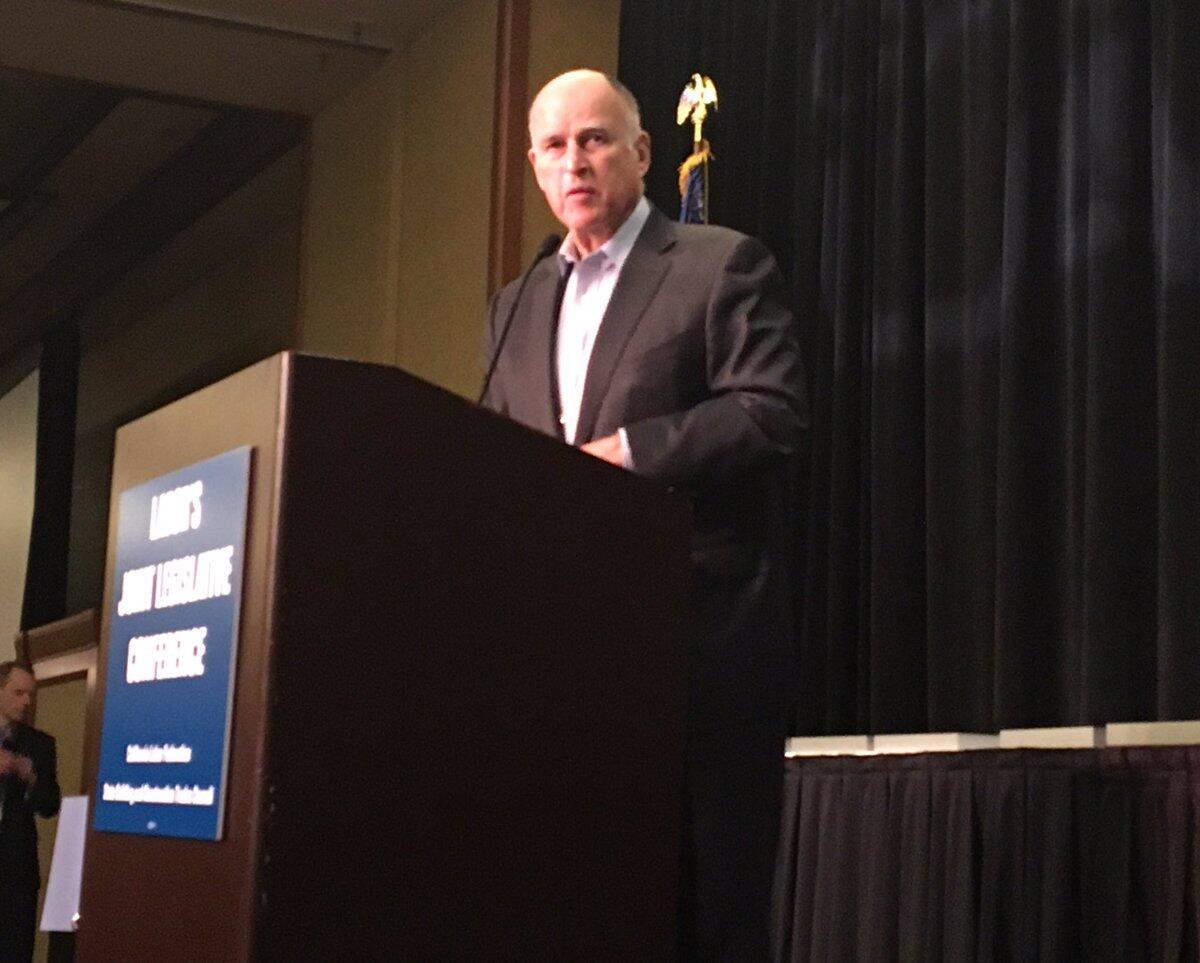
Gov. Jerry Brown warned on Monday that what he’s heard so far from President Trump and congressional Republicans on a major new infrastructure plan sounds more like a way of benefiting the private sector.
“Let’s invest in America, not sell it off to the highest bidder,” Brown said in an evening speech to the annual conference of the California Labor Federation and the State Building and Construction Trades Council.
The governor, who thanked labor leaders for helping to wrangle votes in the Legislature for the $52-billion transportation plan approved earlier this month, sounded a note of skepticism about the notion of public-private partnerships that could be at the heart of Trump’s promise to launch a $1-trillion national effort.
“Here’s what they want to do, this is the Republican idea: sell, liquidate,” Brown said, referring to what he said could be efforts to finance the effort by selling off publicly owned assets.
“And who benefits?” he asked the crowd. “The guys who put the deal together, the investment bankers who provide all the paper. So watch out for this infrastructure program, that it isn’t another way to enrich Wall Street, providing all the financing for the selling of all our public jewels and assets.”
California submitted a $100-billion list of infrastructure projects last month to federal officials in hopes of securing a portion of any available dollars. That list included additional federal assistance for California’s current effort to build a north-to-south high-speed rail system.
Brown lauded the Legislature’s recent action on transportation — funded by a higher gas tax and a new vehicle transportation fee — as a more responsible approach to repairing infrastructure.
“I’d like to see the California model: We pay for what we need. We get what we pay for. And we pay as you go,” he said.
Orange County Republican Rep. Ed Royce picks up a 2018 challenger
A former chemistry professor will challenge longtime Rep. Ed Royce (R-Fullerton) — one of the seven Republican members of Congress in California whom the Democratic party has said it will target for defeat in the 2018 midterm elections.
Phil Janowicz, a former chemistry professor at Cal State Fullerton who now runs a education consulting firm, is a first-time candidate. He’ll start his campaign Tuesday.
“People have become disgusted by the current state of our politics in Washington, D.C. Partisanship and gridlock, never-ending conflict, and promises to ‘drain the swamp’ that are broken as quickly as they are made,” he said in a statement. “Our country and our communities deserve better.”
Royce was first elected in 1992 and is the chairman of the House Foreign Affairs Committee.
Democrats are targeting the district — which mostly composes voters in north Orange County but also includes Diamond Bar and Chino Hills — in part because because Hillary Clinton took 51.5% of the vote there compared with Trump’s 42.9%.
But Royce was easily reelected with 57% of the vote. He starts off at a significant advantage beyond seniority: He has $2.8 million tucked away for his next campaign.
Just over 36% of registered voters in the district are Republicans while 34.37% are Democrats and about a quarter list no party preference.
Democrats are sending national operatives to Orange County to help win seats in the traditionally Republican stronghold.
The president’s party typically loses seats in midterm elections, and Democrats are working to tie Republican members of Congress to the president in the hopes of winning the House.
Janowicz is already trying to tie Royce to Trump, accusing Royce of voting “in lock-step with Trump 96% of the time,” seemingly referring to the score the website FiveThirtyEight has assigned members of Congress based on how often they vote in line with Trump’s positions.
Janowicz, who lives in Buena Park with his wife, Angela, is among several new candidates with science backgrounds who are entering the political arena on the heels of President Trump’s victory.
He was at a candidate training run by the nonprofit political advocacy group 314 Action in Washington, D.C., last week, according to his campaign consultant Jason Mills. The group is also assisting a candidate running against Rep. Steve Knight (R-Palmdale).
The National Republican Congressional Committee shot back Tuesday.
“Ed Royce is a trusted voice fighting to keep Southern California families safe from very real threats at home and abroad,” said NRCC spokesman Jack Pandol. “Liberal professor Phil Janowicz may hypothesize he has a snowball’s chance challenging Royce, but in the real world, he’ll find Royce’s support runs deep and wide in Orange County.”
UPDATE
April 25, 12:07 p.m.: This article was updated with a comment from the National Republican Congressional Committee.
This article was originally published on April 24.
------------
FOR THE RECORD
12:07 p.m.: An earlier version of this post said the district included Chino. It includes Chino Hills.
------------
California lawmaker’s bid to block so-called ‘Netflix taxes’ fails

A California bill that would have blocked local governments from taxing Netflix, Hulu and other streaming video services is done for the year.
Assemblyman Sebastian Ridley-Thomas (D-Los Angeles) wanted to stop cities and counties from taxing users of such services until 2023, which would have given the industry and local governments time to figure out how a taxation system would work, Ridley-Thomas said.
Currently, many local governments tax cable-television subscribers. Ridley-Thomas aimed to stop cities from extending that tax to streaming services to foster growth in the industry and deal with complex legal and taxation issues as the streaming services grow in popularity.
“This is a critical discussion in my mind,” Ridley-Thomas said at an Assembly committee hearing Monday.
But his bill came under intense opposition from local governments and the cable industry at the committee hearing. Cities and counties were worried that the bill would have blocked their ability to raise revenue, and cable companies believed the measure would have discriminated against their industry.
“It’s picking winners and losers in a very competitive video market,” said Carolyn McIntyre, president of the California Cable & Telecommunications Assn.
Ridley-Thomas agreed to reconsider the bill for next year after it became clear that he might not have the support necessary from his colleagues on the Assembly Committee on Revenue and Taxation.
Last year, the city of Pasadena considered extending its utility tax to Netflix and other streaming services, but backed down after an outcry. Pasadena Mayor Terry Tornek recently estimated the city could bring in $2.3 million a year if it decided to tax the services.
Many other cities including San Bernardino, Glendale, Santa Monica, Culver City and Pico Rivera also are weighing extending the tax, according to a committee analysis of the bill.
Currently, roughly one-fourth of Californians pay a tax on cable television service, according to The California Local Government Finance Almanac.
California lawmakers push to link public health efforts to climate programs
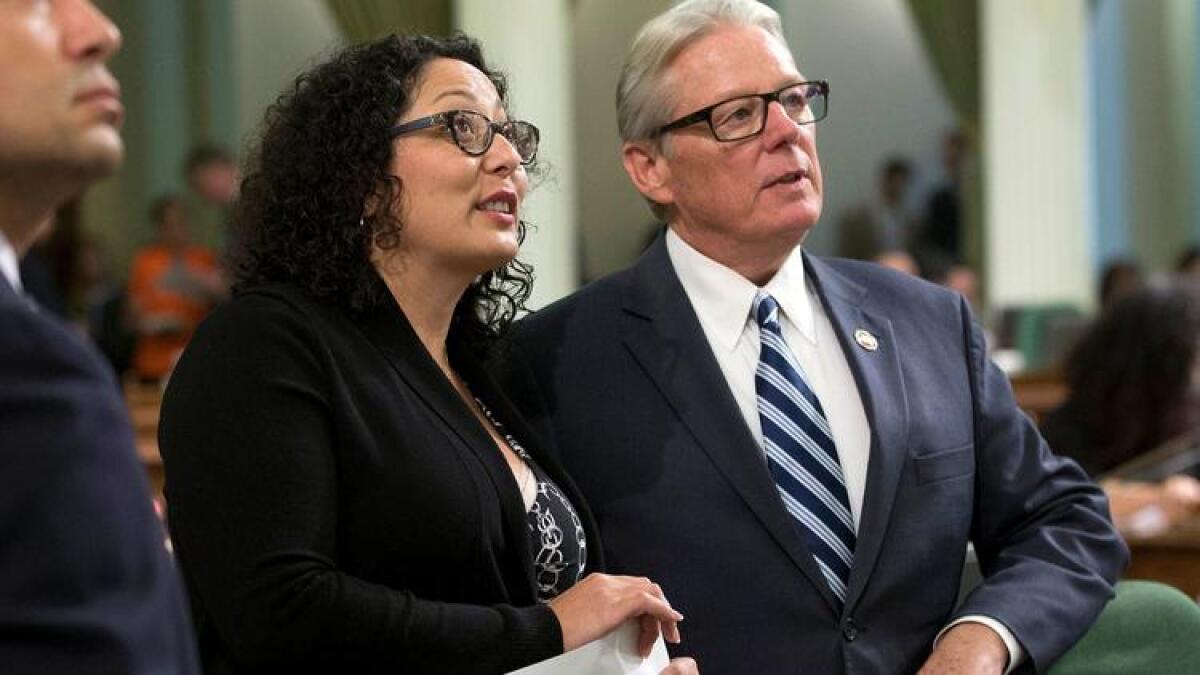
California’s fight against climate change would be overhauled under legislation advanced by an Assembly committee on Monday.
The legislation, a revised version of a measure introduced earlier this year, would link the state’s efforts against greenhouse gases, which contribute to global warming, and other pollutants, which cause public health problems such as asthma.
Facilities such as oil refineries would face tighter restrictions, and the cap-and-trade program — which requires companies to buy permits to emit greenhouse gases — would become less flexible.
The goal of the legislation, Assembly Bill 378, is to broaden the benefits of California’s internationally recognized initiatives on climate change. But it will face resistance from a variety of sources, most notably industry groups that oppose stricter regulations.
Lawmakers are debating the future of the cap-and-trade program because there’s uncertainty over whether it can keep operating after 2020. Gov. Jerry Brown wants lawmakers to extend the program with a two-thirds vote, the higher threshold required for tax measures, to insulate it from legal challenges.
“We’re taking care of the global community,” said Assemblywoman Cristina Garcia (D-Bell Gardens), who co-wrote the measure. “And we’re also taking care of the disadvantaged communities in our backyards.”
At this point, the legislation appears to be the focal point for conversations about about cap and trade.
A provision to extend the program has been trimmed out of a second measure on the issue, Assembly Bill 151. That bill addresses offsets, which are green projects that can be funded by companies to comply with emissions regulations, by encouraging more them to be developed inside the state.
“This is a work in progress,” said Assemblywoman Autumn Burke (D-Marina del Rey), one of the co-authors.
This year’s climate legislation is on a collision course with industry groups that also support cap and trade but envision the program differently. They want a tighter cap on the price of emission permits and as much flexibility as possible to keep their costs down.
“Increasing reliance on direct emission reduction measures over less costly methods is the wrong approach,” wrote a coalition of groups including the Western States Petroleum Assn., the California Manufacturers & Technology Assn. and the California League of Food Processors.
Rivalry in the air as Newsom and Villaraigosa march with Armenians in Los Angeles
An Armenian march across Los Angeles on Monday served as a stage for the budding rivalry between Antonio Villaraigosa and Gavin Newsom as the two Democrats vied for the loyalty of a key constituency in next year’s race for governor.
“This isn’t the first time I’ve been here,” Villaraigosa, the former Los Angeles mayor, said at the march’s launching grounds in Pan Pacific Park. “For some, it may be.”
“Some” was an apparent reference to Newsom, the former San Francisco mayor, who was standing just a few steps away.
It was indeed the first time Newsom had joined the Los Angeles march. But Newsom said he’d participated in many San Francisco protests calling on Turkey to acknowledge its 1915 genocide of Armenians. Turkey disputes that a genocide took place.
Both Villaraigosa and Newsom, rivals in the June 2018 primary to succeed Gov. Jerry Brown, denounced Republican and Democratic presidents alike for declining to pressure Turkey to accept responsibility for the mass killing of Armenians.
“This was the genocide that started off the most violent genocidal century in humankind’s history,” Villaraigosa said.
After a quick hello before the event, he and Newsom ignored each other as they walked in the front row of the march toward the Turkish consulate. At a rally afterward, Newsom called the Turks’ killing of Armenians an “unconscionable act of inhumanity.”
Assembly gives final approval to $1 billion in side deals made before vote on gas-tax increase

The state Assembly voted to give final approval Monday to nearly $1 billion for transportation projects in the districts of five lawmakers who voted two weeks ago in favor of a gas-tax increase after previously being undecided.
Assemblyman Matthew Harper of Huntington Beach led Republicans in opposing the legislation, which he dubbed “earmarks based on political influence and backroom deals.”
GOP lawmakers said the normal process calls for individual transportation projects to go through the California Transportation Commission, but Assemblyman Adam Gray (D-Merced) said the Assembly should make the decision, rather than leave it to “unelected bureaucrats.”
Senate Bill 132 provides $500 million for projects helping the districts of state Sen. Anthony Cannella (R-Ceres) and Gray, both of whom held out support for the bill until the day before the vote. The measure includes $400 million in transportation funds for the extension of the Altamont Corridor Express, a commuter rail line between the Bay Area and Central Valley, and $100 million for a parkway project at the UC Merced campus.
The measure approved Monday also provides $427 million for transportation projects in Riverside County, where Sen. Richard Roth (D-Riverside) and Assemblywoman Sabrina Cervantes (D-Corona) held off supporting the gas tax until the day of the vote. Other money goes to providing clean air technology for trucks in areas that include the district of Sen. Connie Leyva (D-Chino).
Assemblyman Jim Patterson (R-Fresno) questioned the legality of the bill, which he said “rewards” lawmakers for their votes and undermines public trust. When Assemblyman James Gallagher (R-Yucca Valley) called Senate Bill 132 “graft,” Assemblyman Rob Bonta (D-Oakland) objected, saying Gallagher was “impugning the integrity of some of the colleagues on this floor.”
However, Assemblyman Phil Ting (D-San Francisco) said SB 132 pays for “key transportation projects that are important in our state to stop the gridlock.”
The bill was one of three measures asked for by lawmakers who ended up voting to approve the gas tax bill. The Assembly also approved a proposal by Gray that exempts architecture and engineering firms from having to pay the defense fees for clients who are sued.
Another bill scheduled for action would provide $17 million to a handful of young cities in Riverside County that lost state funds when they incorporated.
NRA announces legal challenge to California’s expanded assault weapon ban and other new gun laws

The state affiliate of the National Rifle Assn. on Monday filed the first of a series of planned lawsuits against a package of gun control bills approved in California last year, including one challenging the state’s newly expanded assault weapons ban.
Last year, Gov. Jerry Brown signed into law a prohibition on the sale of semiautomatic rifles equipped with bullet-buttons that allow for the quick removal and replacement of ammunition magazines.
The first lawsuit will be filed late Monday in federal court in Santa Ana by the California Rifle and Pistol Assn., the state affiliate of the NRA , and asks the courts to declare the expanded assault weapon law unconstitutional.
“It criminalizes possession of firearms which are commonly possessed for lawful purposes by law-abiding citizens for self- defense or shooting sports,” said Chuck Michel, a Long Beach attorney for the gun rights groups.
The legislation, and other bills including a ban on large-capacity ammunition magazines, were approved by Gov. Jerry Brown and the Legislature in response to a 2015 terrorist shooting in San Bernardino in which weapons including AR-15 rifles were used to kill 14 people attending a holiday party at the Inland Regional Center.
But the new law “will do nothing to stop terrorists or violent criminals, and infringes on the right to keep and bear arms under the Second Amendment,” the groups argued in a statement Monday.
Senate President Pro Tem Kevin de León (D-Los Angeles) led the effort to get the gun bills passed and predicted Monday they would withstand any legal challenge.
“Background checks and other guns laws California has enacted have saved lives and are key in making our mortality rate one of the lowest in the nation,” de León said in a statement. “I am confident that the courts will reject the NRA’s arguments, just as our voters did in November, and uphold California’s right to implement common-sense policies to protect its people. ”
Michel said the NRA plans five lawsuits challenging new gun laws in California, including one next week that will seek to invalidate a ban on the possession of ammunition magazines capable of holding more than 10 bullets.
The groups waited to file the lawsuits until Republican President Trump began appointing judges to the federal bench, including Justice Neil Gorsuch, who was confirmed last week for the U.S. Supreme Court.
UPDATED AT 3:55 pm to include comment from Senate leader Kevin de León.
Updated at 5:40 pm to reflect that the lawsuit has been filed.
Newsom, Villaraigosa and Garcetti all appear at L.A.’s Armenian march
Two California gubernatorial candidates and one potential candidate joined the tens of thousands expected to march and rally Monday in Los Angeles to commemorate the 102nd anniversary of the Armenian genocide.
Candidates Lt. Gov. Gavin Newsom and former L.A. Mayor Antonio Villaraigosa marched with fellow Democrat L.A. Mayor Eric Garcetti, who hasn’t ruled out a run for the office.
Here’s everything you need to know about who’s running for California governor and who’s still on the fence.
Tom Steyer talks to Chelsea Handler about Democratic Party losses in 2016: ‘We weren’t big enough’
Tom Steyer, president of environmental advocacy organization NextGen Climate, has spent millions to benefit the Democratic Party in the last few election cycles and some have speculated that he may run for governor of California in 2018.
But when he appeared on Chelsea Handler’s Netflix talk show last week, the blunt host asked him whether he felt he invested wisely, given the Democrats’ losses in 2016: “Do you want your money back, like how do you feel?”
Steyer pointed out success in California, bragging about registering 800,000 people to vote in California. He pointed out that Democrats have super majorities in both houses of the California Legislature.
“We had a great day in California, if you look outside of California and we looked really closely at what happened. What we saw was we weren’t big enough,” he said. “Where we were active the outcome was like California and really good. But we weren’t nearly big enough.”
Rep. Linda Sanchez (D-Whittier) joined Steyer on the talk show, which has become a popular stop for liberal California politicos — Lt. Gov. Gavin Newsom, who is running for governor in 2018, and Los Angeles Mayor Eric Garcetti have both appeared recently.
Sanchez said she doubted that President Trump would voluntarily hand over his tax returns.
“I certainly don’t think its going to happen,” she said, adding that the public should continue to apply pressure for their release.
The group also talked about the wave of activism going on at town halls.
Jimmy Gomez grabs more endorsements from California congressional members in race for L.A. seat
Former Hungary ambassador and Clinton fundraiser announces she’s running for California lieutenant governor
Eleni Kounalakis, a former U.S. ambassador to Hungary and Hillary Clinton fundraiser, on Monday officially announced her bid for lieutenant governor of California.
Kounalakis, a Democrat from San Francisco, was appointed as an ambassador by President Obama. In her campaign announcement she emphasized her work with Clinton when the former presidential candidate served as secretary of State.
“As a lifelong Democrat, I will stand up for a woman’s right to choose and for equal rights for all Californians,” Kounalakis said in video statement released on Twitter and Facebook. “As a businesswoman and job creator, I know our economy thrives when we create good paying jobs and affordable healthcare for all.”
Kounalakis previously served as president of AKT Development, founded by her father, Angelo Tsakopoulos, a prominent Sacramento developer and a major Democratic donor.
Kounalakis joins a 2018 race that includes at least one formidable Democrat, West Covina state Sen. Ed Hernandez. Hernandez has collected more than 100 endorsements from prominent California Democrats.
Los Angeles physician Asif Mahmood, a Democrat and supporter of a “Medicare for all” national healthcare plan, also has announced he’ll run.
Senate President Kevin de León, too, has filed an intention to run for lieutenant governor and has been busy raising campaign contributions, though it’s unclear whether he’ll actually jump into the race.
Multiple Republicans have declared interest in running for the seat.
Jeff Sessions and Xavier Becerra trade jabs over California’s immigration policy on ABC’s ‘This Week’
U.S. Atty. Gen. Jeff Sessions on Sunday disputed criticism from California Atty. Gen. Xavier Becerra that a federal immigration crackdown is “reckless,” and accused state officials of jeopardizing public safety with so-called sanctuary city policies that restrict cooperation with federal agents.
Taking their disagreement to the national stage, Sessions and Becerra appeared live but in separate interviews on the ABC-TV news show “This Week,” hosted by George Stephanopoulos.
Becerra said on Friday that threats to withhold federal funds from states and cities that limit cooperation with federal immigration authorities are reckless and undermine public safety.
“It’s nothing reckless,” Sessions said when asked about Becerra’s comments. “It’s nothing extreme about saying if someone comes through our country unlawfully and commits a crime, another crime in the country, that they should be deported. That’s what the law says.”
State and local governments are not allowed by federal law to prohibit their law enforcement officers from sharing information with the federal government, Sessions said.
“In other words, if a person commits a crime in Los Angeles or in the case of Kate Steinle, San Francisco, and an individual there is released multiple times and he comes back to San Francisco because it’s a sanctuary city and commits a murder, that’s the kind of situation that that person should have been deported previously and not allowed to return,” Sessions said.
Becerra said Sunday that California is ready to fight any attempt to withhold federal funds.
“Whoever wants to come at us, that’s hostility, we’ll be ready,” Becerra said. “We’re going to continue to abide by federal law and the U.S. Constitution. And we’re hoping the federal government will also abide by the U.S. Constitution, which gives my state the right to decide how to do public safety.”
The state attorney general was skeptical about comments by President Trump in recent days that so-called Dreamers —young immigrants brought to this country illegally by a parent — will not be targeted for immigration enforcement.
“It’s not clear what we can trust, what statement we can believe in, and that causes a great deal of not just anxiety, but confusion — not just for those immigrant families, but for our law enforcement personnel,” Becerra said.
He also denounced the Trump proposal to build a wall at the U.S.-Mexico border as a “medieval solution” to immigration issues, adding that neither U.S. taxpayers nor Mexico want to pay for the proposal.
Tom Steyer is on the fence about running for office, but his March for Science address sounded like a stump speech
Will environmental activist and mega political donor Tom Steyer make a run for governor? Keep waiting for that answer.
Steyer gave a fiery speech in front of a large, cheering crowd at the Los Angeles March for Science Saturday that had all the hallmarks of a stump speech, including talk about rebuilding the state, creating jobs and helping children.
But when The Times asked if he was close to making a decision about a gubernatorial bid, he responded: “I don’t think I have to make a decision yet.”
Steyer added that he and his political advocacy group NextGen Climate, which sponsored the Los Angeles march, will be battling President Trump’s administration as the 2018 midterm elections approach.
He was the nation’s biggest individual donor in the 2014 elections, and in 2016 he was a major force behind seven state ballot measures.
“I am obviously completely committed to fighting these guys,” he said of the Trump administration.
Steyer’s speech was marked by soaring rhetoric about California exceptionalism as he spoke about the state as a global leader.
“California leads into the future,” he said. “When you talk about research and technology and innovation and new industries — that is California. That is who we are and what we do.”
He ended with his fist raised in the air:
“The answer is not going to come out of Washington, D.C. It is going to come out of the Golden State of California. We cannot falter, we cannot flinch and we cannot fail. On we go.”
California Politics Podcast: Lawmakers get an earful at town halls
It may have looked like a break on the calendar, but the spring recess for many in California’s congressional delegation found voters back home in a feisty mood.
This week’s California Politics Podcast takes a closer look at town halls recently held by a number of lawmakers, events that offered some common themes and often a large crowd demanding resistance to President Trump’s agenda.
We also take a look at how April income tax collections are shaping up — a month that’s crucial in crafting a state budget and the potential for political fights over the new spending plan.
I’m joined by Times staff writer Melanie Mason and Marisa Lagos of KQED News.
Sen. Kamala Harris has her first town hall, and the crowd welcomes her home
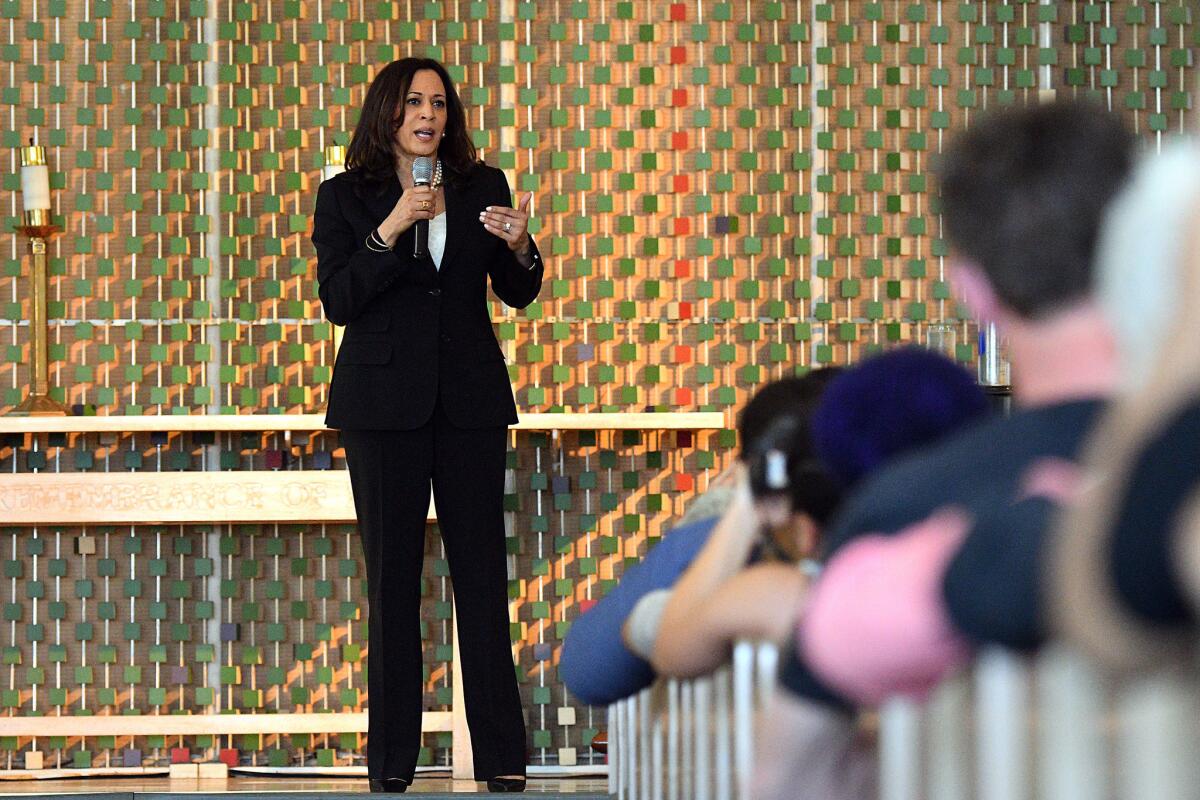
Sen. Kamala Harris’ first town hall as a U.S. senator began with a “welcome home” from the gathered crowd.
“I am so happy to be home, I cannot tell you,” she said.
It set the tone of meeting that lasted more than an hour and was largely devoid of the theatrics that have marked other town halls in recent weeks, including the two held by Sen. Dianne Feinstein (D-Calif.) this week.
The about 800 Californians who attended the midday event at the Holman United Methodist Church in Los Angeles were overwhelmingly polite, booing just once when Harris mentioned the new head of the Environmental Protection Agency, Scott Pruitt. Harris opposed his nomination.
Harris’ progressive positions have made her a liberal favorite, while Feinstein’s more moderate tendencies have been the target of activists who have protested at her home and office over the last few months, urging her to stand firm against President Trump.
Vans full of Service Employees International Union members came to the town hall, and the dozen or so questions from the audience fell along Harris’ known policy positions.
Does she oppose building a wall at the southern border?
“Yes,” she said. “It’s just a stupid use of money.”
Should the U.S. get more involved in the war in Syria?
“I’m absolutely opposed to boots on the ground in Syria,” she said.
Afterward, she stayed for more than a half an hour to take selfies and answer individual questions.
Watch live: Sen. Kamala Harris holds a town hall in Los Angeles
Click on the image to watch the town hall live and follow Sarah D. Wire for more updates.
Kevin de León says Trump law enforcement policy based on ‘principles of white supremacy’
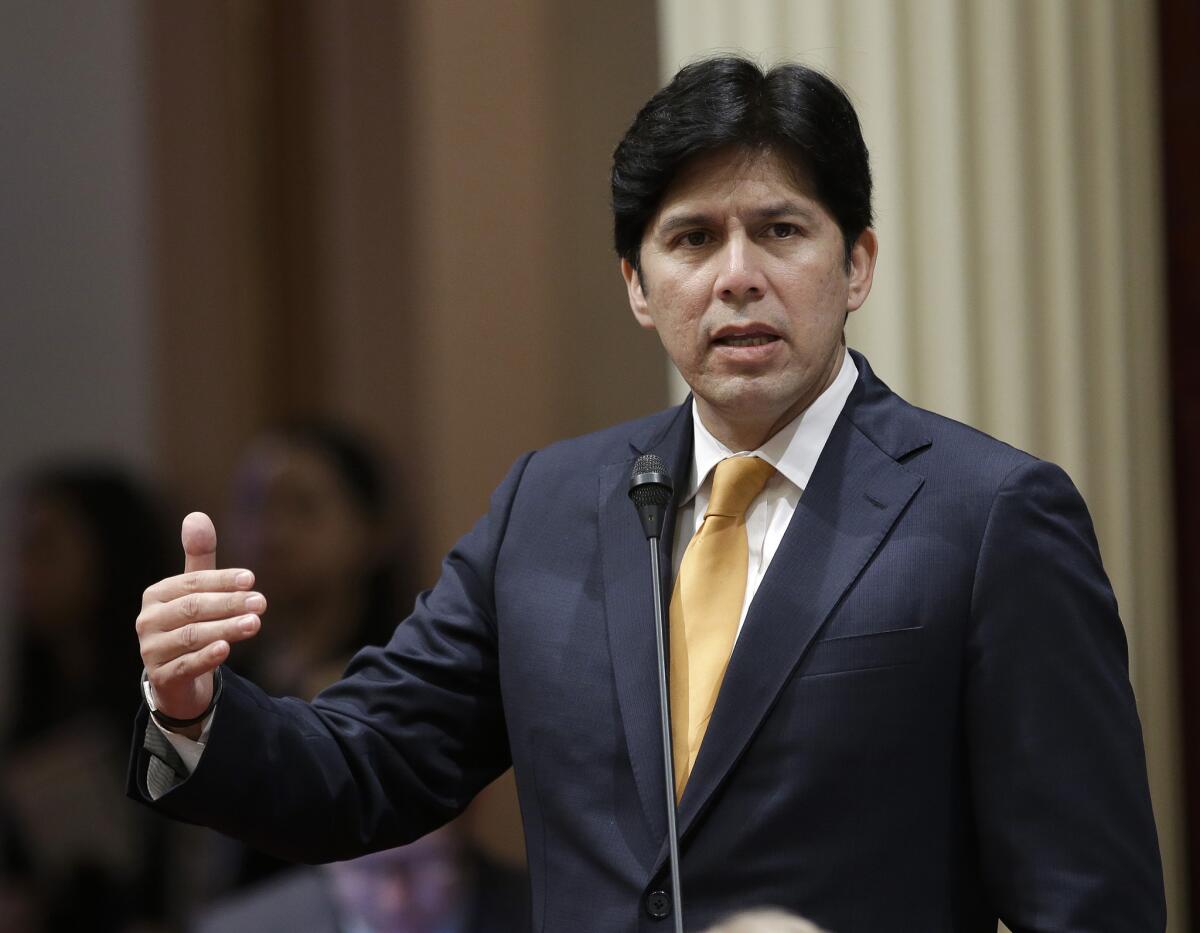
California officials reacted with defiance Friday to a threat by federal officials to withhold some $20 million in criminal justice grants from the state and its counties as part of the dispute over so-called sanctuary city policies.
“It has become abundantly clear that Atty. Gen. [Jeff] Sessions and the Trump administration are basing their law enforcement policies on principles of white supremacy — not American values,” Senate leader Kevin de León (D-Los Angeles) said in a statement. “Their constant and systematic targeting of diverse cities and states goes beyond constitutional norms and will be challenged at every level.”
De León’s statement on “white supremacy” drew an immediate rebuke from Republican Assemblyman James Gallagher of Yuba City.
“That’s a ridiculous statement,” Gallagher said.
“Nobody here is talking about the state becoming an immigration agency or doing ICE’s job for them. It’s about whether you comply with federal law,” Gallagher added.
The U.S. Department of Justice warned in a letter Friday that the grant funds could be jeopardized unless the state can verify in writing that the state and its counties and cities are not restricting the sharing of information with federal immigration authorities regarding the citizenship status of people in prison and jail cells.
The state was given until June 30 to comply with the grant requirement, according to the letter Friday from Alan R. Hanson, acting assistant attorney general for the federal Office of Justice Programs.
“Failure to comply with this condition could result in the withholding of grant funds, suspension or termination of the grant, ineligibility for future [OJP] grants or subgrants, or other action, as appropriate,” Hanson wrote.
De León on Friday released a letter to Sessions written by a private attorney hired by the Legislature who said the state and its cities are in compliance with the law.
“It is our understanding that these laws do not violate federal law and would not be subject to an enforcement action by the federal government,” wrote attorney Daniel Shallman, whose firm, Covington & Burling, has been hired to assist the state in communicating with the Trump administration. The legal strategy is being guided by former U.S. Atty. Gen. Eric H. Holder Jr.
Shallman asked that the federal officials confirm that it will not take action against the state.
“If the Trump administration resorts to attempting to enforce its Order against California, the Legislature will use all available means to defend the rights, values and safety of Californians,” Shallman wrote April 6.
California received nearly $20 million in grants from the federal agency in the 2016 fiscal year, $18.2 million of which was distributed to criminal justice programs in 32 counties.
The money is distributed to counties through the California Board of State and Community Corrections, which received the warning letter from the U.S. Department of Justice.
The largest county grant was $3.59 million provided to Los Angeles County for a program that coordinates enforcement, prosecution and treatment for people and gangs “that spread social malaise through illicit drug abuse and narcotics-related crime and gang culture,” according to a board report.
L.A. County Sheriff Jim McDonnell has opposed De León’s Senate Bill 54, “sanctuary state” legislation that would limit cooperation with immigration officials. San Francisco County officials have said they will limit their cooperation.
San Francisco County received a $3-million federal grant for a program aimed at reducing recidivism for young people to block “the school-to-prison pipeline,” the state report said.
Another $1 million went to San Bernardino County to cover costs involving the 2015 terrorist shooting that killed 14 people, and $396,310 went to a state prison program to reduce rapes of inmates.
Rep. Ted Lieu’s Trump trolling continues, this time from a town hall with a Kathy Griffin assist
Rep. Ted Lieu hasn’t stopped messing with President Trump on Twitter.
This week’s episode revolved around Lieu’s Thursday town hall and featured actress Kathy Griffin: “Full capacity, no Russian agents.”
Lieu has been aggressively poking Trump on Twitter since he was inaugurated, and as he told Times columnist Steve Lopez last month:
“Michelle Obama had that beautiful line, ‘When they go low, we go high,’” said Lieu. “I thought about it a lot. But I also thought, ‘We lost the election.’ My view now is that when they go low, we fight back.”
L.A.’s congressional candidates spent a lot of cash in the final days of the primary campaign
Nearly half of the money spent by all congressional candidates in the primary election to replace Xavier Becerra was unleashed in the final weeks of the campaign.
From March 16 to March 31, the 24 candidates in the 34th Congressional District race spent $1,285,800, or 44% of the total spent overall in the race so far. The final three days before the April 4 election are not covered in the most recent campaign finance reports.
Robert Lee Ahn and Assemblyman Jimmy Gomez, two Democrats who beat the crowded field to advance to a June runoff, spent a large share of that.
Ahn dropped about $405,000 in the last two weeks of March alone, spending about three quarters of it on the mailers and potholders that filled voters’ mailboxes throughout the campaign.
Gomez spent much less over the same period: $175,500, and $115,100 of that went to printing and mailers.
In the final weeks of the campaign, Ahn raked in $188,100 in donations compared with Gomez’s haul of $89,500.
Candidates in L.A congressional primary spent an average of $68 per vote
In the fast and furious primary campaign in Los Angeles’ 34th Congressional District, the crowded field of 24 candidates spent about $2.9 million trying to sway voters, according to campaign financial reports.
In the end, 42,914 voters cast ballots in the race, bringing the average amount spent per vote to $67.97.
------------
FOR THE RECORD
8:42 a.m.: The headline in an earlier version of this post stated that candidates in the 34th Congressional District spent an average of $86 per vote. The figure is $68.
------------
Some candidates, such as Democrat Adrienne Edwards, reported spending no money at all. She received 182 votes.
On the high end of the spectrum were former Los Angeles Times employee Alejandra Campoverdi, who spent $277.93 per vote, and Ricardo De La Fuente, who dropped $230.92 for each of his 331 voters.
Aside from candidates who didn’t spend anything, candidates who reported spending the least were Kenneth Mejia at $13.11 and Steven Mac at $14.15 per vote.
Robert Lee Ahn and Jimmy Gomez, who advanced to the June runoff, spent $81.50 and $41.61 per vote, respectively.
No negotiations yet between California and Trump administration on vehicle rules
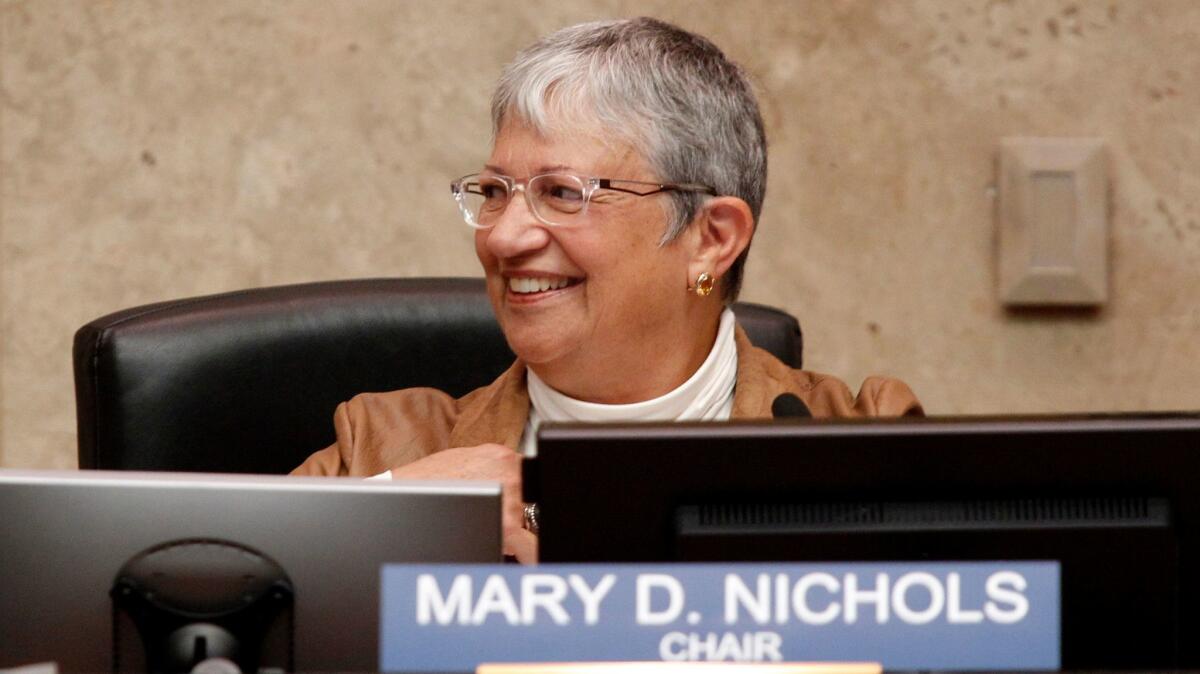
Earlier this month, a White House official floated the possibility of negotiations with California to resolve a brewing dispute over vehicle emission rules. The federal government has started the process of rolling them back, while state regulators here are pushing forward with tough pollution-reduction requirements, raising the possibility that automakers would need to meet different standards in different places.
However, California hasn’t heard from the Trump administration about beginning talks.
“We haven’t been asked,” Mary Nichols, chair of the Air Resources Board, told reporters during a conference on climate change in San Francisco.
California has the unique ability to enforce vehicle rules that are tougher than federal standards, and Nichols said the state’s leaders would be careful about any negotiations.
“I would expect our governor to be no less rigorous in evaluating any possibility of a change to the federal program,” she said.
State Senate leader Kevin de León (D-Los Angeles) has expressed “deep concern” about any negotiations.
“I always encourage dialogue, and we should keep lines of communication with the federal government open, but we cannot afford to compromise our air standards,” he wrote in a letter to Nichols.
Board of Equalization director says California’s imperiled tax collection agency is in ‘crisis mode’
The executive director of the state Board of Equalization told legislators Thursday that some board members have acted to reassign staff and resources without following proper approval procedures involving the board’s executive staff.
“It has been a pervasive problem,” David Gau said during a hearing of a state Senate budget subcommittee.
He said the agency is in “a crisis mode” since a state audit was released that found tax officials unable to explain decisions that allocated money to the wrong funds and transferred staff to unauthorized jobs.
Gau went on to say his job has been threatened in the past, but he has received reassurances from the board more recently that he can stay in his post. Still, he said major changes are needed at the tax collection agency.
“My belief as the executive director … is there are structural reforms that need to take place at the Board of Equalization,” Gau said, adding the elected board members should be further restricted from getting involved in the daily operations of the agency.
Democratic Sens. Richard Roth of Riverside and Steve Glazer of Orinda voiced concern about the lack of management controls.
“I do see breakdowns at all levels here,” Glazer said.
Roth and the state Legislative Analyst’s Office said one option for lawmakers to consider would be to remove most of the board’s executive functions and limit it to handling taxpayer appeals.
“That to me would see a clean division of responsibility,” Roth said.
Roth also suggested legislators might consider creating an inspector general position so employees could have a place to report misconduct without feeling their job is threatened.
Feinstein is waiting for family health issues to be resolved before announcing her 2018 plans
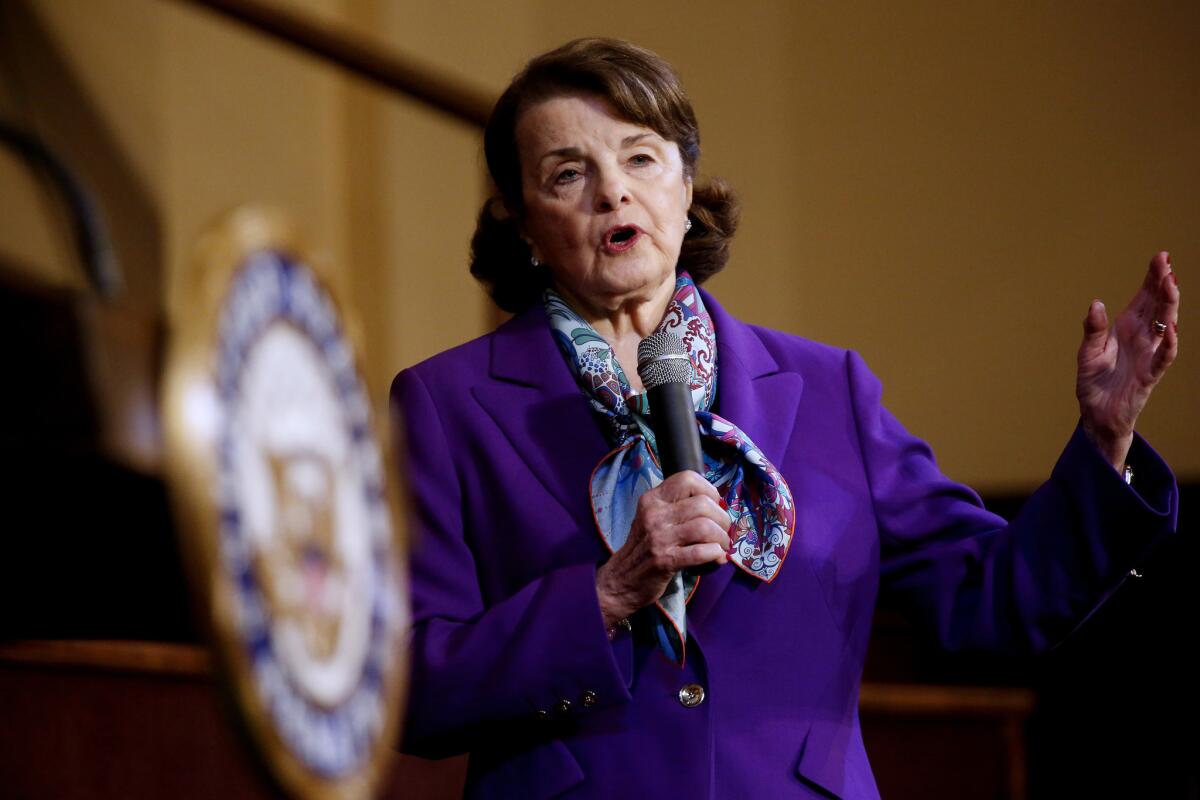
Sen. Dianne Feinstein said Thursday she is waiting for some family health issues to be resolved before she announces whether she’ll run for another term in 2018.
“The time is coming, be assured. I’ve had reasons for waiting, and so once those problems are solved, I’ll let you know,” Feinstein said after a town hall in Los Angeles.
Feinstein wouldn’t give more details about the family issue, but she skipped the Democratic National Convention in Philadelphia last summer after her husband, Richard Blum, was diagnosed with lung cancer.
She herself was fitted with a pacemaker in January, raising additional questions about whether she plans to run.
At 83, Feinstein is the oldest member of the U.S. Senate, with 24 years under her belt, and the California political establishment has been in wait-and-see mode over whether she will seek another six-year term. A number of prominent Democrats would be eager to replace her if she bowed out.
In January, she gave a pretty strong hint that she’d like to run again, and she’s been raising money across the state.
At the L.A. town hall Feinstein hosted on Thursday, a small group of protesters waved signs urging the senator to either support a single-payer healthcare plan or retire.
Sen. Dianne Feinstein gets an earful at Los Angeles town hall, but sticks to her centrist guns
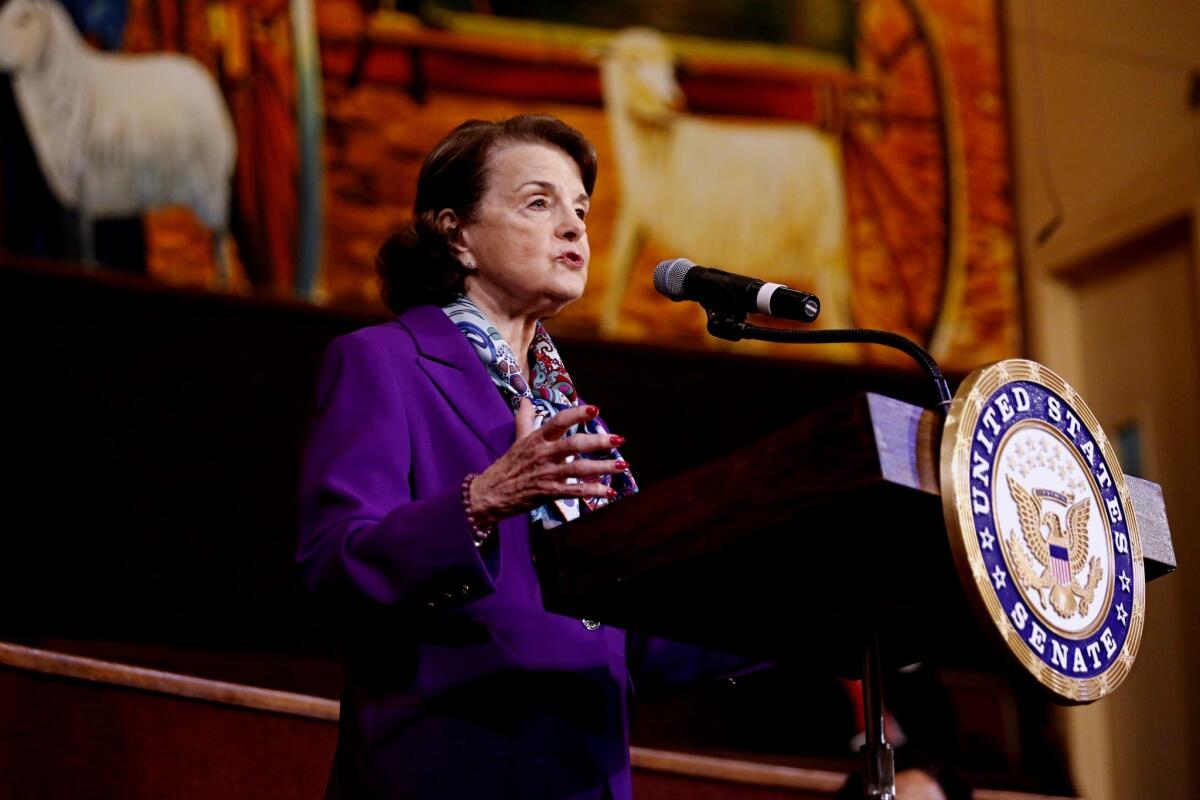
California’s Sen. Dianne Feinstein faced a largely friendly Los Angeles crowd at town hall Thursday, though the crowd came with a resounding, and sometimes loud, question: How are you resisting President Trump’s agenda?
The 1,000 ticket holders at South Los Angeles’ First AME Church quizzed the Democrat on whether the U.S. should be more heavily involved in Syria (“I think the time has come” ) and whether she’d support expanding Medicare everyone is eligible (“Not at this stage”).
It was Feinstein’s second town hall of the week and her second town hall ever. She faced an at times contentious crowd in San Francisco on Monday.
Tessie Borden, who helps lead the progressive protest group Indivisible Los Angeles said she was grateful Feinstein held the town hall, but felt like they should not have had to pressure her so much to hold it in the first place. (Protesters outside Feinstein’s offices and home have been encouraging her to hold a town hall since Trump’s inauguration.)
Borden said although she thinks there is a time and place for a moderate Democrat willing to work with the other party, her group wants Feinstein to take bolder, more progressive positions.
“We know we’re not always going to win. We’re proud for her to take losing positions if they are the right positions,” Borden said.
But Feinstein told the anti-Trump crowd she isn’t going to pursue charges against Atty. Gen. Jeff Sessions for misleading the Senate Judiciary Committee about his contact with Russia’s ambassador during the campaign. As the ranking Democrat on the committee, she opposed Sessions’ nomination and urged him to recuse himself from the Russia investigation.
“The elements are not there to prove perjury, that is what the lawyers tell us,” she said.
Feinstein told reporters afterward that she understands why many of her constituents want her to be defiant against Trump and Republicans. She’s voted against many of the Republican initiatives that worry progressives, but says she also has to work with the other side — a position she’s long held and one that’s cemented her reputation as a centrist dealmaker.
She told the crowd that unless Democrats have the votes they need in Congress to block Trump’s policies, they should at least work with Republicans for a middle ground on things they might be able to agree on, such as infrastructure.
“Resistance to me means doing the best I can to serve people in the way we do,” Feinstein said. “I’m giving opposition in my votes, in my comments, in my speeches; now I don’t rant and rail because I’ve got other ways of being constructive, and I think the majority of people want me to be constructive.”
Feinstein, who has served in the Senate since the early 1990s, has not said directly whether she will seek another six-year term, but has strongly hinted that she plans to run again.
Texas Sen. Ted Cruz raises money and woos supporters in Orange County
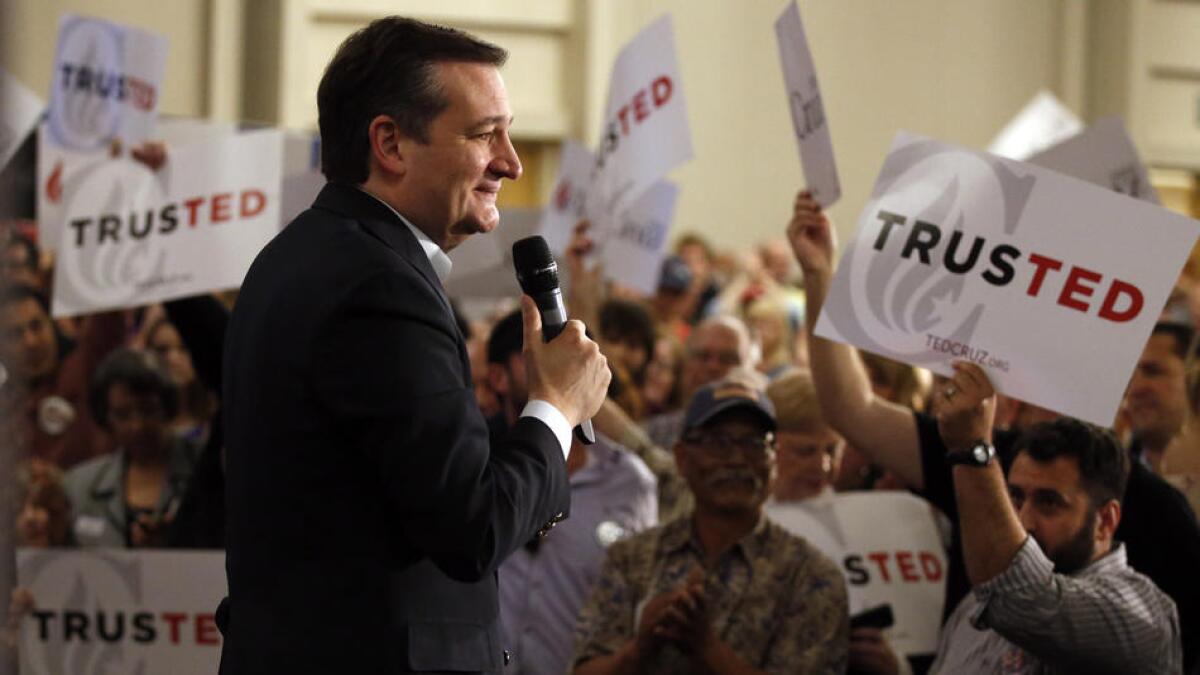
Texas Sen. Ted Cruz, who came in second in the race for the GOP presidential nomination last year, is raising money and courting prominent Republicans in Orange County on Thursday as he prepares for a reelection campaign in 2018.
A fundraiser for Cruz will be hosted Thursday evening by Palmer Luckey, a Long Beach native who became one of the nation’s wealthiest young entrepreneurs by creating a virtual-reality headset. Attendees are being asked to contribute up to $2,700 to Cruz’s reelection bid to attend a reception at an undisclosed location.
Earlier in the day, Cruz mingled with a few dozen prominent Republicans and supporters of his unsuccessful 2016 presidential bid. The event took place at the Newport Beach law firm of Michael McClellan, Cruz’s Orange County finance chairman and one of his top dozen bundlers in the nation.
Other attendees included Republican National Committeeman Shawn Steel; former state GOP chairman Michael Schroeder, who served as a California co-chairman for Cruz’s presidential campaign; and conservative blogger Jon Fleischman.
Fleischman described Cruz as “sharp and focused” as he discussed possible options to repealing and replacing Obamacare after the failure of President Trump’s first attempt.
“While everyone ... is relieved Hillary lost, no doubt everyone wishes Cruz was in the White House right now,” Fleischman said.
The campaign between Trump and Cruz was brutally ugly. Trump labeled Cruz “Lyin’ Ted,” insulted his wife’s looks, and falsely insinuated that his father was involved in the assassination of President Kennedy. Cruz responded by calling Trump “utterly amoral,” a “pathological liar,” “a serial philanderer” and a “narcissist at a level I don’t think this country’s ever seen.”
The tension came to a head at the Republican National Convention. Cruz, speaking in prime time, pointedly refused to endorse Trump. In response, Trump threatened to launch a super PAC to take down the Texas senator when he ran for reelection.
Cruz eventually endorsed Trump and the two men have appeared to get along since.
Cruz is facing a challenge from Democratic Rep. Beto O’Rourke of El Paso. A Texas Lyceum poll released Wednesday showed them tied, with a large number of undecided voters. But political observers were skeptical — no Democrat has won statewide office in Texas in more than two decades.
New site shows which California elected officials ask special interests to donate to their favored charities
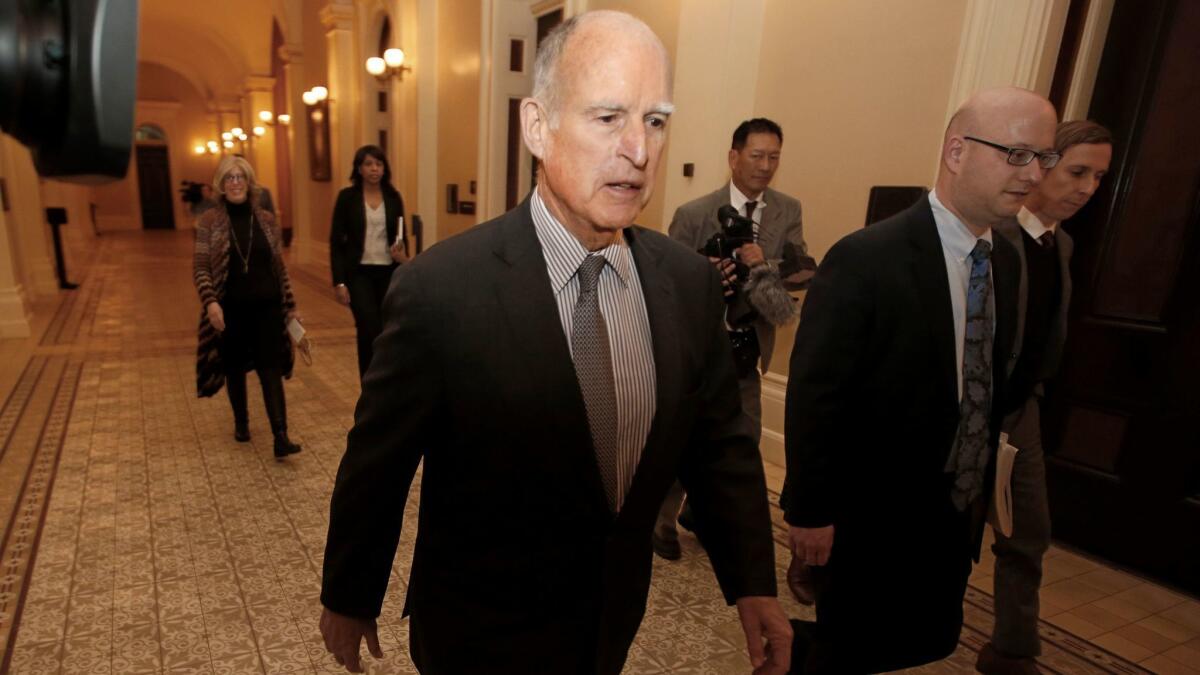
Elected state officials in California ask special interests to donate millions of dollars annually to their favorite charities. Now residents can get a clearer picture of who is asking, who is giving and who is getting the money.
The state Fair Political Practices Commission launched a new database search site on its website Thursday that makes it easier to see who the players are and compare them to determine who is raising the most money.
“This is yet another tool to provide the public information about their elected officials,” Commission Chairwoman Jodi Remke said. “It shows who is asking for money and from whom, how much, and where it’s going. An informed public is vital to maintain government accountability.”
The database shows that state elected officials asked businesses, unions and other special interests to donate more than $5 million last year to dozens of their favored charities.
Gov. Jerry Brown raised the most — $2.8 million — with money going to the Oakland Military Institute charter school, the Oakland School for the Arts and the State Protocol Foundation, which pays for some of his travel and events.
Contributors to the charities selected by Brown include United Airlines, the Bicycle Hotel Casino, the Gardena Casino, Walmart and Comcast.
For legislators, charities that received much of the contributions include those formed by caucuses for Latino, African American and female lawmakers.
“It’s very user-friendly,” Commissioner Eric Casher said of the database, adding it provides “lots of useful information.”
And now for something different: Freshman Rep. Nanette Barragán faces a gentle crowd at San Pedro town hall
Congressional town halls in the early days of the Trump administration have been greeted with protests, counter-protests, boos and jeering.
Not so for freshman Rep. Nanette Barragán (D-San Pedro), who represents a district stretching from Compton to the Port of Los Angeles.
“This is good,” she said about halfway through her hour-and-a-half-long town hall Wednesday in San Pedro. “I haven’t had any tomatoes thrown at me.”
It helps that 61.5% of registered voters in her district are Democrats, but other members in safe Democratic districts, including Rep. Grace Napolitano (D-Norwalk), have faced protests from Trump’s supporters.
Things were calm for Barragán, who won the seat last year with 52.2% of the vote after a heated race to replace Democratic Rep. Janice Hahn.
She introduced herself, spoke about a recent tour she and the other Democratic members of the House Homeland Security Committee took of the port and introduced her staffers one by one. She fielded questions ranging from how she’d protect benefits for retired federal employees to whether she supports a so-called “Medicare for all” plan (she does).
At one point, a woman in the audience from Wilmington asked Barragán for help getting access to a city and county fund intended to help immigrants in the country without legal status.
Barragán answered the question in Spanish, referring the woman to a nearby caseworker.
Bill Roberson, who described himself as a semi-retired business owner, sat in the back row of the audience and nodded with approval.
“I really like this gal. She is really terrific,” he said. “To have her speak in Spanish with her constituent right in front of me, that’s great.”
Watch live: Dianne Feinstein holds a town hall in Los Angeles
‘Stopping carbon will be like stopping a heroin addiction’: Gov. Brown urges stronger action on climate change
If anyone was hoping for a feel-good message from Gov. Jerry Brown at this week’s Navigating the American Carbon World conference on climate change, they didn’t get one.
“Don’t relax,” he told the audience of environmental advocates, business representatives and government officials on Thursday. “Don’t feel good about yourself.”
Brown’s speech was a trademark blend of religious references, political barbs and warnings about the future if global warming isn’t addressed.
“Most people don’t like to think about catastrophe,” he said. “I like to think about catastrophe.”
Brown is planning a trip to China this year to talk about climate change. The election of President Trump has raised the stakes, he said, requiring resistance to efforts to roll back environmental regulations.
“You can’t just go with the flow. We’ve got to go against the flow,” Brown said. “The flow is now leading us to catastrophe,”
The challenge, Brown said, was finding Republicans who want to deal with climate change. He said one member of the party told him, “Don’t ask me to use the words ‘global warming’ or ‘climate change.’ I can’t use those words.
“It’s like going to the Vatican and saying, ‘I want to talk about Planned Parenthood,’” the governor added.
Fighting climate change requires confronting the role of carbon in everyone’s daily lives, Brown said.
“Stopping carbon will be like stopping a heroin addiction,” he said. “We are addicted to carbon. We are repeatedly using it, and we get a tremendous high, a whole way of life.”
The conference was hosted by the Climate Action Reserve, a nonprofit that certifies projects for reducing emissions. Some of those projects are a key part of California’s cap-and-trade program, which requires companies to buy permits to release greenhouse gases into the atmosphere.
Brown is pushing lawmakers to extend the program.
“I’m going to be working on that very hard in the next several weeks,” he said.
Earlier this year, Brown asked lawmakers to extend the program as part of the budget process, which faces a June 15 deadline. However, the debate could potentially continue until later this summer or next year.
California Senate confirms former Sen. Isadore Hall for farm labor board over GOP objections
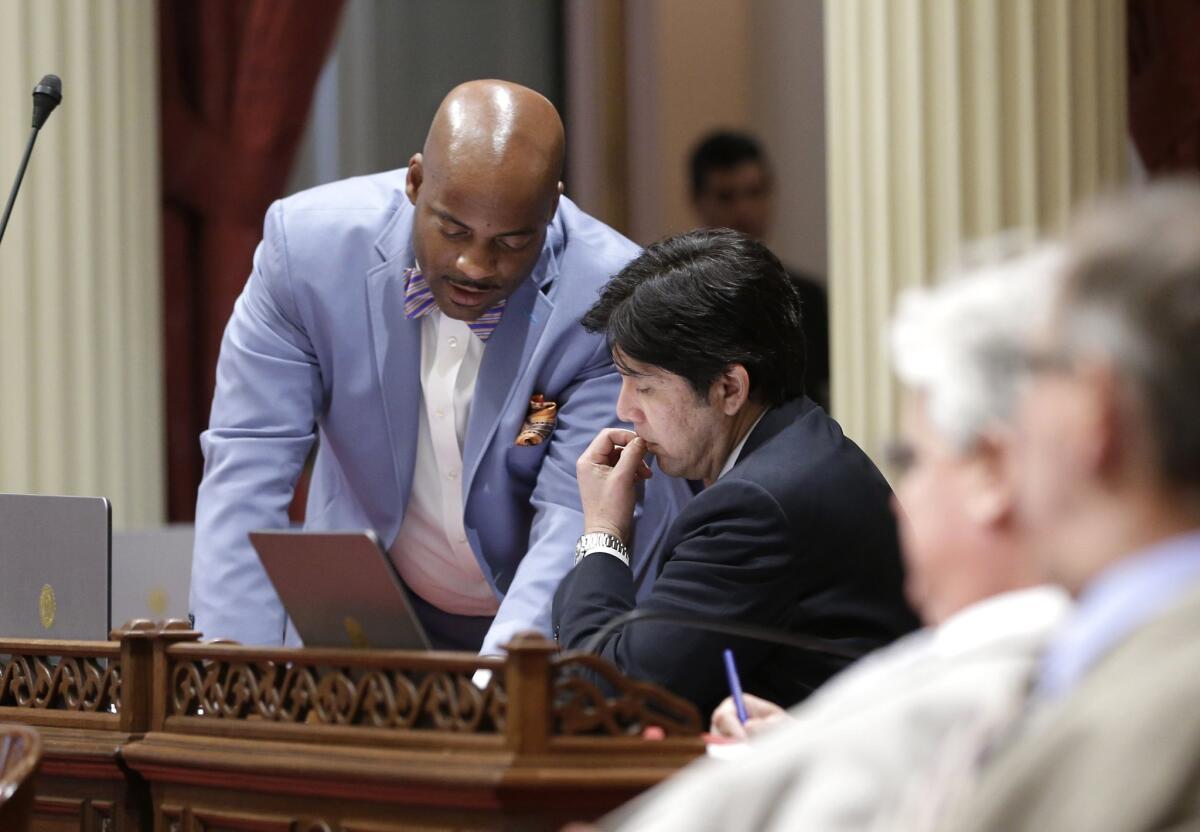
The state Senate on Thursday confirmed former state Sen. Isadore Hall III for the Agricultural Labor Relations Board despite opposition from Republicans.
Gov. Jerry Brown appointed Hall, a 45-year-old Democrat from Compton, to the position in January, drawing objections from agricultural leaders who noted he had supported the United Farm Workers in labor disputes with growers.
Republicans also want an investigation into allegations that Hall threatened farming leaders who opposed his selection.
Hall’s appointment to the job, which pays $142,095 a year, was approved by a 25-13 party-line vote.
Hall lost a bid for a congressional seat in last November’s election to fellow Democrat Nanette Barragán.
Senate President Pro Tem Kevin De León (D-Los Angeles) described Hall as “intelligent as well as thoughtful and fair-minded.”
De León defended his decision not to launch a probe of Hall’s alleged threats against farming leaders, which were said to be made at a hotel bar. “It’s not our practice to review or investigate bar room conversations,” De Leon said.
Sen. Andy Vidak (R-Fresno) said he was disappointed de León decided against an investigation, calling Hall “ill-suited to a judicial position.”
Sen. John Moorlach (R-Costa Mesa) agreed that Hall is not qualified for the job and said the appointment meets the definition of “cronyism.”
However, Democratic Sen. Ben Hueso of San Diego said Hall has integrity and will be a fair member of the board. He said some attacks against Hall, who is African American, are “racially motivated.”
A TV ad for a marijuana vaporizer has hit the airwaves — with no mention of the drug itself
Six months after California voters legalized the recreational use of marijuana, a television commercial has begun airing in the state that promotes a product aimed at cannabis users, but without ever mentioning the drug itself.
Eureka Vapor markets portable vaporizers for cannabis concentrates that the company produces. But you wouldn’t necessarily know that from the commercial, which shows actors portraying figures including athletes, dancers and members of the military with phrases such as “Discover Love” and “Discover Freedom” displayed. The ad ends with the product’s logo and Web address.
Why the mystery?
Marijuana remains illegal under federal law, and many federally licensed television stations do not accept cannabis advertising, according to Randall Huft, president and creative director of Innovation Agency, which has also done work in the past for AT&T, Hyundai, Toyota, Nestle and Disney.
“We wanted to create a commercial that captures the essence of the brand,” Huft said. “Eureka stands for inclusion, acceptance and love.”
The commercial began airing Friday on KDOC-TV, an Orange County-based independent channel with nearly 1 million viewers per week, and is also scheduled to run on stations in Los Angeles, San Diego and other markets, Huft said.
When KDOC began broadcasting in 1982, it was owned by a group of conservative celebrity investors including Pat Boone and Fess Parker.
John Manzi, the station’s general manager, noted that the Eureka Vapor devices can be used for products other than cannabis.
“We are very careful about taking advertising,” Manzi said. “We didn’t feel it was right to deny advertising to a product that has many uses.”
The vaping device can be used with tobacco products. but it and the cannabis concentrates are primarily aimed at marijuana users and are prominently featured on the company’s website, Huft said.
Will a day ever come when television ads will be able to openly promote cannabis?
“Certainly,” Huft said. “Most things in our lifetime seemed impossible just a short time ago: Equal rights for the LGBT community, gay marriages, Trump becoming president. Anything and everything is possible.”
Gov. Jerry Brown calls accusations of illegal vote trading on transportation deal ‘preposterous’
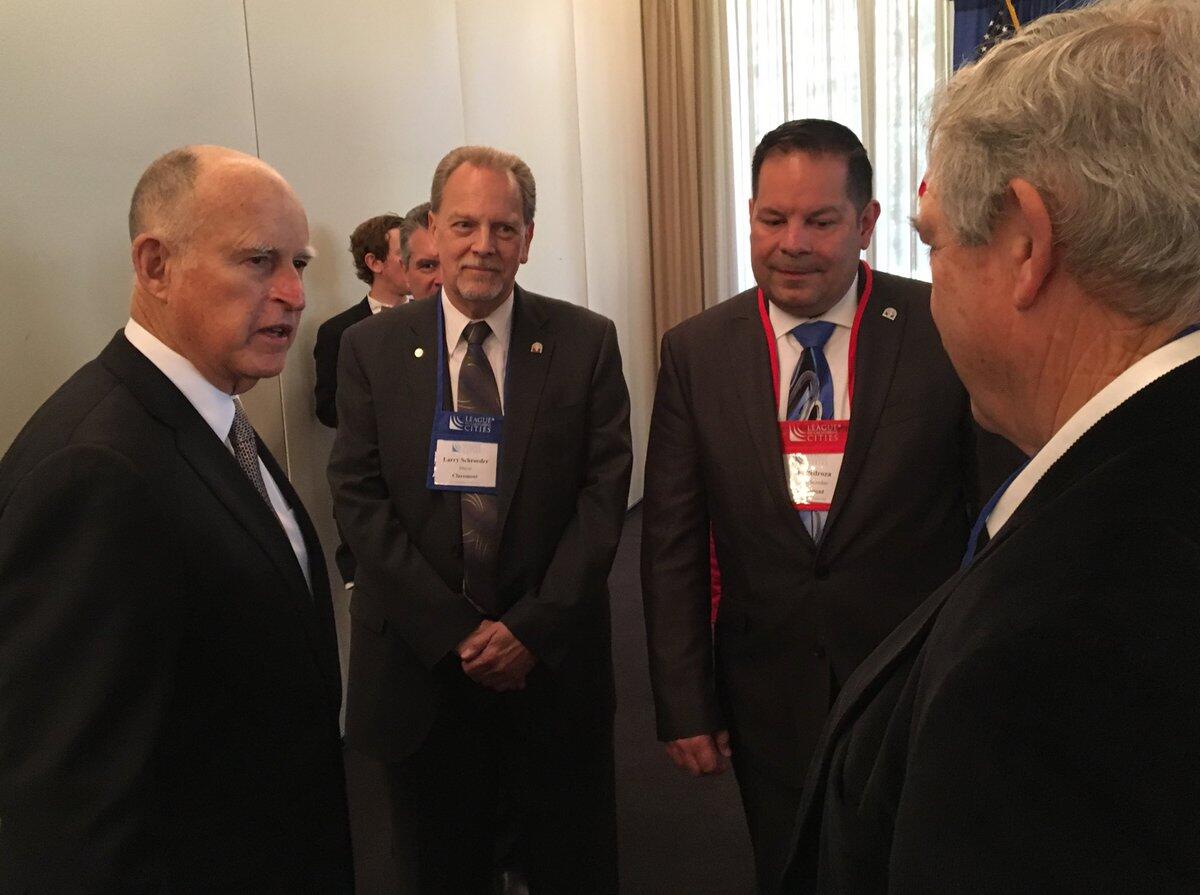
Gov. Jerry Brown dismissed criticism Wednesday that negotiations on this month’s $52-billion transportation plan crossed the line into the illegal trading of votes by lawmakers, instead calling it a part of the process of finding political consensus.
“That is preposterous,” Brown said of the accusations leveled by some Republicans in the Legislature. “When we fashion a bill in the democratic system, we don’t do it by an autocratic dictator behind a closed door. You talk to people.”
The governor and Democratic legislative leaders participated in intense negotiations earlier this month to strike the deal that raises fuel taxes and imposes a new annual vehicle registration fee to repair roads and highways and improve public transit. The proposal, Senate Bill 1, needed a super majority of votes in both the Assembly and Senate to pass.
The last few legislators to sign on to the proposal — including just one Republican — insisted on a series of side deals, the bulk of which earmark almost $1 billion in spending for transportation-related efforts in their communities.
On Tuesday, Assemblywoman Melissa Melendez (R-Lake Elsinore) asked state Atty. Gen. Xavier Becerra to investigate those arrangements.
“This appears to be a standard quid pro quo exchange, which has been made clear by these legislators’ public statements about the evolution of their decision and their rationale for voting for Senate Bill 1,” she wrote in a letter to Becerra.
California’s state Constitution declares it a felony to participate in legislative action influenced by “bribery, promise of reward, intimidation or other dishonest means.”
Brown, who served four years as attorney general until 2010, suggested on Wednesday that personal gain was the proper threshold.
“When somebody says, ‘Here, here’s $10,000, I want your vote,’ you’ve got bribery, it’s illegal,” the governor said. “When someone says, ‘You know, I think this bill would be better if you included these projects, or these ideas or these rules, we listen because that’s democracy.”
DNC Chairman Tom Perez to address California Democrats at state party convention next month
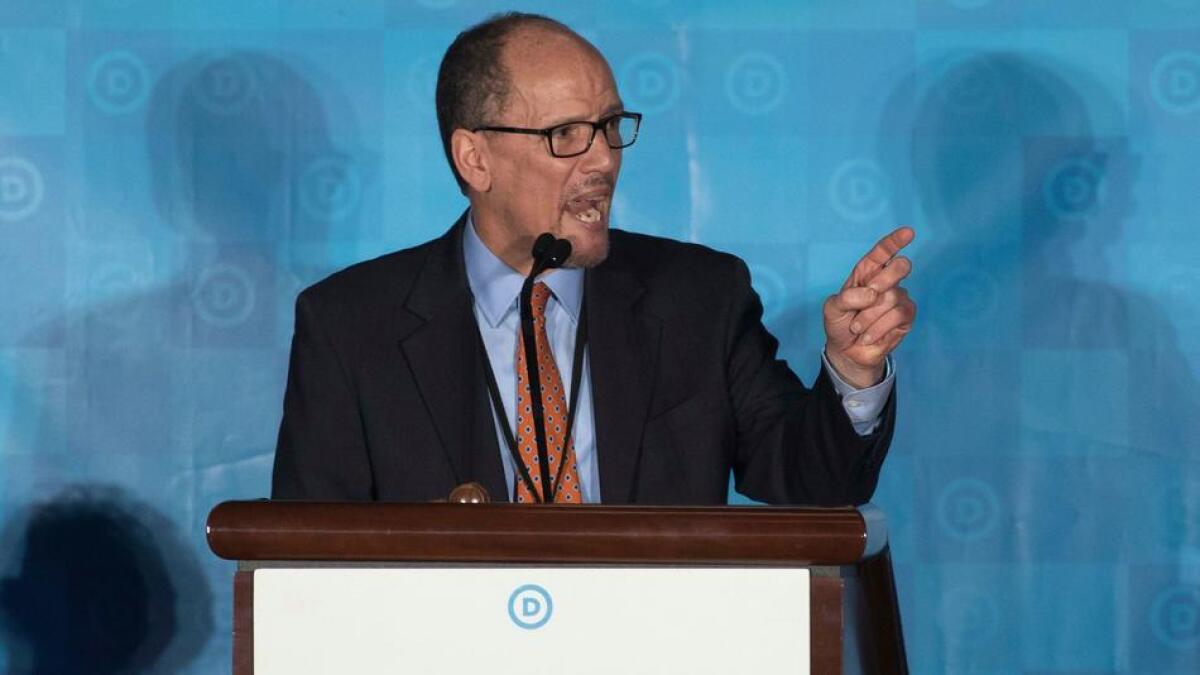
Democratic National Committee leader Tom Perez will address California Democrats at their annual convention in May, the state party announced Wednesday.
Perez, who was elected chairman of the DNC in February, previously served as secretary of Labor under President Obama.
The state party convention takes place May 19 to 21 in Sacramento. The state party did not say which day Perez will deliver his keynote address; it previously announced Rep. Adam Schiff (D-Burbank) would speak on May 20.
Thousands of delegates and guests attend the annual gathering, which includes speeches from elected officials, strategy sessions and parties. This year’s agenda includes electing a new state party chairman to replace John Burton, who is retiring after serving in the role of nearly a decade.
Delegates can also expect to be courted by the candidates considering gubernatorial runs in 2018, when Gov. Jerry Brown will leave office because of term limits.
How hard should it be to discipline California cops accused of lying?
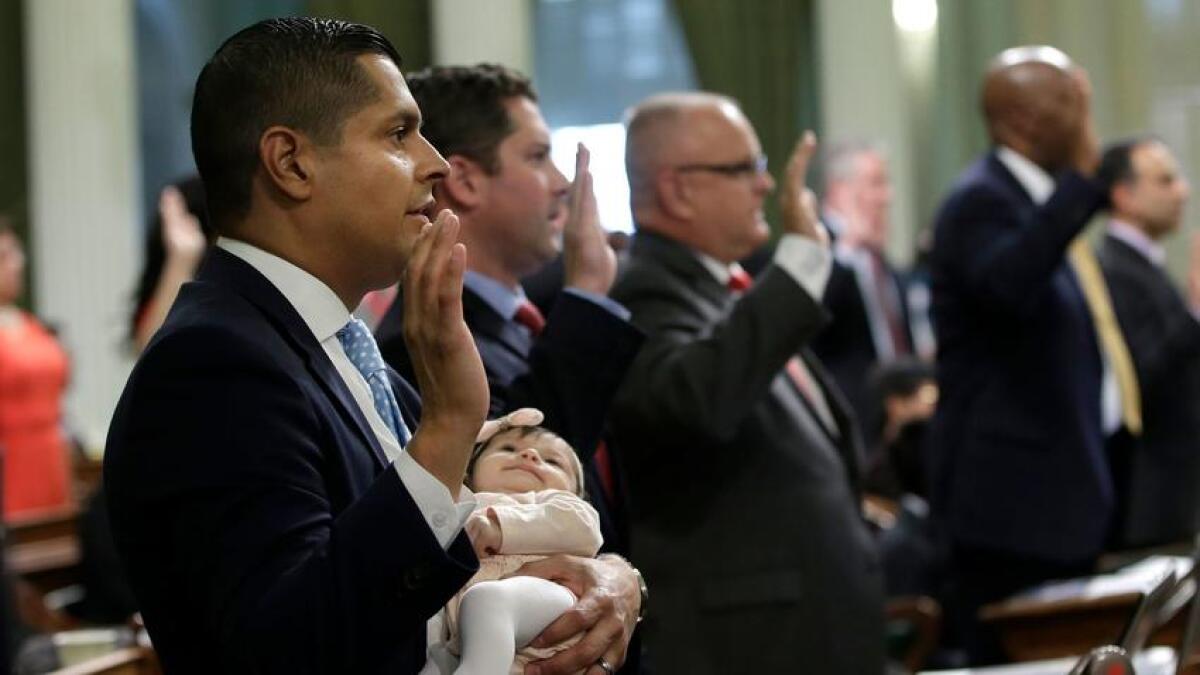
Backers of a bill to make it harder for police departments to discipline officers for making false statements say the current process ensnares officers who make simple mistakes.
But opponents of the legislation argue that building trust between law enforcement and the communities they serve requires greater accountability. The bill, authored by Assemblyman Miguel Santiago (D-Los Angeles) cleared its first committee hurdle Tuesday.
At least one of several state bills to expand the list of ‘violent felonies’ in California is likely to die
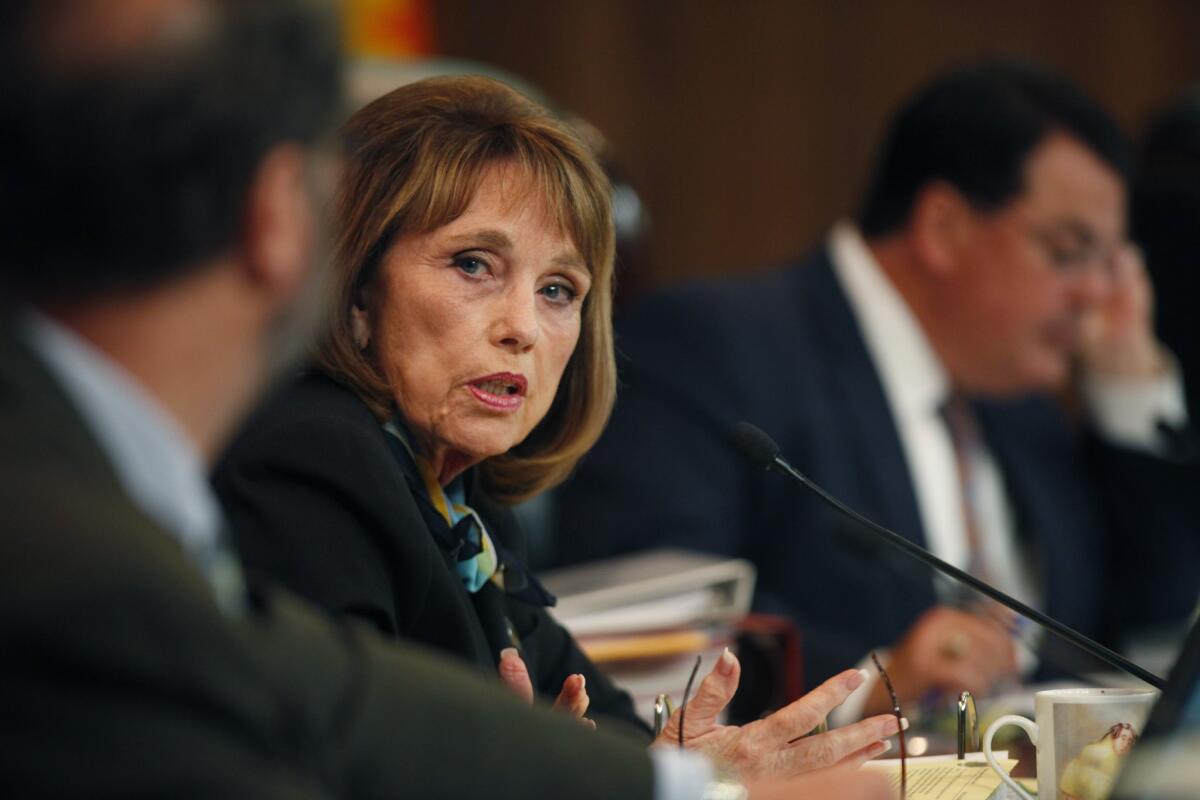
A state proposal that sought to expand the list of violent crimes under the California penal code failed to make it out of Senate Public Safety Committee on Tuesday.
Senate Bill 75, introduced by state Sen. Patricia Bates (R-Laguna Niguel), would have reclassified more than 20 offenses as violent felonies, including certain forms of rape and crimes such as inflicting injury on a child and assaulting an officer with a deadly weapon.
The legislation was voted down with a 5-2 vote along party lines. It was granted the option of “reconsideration,” meaning the committee could take it up again at a later date. But its chances of approval are slim.
In a statement released shortly after the vote, Bates said she respected her Democratic colleagues “for philosophically disagreeing with me on the length of prison sentences.”
“But blocking my violent felony bill today nevertheless jeopardizes the safety of all Californians,” she said. “I do not understand how anyone can say with a straight face that crimes such as assault with a deadly weapon on law enforcement should continue to be considered ‘nonviolent.’”
The bill is one of several this legislative session that seek to broaden the legal definition of a violent crime as California undergoes a massive overhaul of its parole system.
Gov. Jerry Brown’s Proposition 57, which voters overwhelmingly approved in November, will expand good behavior credits and give new power to the state parole board to consider the early release of prisoners who have served the full term of their primary sentences, and whose crimes are not designated as “violent” under the California penal code.
In guidelines to implement Proposition 57 laid out in his budget proposal, Brown excluded all death row inmates, prisoners serving life sentences without parole and all sex offenders from early parole consideration. Temporary guidelines now in effect make the same exclusions.
But lawmakers and prosecutors argue those exemptions can be challenged in court. Expanding the violent felony list, they say, is the best way to ensure sex offenders and other violent prisoners are not benefiting from the implementation of Proposition 57.
A bipartisan proposal filed by Assemblywomen Melissa Melendez (R-Lake Elsinore) and Lorena Gonzalez Fletcher (D-San Diego) would add to the list all forms of rape, spousal rape, sodomy, oral copulation and sexual penetration committed against a victim incapable of consent, including those victims who are intoxicated or mentally ill. It moved out of the Assembly Public Safety Committee last week with a 6-0 vote.
Republican Rep. Steve Knight fields questions on healthcare and Trump’s possible conflicts of interest at town hall
Rep. Steve Knight (R-Palmdale) told the crowd at his packed town hall in Simi Valley that he figured many of them wanted to talk about North Korea. Then the shouts of “Russia” started.
“We won’t talk about North Korea,” he said. “OK. Somebody please ask a question about a person who might start a war out there.”
Knight engaged in about an hour of sometimes testy back-and-forth with the largely liberal crowd as they grilled him on his stances on various issues.
Knight’s district is almost evenly split between registered Democrats and Republicans, while about a fifth of voters list themselves as “no party preference.” National Democrats have targeted Knight’s seat as one they want to flip in 2018.
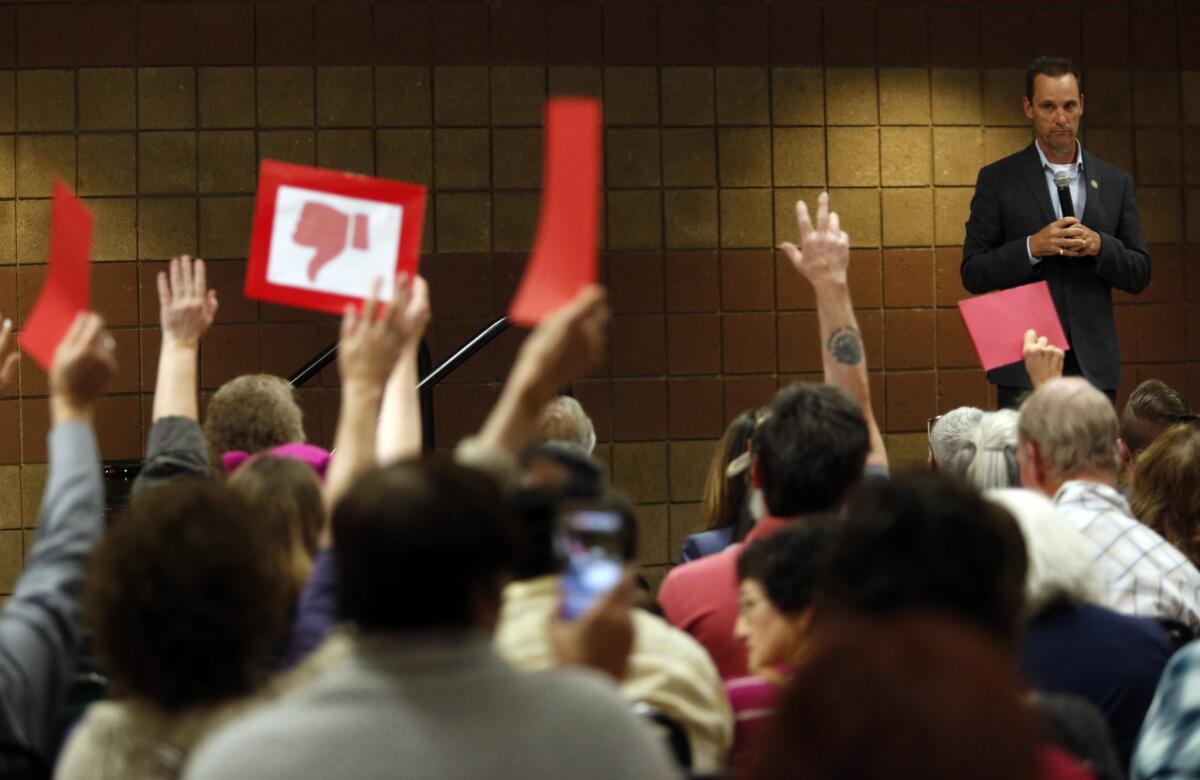
Would he vote to keep preexisting conditions as the Republican-controlled Congress debates changing Obamacare?
“I will keep preexisting conditions,” he said.
Does he believe in “accelerated” climate change caused by humans?
“I do believe that humans have a part. I do believe that we are possibly in a cycle, “ he said. “But that being said, you can’t put this kind of pollution into the air and not think that it is affecting the atmosphere.”
Knight also fielded questions about President Trump and criticized him for his frequent trips to his Florida resort.
“I don’t think that going down to Mar-a-Lago — or whatever it is called — is proper,” he said.
Asked about Trump’s possible conflicts of interest and whether he was violating the emoluments clause of the Constitution, Knight said he and his staff were reading the Constitution on Tuesday asking, “Is this a violation, is this not? [This situation] is kind of different than any other president because you got a billionaire president that owns things,” he said.
“There has to be either an investigation or some sort of a committee looking into this,” he said.
PAC plans to troll Rep. Duncan Hunter over campaign finance investigation with rabbit-costumed character
Rep. Duncan Hunter, get ready to meet Duncan Thumper, a giant rabbit.
With two cute ears, a pair of beady eyes and a little white tail, Thumper is the anthropomorphic personification of the Alpine Republican’s pet rabbit that took a cross-country flight paid for by the congressman’s political campaign.
Thumper will be the image of a political action committee, Bunny PAC, dedicated to focusing on the campaign finance scandal that has hounded Hunter for the last year.
At Simi Valley town hall, GOP Rep. Steve Knight is questioned by a Democrat running against him in 2018
Should California prohibit pet stores from selling animals that aren’t rescues? This assemblyman thinks so
The state Capitol became a bit more adorable on Tuesday, as backers and opponents of a proposal to impose new restrictions on pet stores trotted out some furry friends to make their cases.
A bill by Assemblyman Patrick O’Donnell (D-Long Beach) would prohibit pet stores in California from selling live dogs, cats or rabbits unless the animal was obtained from a shelter or rescue group.
More than 30 cities, including Los Angeles and Sacramento, already have such ordinances on the books, which are meant to clamp down on “puppy mills” that can lead to exploitative breeding practices.
“This bill brings California into compliance with compassion and common sense,” O’Donnell said at a news conference, holding a puppy from the Sacramento Society for the Prevention of Cruelty to Animals, which brought along several other adoptable pups.
The bill, AB 485, cleared its first committee hurdle Tuesday. But it faces opposition from certain pet retailers, who argue such a measure is an overreach.
David Salinas, who operates four pet stores in the San Diego area, also had a puppy in tow, this one coming from a commercial breeder.
“They say all commercial breeders are puppy mills,” Salinas said, after introducing his puppy to Duane Chapman, known as “Dog the Bounty Hunter,” who was in town advocating against a bail reform measure.
Salinas blamed animal rights activists for giving commercial breeders a bad reputation.
“They shouldn’t force that ideology on everyone,” he said.
‘Dog the Bounty Hunter’ joins opponents of bail reform in California

Celebrity bounty hunters Duane “Dog” and Beth Chapman on Tuesday were among dozens of bounty hunters and bail agents to voice opposition to a state bill that would drastically transform the way judges award criminal defendants bail in California.
The packed hearing before the Assembly Public Safety Committee signals the ramping up of what state lawmakers have predicted will likely be the largest criminal justice battle at the Capitol this legislative session.
Assembly Bill 42, introduced by Assemblyman Rob Bonta (D-Oakland), would limit offenders from having to post money as a condition of release from jail and would shift some power from judges to pretrial-services agencies to assess the risks they would pose if allowed out in the community.
It moved out of the public safety committee with a 4-2 vote. An identical bill in the other chamber, introduced by Sen. Bob Hertzberg (D-Van Nuys), is pending before the Senate Appropriations Committee.
At Tuesday’s hearing, criminal justice reform advocates crowded the hallways outside the committee room, as authors of the bill emphasized the burden on taxpayers of jailing people without convictions, and the toll on poor defendants who could not afford their release. Supporters pointed to the lower jail populations and success rates of “risk-assessment” models in other cities, including Santa Clara and Washington, D.C.
Bonta said reform was long overdue in California.
“Right now, we have a system where if you are a risk to the public and you are a flight risk, meaning you might not show up to your next hearing, but you have enough money in your pocket, then you could post bail and go free,” he said.
Opponents said reforming the bail system would be costly and do away with small family businesses that have survived generations.
They urged lawmakers to take victims into consideration and urged them to hold off on their bills until the system was studied further. One study by the Pretrial Detention Reform Work Group, appointed by state Supreme Court Chief Justice Tani G. Cantil-Sakauye, plans to release recommendations on best pretrial detention practices in December.
Speaking to reporters after the hearing, Duane Chapman called the hearing a victory for bail agents, saying lawmakers had agreed to go back to the drawing board.
The state bail system was in need of modernization, and California should be a leader, he said. But he said fugitives should not be allowed to go free.
“Poor people don’t break the law,” he said. “It’s not the poor man that runs. He has no money to run.”
7:40 p.m.: This article was updated with the final vote count.
This article was originally published at 12:05 p.m.
Tax day could bring in more than $1 billion for California’s state budget

As Californians rush to file their personal income taxes before a midnight deadline, budget writers in Sacramento are expecting more than $1 billion in payments on Tuesday to help balance the state’s books.
Brown’s budget team has projected a total of $14 billion in income tax revenues this month, a slight uptick from actual returns in April of last year. An analysis by the independent Legislative Analyst’s Office shows that total collections for the month are currently running about 10% above the same time last year.
The final totals as of April 30 are crucial to crafting both Brown’s revised budget plan, which will be presented to the Legislature next month, and the final plan lawmakers must put in place by June 30.
Tax revenues for the current fiscal year — combining sales and corporate taxes along with those paid by individuals — were about $780 million higher than the governor’s estimates through the end of March, the analysts report. Lawmakers and Brown often spar over whose tax revenue predictions to use when crafting a spending plan, a debate the governor has consistently won since returning to office in 2011.
Data from the state controller’s office shows that on tax day in 2016, the state collected $1.5 billion in income taxes. Although taxes collected in other months are also important in building state budgets — notably June and September as quarterly taxes are paid — April remains perhaps the best indicator of the fiscal road ahead.
Brown’s January budget plan projected a $1.6-billion deficit, with proposals to resolve the shortfall including the cancelation of some 2016 spending plans and slower funding growth for California schools.
Rep. Darrell Issa tells protesters outside his office that he’s not as conservative as people think
California’s DMV isn’t making sure people who have disabled parking permits should actually have them
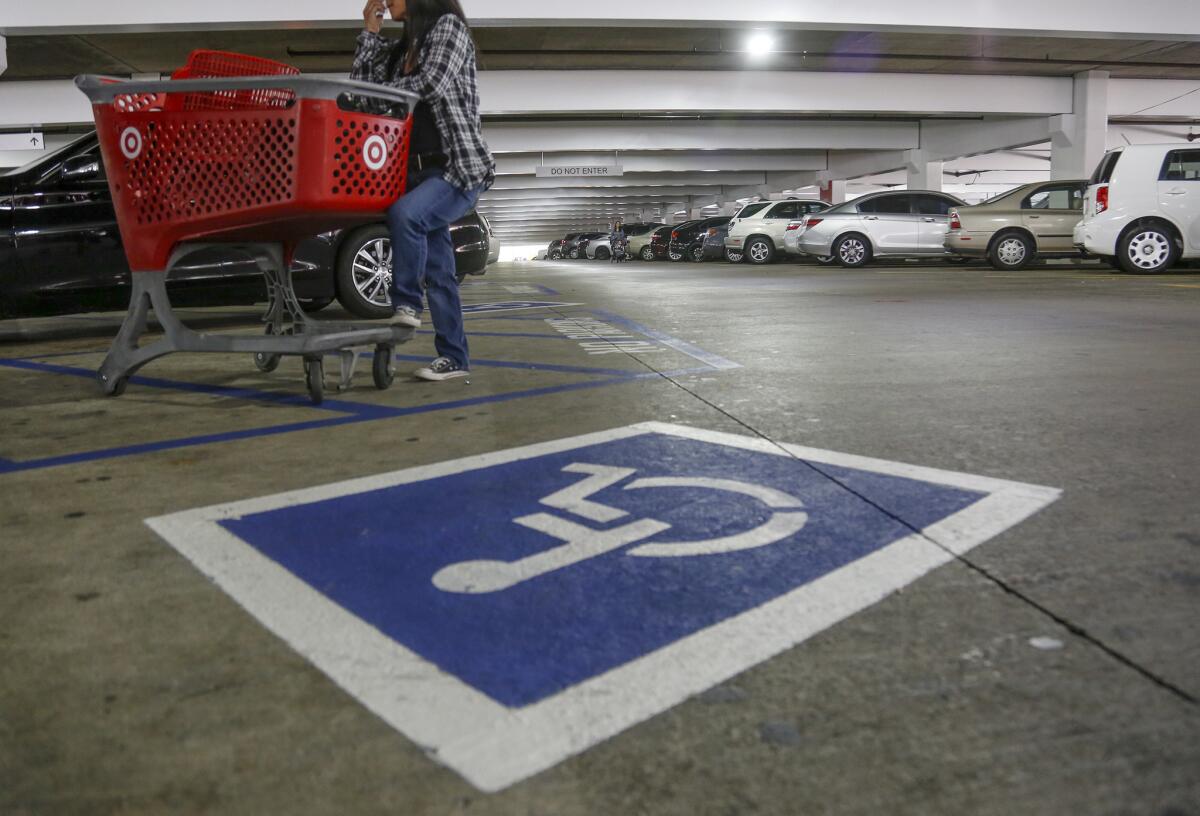
The California Department of Motor Vehicles isn’t making sure that people issued placards for disabled parking should actually have them, a state audit released Tuesday found.
Among other problems, the audit found the agency hasn’t canceled tens of thousands of the permits issued to people who have died, which has allowed some placards to be misused by their heirs.
The state has 2.9 million placards and disabled license plates in service that are meant to allow motorists with medical disabilities to park in disabled parking spots and curbside in metered spots for free and beyond time restrictions.
“DMV does not sufficiently ensure that applications for placards or plates are legitimate,” auditor Elaine Howle wrote in a letter to Gov. Jerry Brown and the Legislature.
Auditors looked at a sample of 96 approved placard applications and found 70 that “did not include sufficient medical information to demonstrate that the applicant qualified.” If that trend holds, it means the DMV may have approved 1.1 million applications from July 2013 through June 2016 without sufficient information to demonstrate that the applicant was qualified, the audit concluded.
Auditors questioned whether signatures of physicians on several applications matched information on file with the state and found the DMV does not work with health boards to review applications, as it is required to do.
Auditors also checked the name and date of birth of active placard holders against the U.S. Social Security Administration’s Death Master File, and identified nearly 35,000 matches. As of last June, they found nearly 26,000 placard holders were over 100 years old, even though the estimated centenarian population of California is only about 8,000.
In addition, some permanent placard holders have requested “an unusually high number of replacements for lost or stolen placards” and state law does not limit the number of replacements a holder may receive, she said. That means some placard holders might be giving extra placards to friends or family.
Although local sting investigations found about 15% of disabled parking placards are being misused, Howle said some local motor vehicle offices have less enforcement than others.
Auditors said there is no standard for how many sting operations each district office should conduct, so some do many more than others.
“By not establishing reasonable goals to conduct regular sting operations, DMV fails to detect and deter as much of the continued placard misuse as it can,” Howle wrote in the letter.
DMV Director Jean Shiomoto was given an advance look at the audit and has begun making improvements.
“We agree with the recommendations and are pleased to report that we have begun implementing the recommendations,” she wrote as part of the audit report.
The review was requested by former Democratic Assemblyman Mike Gatto.
“The audit showed a program that is even more rife with abuse than anyone could have conceived,” Gatto said Tuesday.
UPDATE
10:07 a.m.: Updated to to include comment from Mike Gatto.
Rep. Jeff Denham says he’s a ‘no’ on Republican healthcare legislation for now
Rep. Jeff Denham (R-Turlock) said Monday night that he wouldn’t support his party’s healthcare legislation unless it left significant parts of Obamacare intact.
“I’ve expressed to leadership that I’m a ‘no’ on the healthcare vote until it is responsive to my community,” he said during a town hall meeting with hundreds of voters in his district.
“There are things in the Affordable Care Act we expect to stay,” Denham added, such as coverage for pre-existing conditions and expanded Medicaid coverage.
Denham had previously expressed concerns about Republican legislation to roll back the Affordable Care Act, emphasizing that residents in his Central Valley district struggle to find doctors. The legislation was withdrawn after the party failed to resolve internal disputes between moderates and conservatives.
Restless members of the crowd frequently interrupted Denham, who won his fourth congressional term in November. Asked if he believes that climate change is real, voters chanted “yes or no?” until he answered.
“Yes, I believe in climate change,” Denham said.
Demonstrators and supporters pack GOP Rep. Jeff Denham’s town hall
Renowned architect Frank Gehry drops in for a visit at the state Capitol
Sen. Kamala Harris went to the Middle East for her first foreign trip as U.S. senator
Sen. Kamala Harris spent the first week of the April recess in Iraq and Jordan during her first trip overseas as a member of Congress.
It is common for representatives and senators not to publicize overseas trips until they return, particularly if they are visiting a potentially dangerous area.
In Iraq, Harris met with California service members. In Jordan, she visited with Syrian refugees in the Zaatari camp. The camp holds about 80,000 refugees, according to the United Nations refugee agency.
Harris serves on the Senate Select Intelligence Committee, which organized the trip, and the Senate Homeland Security and Governmental Affairs Committee.
She wasn’t the only member of California’s delegation traveling overseas last week. Reps. Juan Vargas (D-San Diego) and Darrell Issa (R-Vista) were also in the Middle East, making stops in Egypt, Jordan and Lebanon, and Rep. Mike Thompson (D-St. Helena) visited Japan and South Korea.
Dianne Feinstein faces down boos at San Francisco town hall, will hold another in L.A. Thursday
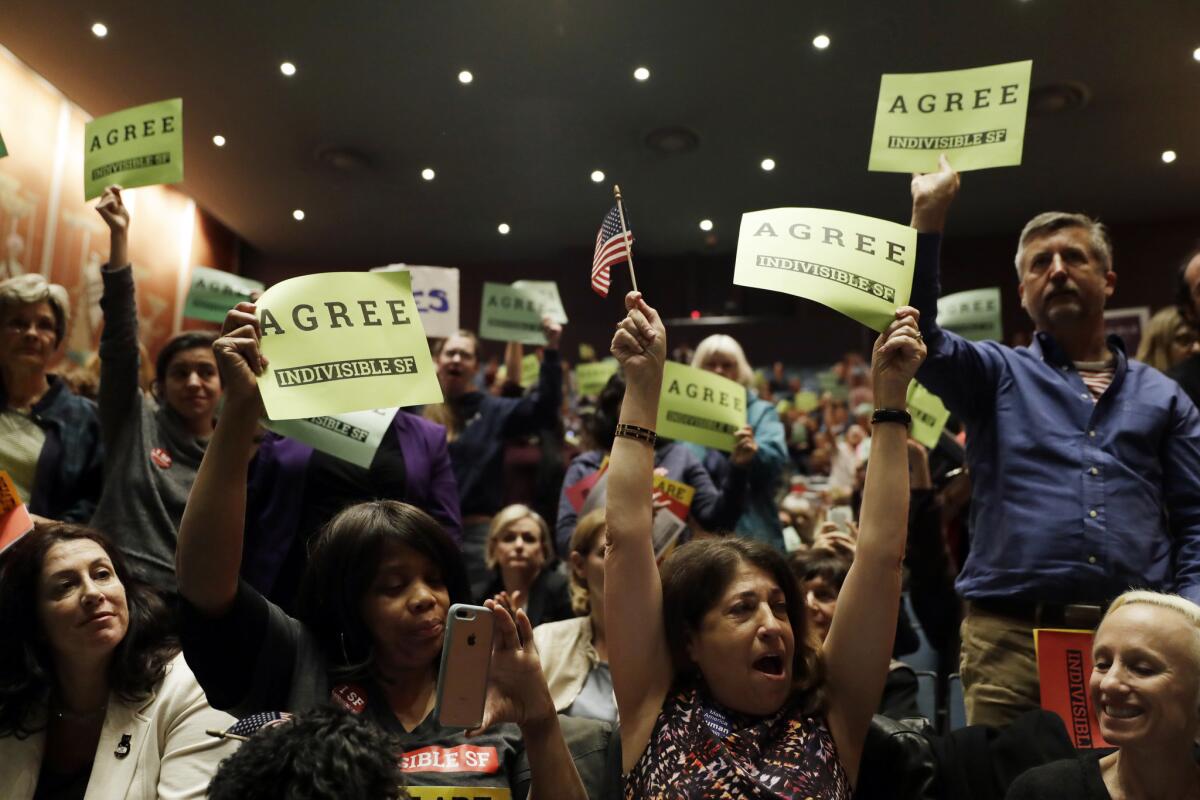
Progressive activists who have sought to address Sen. Dianne Feinstein face-to-face for months got what they wanted Monday as Feinstein held a town hall meeting in her hometown of San Francisco.
The most tense moment of the hourlong forum came when she answered an audience member’s question about healthcare by saying she doesn’t support efforts to move to a single-payer system.
Faced with boos, Feinstein said when it comes to a “total takeover” of healthcare by the government, “I’m not there.”
One audience member called Feinstein a “sellout” as others joined in chants of “Single-payer now!”
But the event was mostly calm. One heckler who yelled at Feinstein repeatedly was quickly shouted down by other town hall participants. Questioners pushed Feinstein to make public statements condemning “fascists in the White House” and calling Trump “corrupt” and “incompetent.”
“All of this takes a plan,” Feinstein responded. “I’d be surprised if you found too many senators, if any, that have gotten more done.... I don’t get there by making statements I can’t deliver. I get there through some caution, some discussion, some smart help, good lawyers and we generally get where we’re going.”
At least several audience members held up signs reading “Retire Feinstein” as protesters outside urged her not to seek reelection.
Feinstein, who will turn 84 in June, has hinted that she will seek reelection. Asked about whether she’ll run as she left the town hall, Feinstein told reporters, “You’ll find out soon enough,” according to the Sacramento Bee.
It was Feinstein’s first hometown public town hall meeting since being elected to the Senate 25 years ago.
With Congress in recess this week, several California members are holding their own town halls, including one in Simi Valley on Tuesday with Rep. Steve Knight (R-Lancaster), one hosted by Rep. Nanette Barragan (D-San Pedro) on Wednesday and another with Sen. Kamala Harris on Friday in Los Angeles.
Assembly Democrats say addressing the housing affordability crisis is next, but hurdles loom
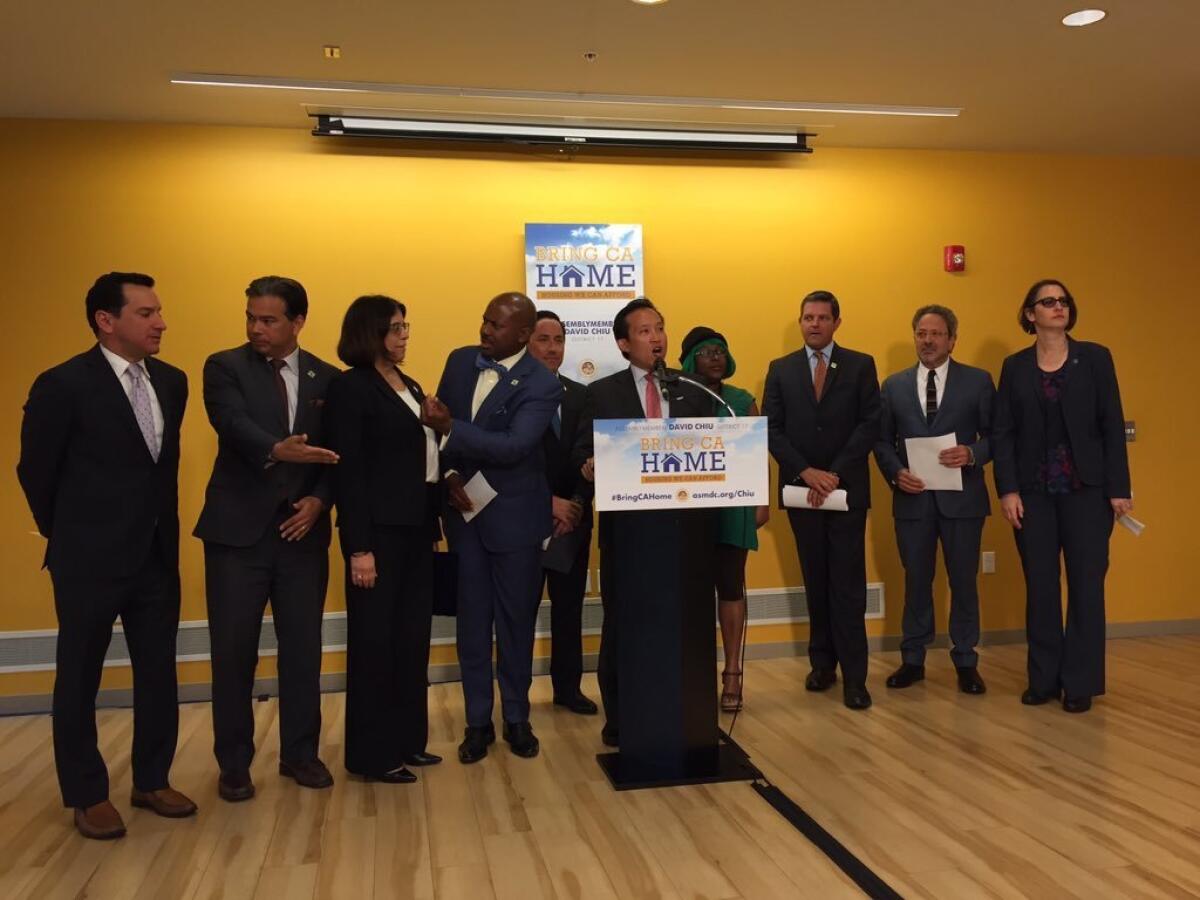
Addressing California’s housing affordability crisis is the next priority of Assembly Democrats, nine lawmakers said at a Monday press conference at a downtown Sacramento low-income housing complex.
Assemblyman David Chiu (D-San Francisco) said that after legislators passed a major transportation funding package earlier this month, housing was the state’s most significant unresolved issue.
“Like transportation, we need to put our money where our mouth is,” Chiu said.
But any major housing effort faces substantial hurdles in terms of prioritization and garnering support necessary for passage.
Housing might not really be next
Assembly Speaker Anthony Rendon (D-Paramount) joined Chiu and his colleagues at the press conference. But afterward Rendon didn’t commit to putting housing issues ahead of re-authorizing the state’s main financial program to combat climate change, another major priority on legislative Democrats’ docket.
“I’m saying housing is next because these bills are coming to committee now,” Rendon said. “But obviously a lot of this stuff runs concurrently. For now, our focus is on housing.”
Housing might not get addressed in upcoming budget negotiations
Last year, Assembly Democrats asked for more than $1 billion in low-income housing spending as part of budget talks. Gov. Jerry Brown whittled that number down to $400 million that would only be allocated if the Legislature agreed to his plan to loosen local rules for approving developments that included low-income housing. Lawmakers balked under intense pushback from labor and environmental groups, among others, and a deal never happened.
Rendon said he didn’t know if Assembly members would make a similar request to fund housing during this year’s budget talks, which begin in earnest next month.
“The conversations weren’t very fruitful last year,” Rendon said. “If there are different conditions we’re certainly open to having those conversations.”
Lawmakers could face many votes to increase taxes
The transportation package passed by the Legislature included a 12-cent increase in the gasoline tax, many other fee hikes and squeaked through the necessary two-thirds supermajority without a vote to spare.
Brown is aiming for another two-thirds vote to extend the state’s cap-and-trade program, which charges businesses to pollute in an effort to fight climate change. Political observers already believe the transportation vote makes it harder to get another one for the environment.
Housing measures, including Chiu’s bid to end the state’s mortgage interest deduction on second, vacation homes and spend that money on low-income housing instead, also require a two-thirds supermajority. Rendon said he believed his colleagues could sign off on a two-thirds vote for housing as well.
“I hope so,” he said. “It’s important. It’s a caucus priority for sure.”
After bucking leadership on transportation bill, Bakersfield Democrat loses powerful Assembly committee post
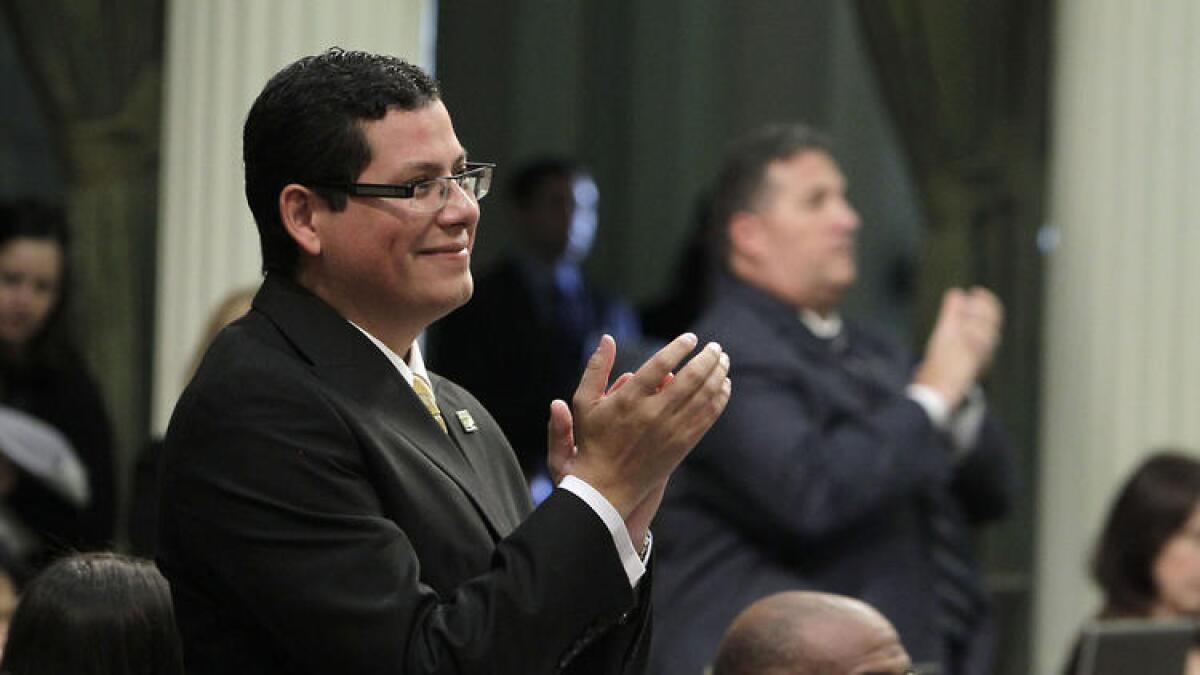
Assemblyman Rudy Salas (D-Bakersfield), the sole Assembly Democrat to vote no on the $52-billion transportation bill earlier this month, was stripped of a powerful committee post on Monday.
Salas will no longer chair the Business and Professions Committee, a powerful panel that oversees professional licensing —a leadership role that is typically seen as a prime position for fundraising. Taking over the post will be Assemblyman Evan Low (D-Campbell).
“Some days it’s hard to keep your commitments. Today is one of those days,” Salas said.
Assembly Speaker Anthony Rendon (D-Paramount) did not immediately return a request for comment.
The co-chairman of the informal but influential bloc of business-aligned Democrats, Salas was one of a handful of holdouts in the lead-up to the suspenseful vote on the transportation package, which included an increase in gas and diesel taxes and a new annual vehicle fee. But while most wary Democrats were ultimately cajoled to vote yes, Salas stood out as the sole “no” vote on the Assembly side. State Sen. Steve Glazer, a Democrat from Orinda, also opposed the measure.
The day after the vote, Salas posted a quote from Mohandas K. Gandhi on Facebook that extolled independent, even lonely, action.
Salas’ ouster as chair is one of many ripples set in motion by the bruising transportation fight. Conservative radio host Carl DeMaio has said he’ll work to recall freshman state Sen. Josh Newman (D-Fullerton), who narrowly won his seat last year and supported the transportation bill.
And the grind of cobbling together a super-majority to pass the legislation now complicates another top item on Gov. Jerry Brown and legislative leaders’ agenda: securing a two-thirds vote to extend the cap-and-trade program, the centerpiece of California’s efforts to combat climate change.
Break away from the USA? The effort to cleave California faces its own split
If there’s one thing Jed Wheeler and Marcus Ruiz Evans agree on, it’s that things in California need to change.
The state sends too much money to Washington, they say, and is both politically and culturally out of step with a country that lacks its openness and vitality.
They sharply disagree, though, on the matter of how and precisely when California should seek a divorce from the other 49 states.
Evans is pushing a ballot measure that would put the question of secession before voters in 2018, believing the time has never been so ripe to form a breakaway nation. Wheeler is working to create a pro-secession political party, looking a dozen or more years down the road when its candidates hold office, and fears that a premature vote would undermine the effort.
In short, the effort to cleave California faces a crackup of its own.
Watch live: Sen. Dianne Feinstein holds a town hall in San Francisco
Gov. Jerry Brown issues pardons, commutes sentences hours before Easter Sunday
Continuing his tradition of considering the requests of felons for a second chance both at Christmas and Easter, Gov. Jerry Brown on Saturday issued 72 pardons and seven sentence commutations for crimes ranging from burglary to being an accomplice in a murder.
The bulk of the actions by Brown, however, were for nonviolent drug crimes. Former prisoners who served time for those offenses have made up the majority of gubernatorial pardons since Brown took office in 2011.
The governor’s seven commuted sentences offer most of those involved a chance to be released from prison by the State Board of Parole Hearings.
Only one of the commutations will result in immediate release. Brown reduced the sentence of Maria Arriaga, a Los Angeles woman who was 18 when convicted of killing her newborn child. She was arrested after a suspicious hospital visit. Arriaga told doctors that the baby had been born at home, and did not bring the infant with her. Police later found the dead child at Arriaga’s home. She was convicted of second-degree murder and received a sentence of 15 years to life in prison.
Arriaga was found suitable for parole last year, but her sentence did not allow release from prison until 2021. The governor’s commutation will allow her to be released immediately.
“She had hidden the pregnancy from her abusive boyfriend, her deeply devout Catholic parents, her sisters and her friends,” Brown wrote. “Ms. Arriaga’s conduct in prison has been exemplary and she has deep remorse for her crime.”
The six dozen pardons granted on Saturday were for men and women who, in some cases, served their prison sentences decades earlier.
The governor issued 112 pardons on Dec. 23 and a news release on Saturday said that Brown’s approach to requests from former felons is that “pardons are not granted unless they are earned.”
California Politics Podcast: Lawmakers push for an earlier presidential primary
The slogan one group of California lawmakers wants you to remember is “Third in the nation.” That’s third in picking the nominees for president in 2020, behind Iowa and New Hampshire.
On this week’s California Politics Podcast, we examine two efforts to move the state’s primary to early spring in hopes of the state playing a bigger role in the race for the White House.
We also discuss the aftermath of last week’s big legislative vote on the $52-billion package of new taxes and fees for transportation. While legislators scramble to explain the vote to their constituents, the plan could complicate a big proposal waiting in the wings in Sacramento.
I’m joined by Times staff writer Melanie Mason and Marisa Lagos of KQED News.
Decision to uphold state cap-and-trade program will be appealed to California Supreme Court

The legal battle over California’s cap-and-trade program is going to the state Supreme Court.
After suffering a defeat last week, the conservative Pacific Legal Foundation announced Friday that it will appeal the decision.
The cap-and-trade program requires companies to buy permits to release greenhouse gases into the atmosphere, a system designed to provide a financial incentive to reduce pollution. Critics have accused the program of functioning as an unconstitutional tax because it wasn’t approved by a two-thirds vote of the state Legislature, the legal threshold for approving taxes.
A state appeals court in Sacramento rejected that argument, but Tony Francois, a senior attorney at the Pacific Legal Foundation, said they would keep pressing the case.
“Driven by a ravenous appetite for revenue, the state has given some of our most significant businesses and employers an offer they can’t refuse — either buy emissions permits or get out of California,” he said in a statement.
He added: “If this ‘pay up or shut down’ ultimatum is not a tax, then many forms of traditional taxation — think gas taxes — could also be defined as ‘voluntary,’ and exempted from the taxpayer protections in the state Constitution.”
The California Chamber of Commerce, which also filed a lawsuit against cap and trade, has not decided whether to appeal, according to a spokeswoman for the organization.
Republican assemblyman’s Modesto office vandalized Thursday night
Police are investigating a Thursday night break-in and vandalism at the Modesto district office of Assemblyman Heath Flora (R-Ripon).
Vandals removed a window at the assemblyman’s office and spray-painted a swastika and “SS” outside the building, according to Flora’s chief of staff, Dylan Gray. Nothing from the office was stolen.
The Thursday night incident was the latest in a series that has occurred at Flora’s Modesto office since he was elected last year. Previously, someone placed a bag with all the material to make a bomb outside the office, and there was an additional bomb threat, Gray said.
“We obviously do not know if these incidents are all connected, but we are not going to be intimidated by these unprovoked acts,” Flora said in a Facebook post describing Thursday’s incident.
Gray said Assembly sergeants completed a security check on the district office since Thursday night and are recommending that Flora move its location.
Gov. Brown calls for an investigation of alleged mismanagement at California’s tax board
Gov. Jerry Brown on Thursday asked state prosecutors to investigate allegations that employees of the state Board of Equalization misused state resources.
He also suspended the board’s ability to approve new contracts, hires and promotions, requiring those actions to be approved by other agencies including the Department of General Services.
In a letter to board members, Brown also said he would ask legislative leaders to come up with new laws to address “serious problems” with the agency that were identified in a recent state Department of Finance audit. The audit uncovered mismanagement in the agency, which is responsible for collecting $60 billion in taxes annually.
“The report uncovered issues of inappropriate interference by the board that undermines its ability to carry out its core mission: the collection and administration of sales and use taxes and other revenues,” Brown wrote. “Other serious personnel allegations involving the board were uncovered during finance’s review that warrant immediate investigation.”
The Department of Finance review found tax board employees assigned to revenue-generating jobs were reassigned temporarily to help elected board members with public outreach events to boost the board members’ standing in their districts.
For example, the board held a conference on empowering women, and used 113 revenue-generating employees, including highly paid tax auditors, to help with crowd control and “parking lot duty.”
There have also been allegations of rampant nepotism at the agency.
“Californians count on the Board for the fair and efficient administration of sales and use tax revenue and other revenues to fund key services,” Brown concluded in his letter. “The Board exists to serve the public and the report highlights the extent to which it has fallen sort.”
Board member Fiona Ma, who had requested investigations into the allegations, said she welcomed the governor’s action.
“I’m happy Gov. Brown responded to my call for serious reform at the BOE so that we can restore the public’s trust in this agency,” Ma said. “Based on my two years here, I have found and come to the conclusion that we must put in place real checks and balances, accountability and a willingness to be transparent.”
New prison parole overhaul guidelines win initial approval from California state regulators
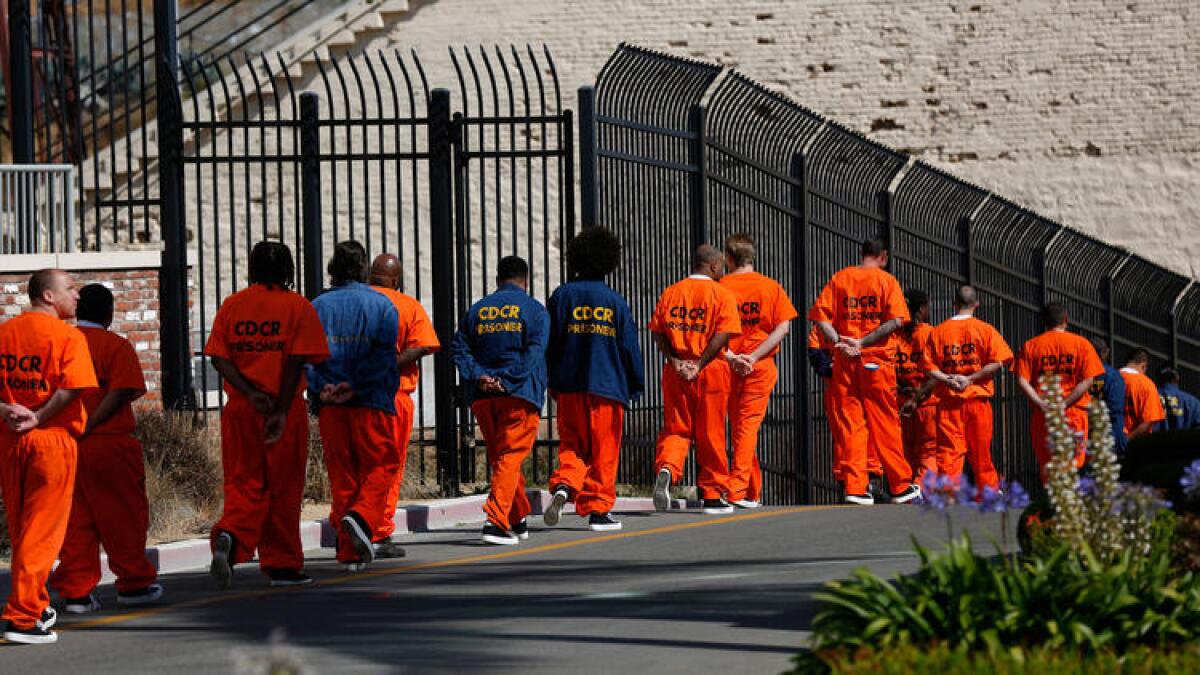
California state regulators have given their initial approval to a new set of guidelines that expand the credits inmates can earn for demonstrating good behavior and completing rehabilitation programs behind bars.
The regulations are the first step to overhauling the prison parole system under the widely debated Proposition 57, which is expected to cut the statewide prison population by 9,500 inmates over the next four years.
Under the new rules, inmates will be able to trim their sentences for earning a high school diploma or college degree and successfully completing work skills and self-help programs.
They are now in temporary effect over the next 160 days, during which the state Department of Corrections and Rehabilitation will undertake a public comment period. With the initial approval, changes to the credit system are on track to begin incrementally as early as May 1. Final approval is expected in the fall.
Trump’s Interior secretary meets with Gov. Jerry Brown in Sacramento
Interior Secretary Ryan Zinke met privately with Gov. Jerry Brown on Thursday, calling the conversation “positive and productive” on a variety of issues.
The meeting was not announced by Brown’s office, and the governor’s staff did’nt clarify who initiated the event.
“Governor Brown and Secretary Zinke had a very cordial conversation today and there was a real recognition that California and the federal government are deeply interconnected when it comes to land and water management,” said Evan Westrup, Brown’s press secretary, in an email.
Zinke said the topics covered in the state Capitol meeting included public lands and water infrastructure.
“I shared my intent to work with the governor to help prevent and reduce risks that wildland fires can pose to homeowners, watersheds, and businesses in California communities,” Zinke said in an emailed statement. “This includes strong management of federal land holdings. We also discussed ensuring a first-rate experience for the more than 40 million visitors expected to visit national parks in the state this year.”
Zinke, a former Montana congressman, was confirmed last month as Trump’s selection to lead the U.S. Department of the Interior. His record on issues ranging from oil drilling to climate change drew criticism from environmental groups earlier this year.
The secretary also met with federal employees based in Northern California on Thursday and later posted a photo on Twitter as he was traveling with Rep. Tom McClintock (R-Elk Grove) to Yosemite National Park.
Update 7:40 p.m. This story was updated with an emailed statement from Brown’s press secretary.
Tax tampons and diapers, or liquor? The choice is in the Legislature’s hands
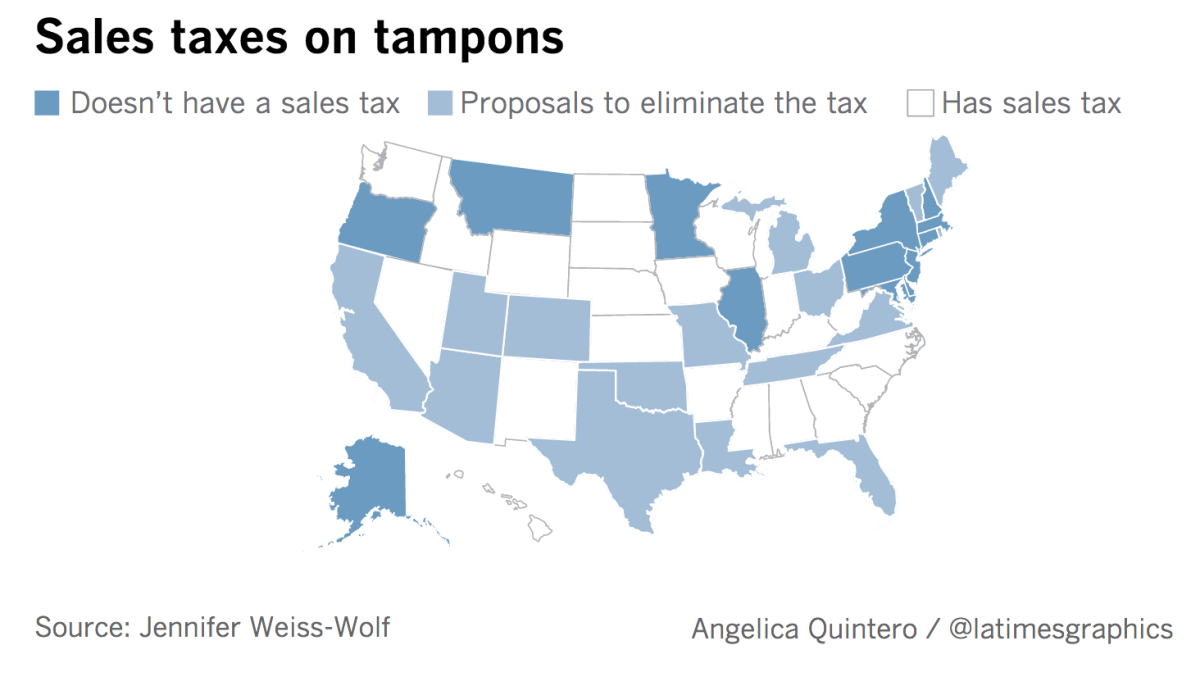
Two California assemblywomen are trying to eliminate sales taxes on diapers and tampons and other women’s health products and cover the cost of the change by hiking alcohol taxes.
The lawmakers are positioning their bill as a way for their colleagues to express their values and put the California in line with numerous other states across the country that have passed proposals to exempt sales taxes on those products. But their bill faces a high hurdle due to the power of the alcohol lobby and the difficulty raising taxes in general.
Change in North Carolina bathroom law not enough to lift California’s travel ban, Becerra says
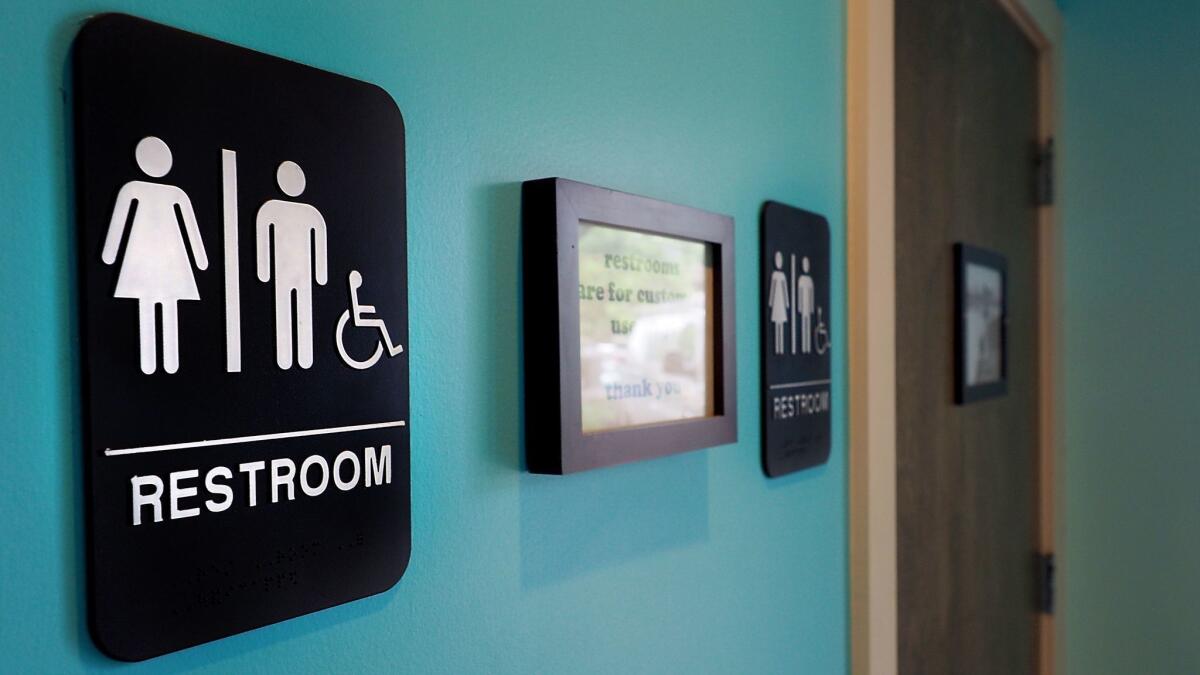
North Carolina’s repeal of its controversial “bathroom bill” did not sufficiently address concerns about discrimination to result in California lifting its ban on state-funded travel to that state, California Atty. Gen. Xavier Becerra said Wednesday.
The original legislation that sparked the travel ban had overturned an ordinance by the city of Charlotte that sought to allow transgender people to use public restrooms based on their gender identity.
Becerra said Wednesday that a state travel ban will remain in effect because a new bill enacted by North Carolina bans state and local entities, until Dec. 1, 2020, from approving new nondiscrimination laws involving public restrooms and changing facilities.
The new bill also prevents local jurisdictions from enacting ordinances to prohibit discrimination against LGBTQ people in public accommodations, Becerra said.
“California is inclusive,” Becerra said in a statement. “We take pride in protecting the rights of all our people. Discrimination is unacceptable and we intend to protect LBGT rights.”
The original bill brought travel boycotts from several groups and states, including California.
“California’s law was enacted to ensure that, with limited exceptions, our taxpayer resources are not spent in states that authorize discrimination on the basis of sexual orientation, gender identity, or gender expression,” Becerra said. “North Carolina’s new law does not cure the infirmity of this type of discrimination.”
Spring break in Canada: California state senators head north to study single-payer healthcare
Some California state senators are spending their spring break up north, on a weeklong trip to Canada to study its single-payer healthcare system.
Democratic state Sens. Ricardo Lara of Bell Gardens, Scott Wiener of San Francisco and Nancy Skinner of Berkeley traveled to the Canadian provinces of Quebec and Ontario this week to meet with officials and experts about their government-run healthcare program.
The trip was inspired by Lara’s proposal, Senate Bill 562, which would establish a single-payer system in California.
“Through meetings with experts in government health policy, and budget and fiscal health policy, as well as health care providers, hospital administrators, non-profits and patients, the delegation hopes to identify key elements of the Canadian healthcare system which can be emulated in California,” reads a mission statement for the trip filed with the Senate Rules Committee.
“The delegation will also explore the delivery of healthcare coverage to immigrants and refugees, an integral component of SB 562,” the statement says.
Canada’s single-payer system is paid for on the federal level and administered by the provinces. According to an itinerary, lawmakers are spending the bulk of their time in Quebec City and Toronto, the capitals of the two provinces, meeting with public health officials including Quebec’s Minister of Health and Social Services, Gaétan Barrette.
The schedule also includes a visit to Quebec’s parliament and the U.S. consulate general in Quebec City.
Radio host Carl DeMaio says he’ll work to recall Fullerton lawmaker who voted to raise California’s gas tax
Opponents of a gas-tax increase approved by the Legislature last week plan to launch a recall drive against freshman state Sen. Josh Newman (D-Fullerton) for voting in favor of the tax hike as part of a plan to raise $5.2 billion annually for road and bridge repairs.
Former San Diego City Councilman Carl DeMaio, a radio talk show host, said there is statewide interest in targeting Newman with a recall drive as punishment for his vote and to deprive the Democrats of their two-thirds majority in the Senate.
“We’re about focusing in and disciplining these politicians in Sacramento who recklessly raise the gas and car tax and we’re going to start out with Mr. Newman first,” DeMaio said. “We will then turn to the remaining Democrats and tell them, ‘Either you repeal the car tax or we will pick off more of you.’”
DeMaio said Newman was selected for the initial effort this year in part because he won election in November in a very close contest, beating former Republican Assemblywoman Ling Ling Chang of Diamond Bar by 2,498 votes.
The senator, who authored a ballot measure that would require the new taxes and fees to be spent on transportation, defended vote without directly addressing the recall threat. “I supported the transportation package because it’s urgently needed, because its specific benefits to my district far outweigh the costs – and because I was able to secure first-of its-kind constitutional protections so this funding can’t be ever be diverted by future Legislatures, he said in a statement. “As a Senator, I’m always going to be an independent voice and base my votes on what’s best for my constituents.”
DeMaio hosts an afternoon talk show on politics and current events on San Diego’s KOGO-AM, which is owned by iHeartMedia. His show has 156,000 unique weekly listeners in San Diego County, according to the latest ratings book from February 2017. That does not count online listeners and those in Orange County, he said.
DeMaio said he will use skills honed in qualifying initiatives for the San Diego ballot on pension reform and other issues to collect the 63,592 signatures of registered voters in 160 days needed to qualify a Newman recall measure for the ballot. DeMaio noted he was part of a budget reform group that was critical of former Gov. Gray Davis before he was recalled in 2003.
This post was updated at 5:55 pm to include comment from Newman.
Assemblyman Jimmy Gomez scores endorsements from six primary opponents in L.A. race for Congress
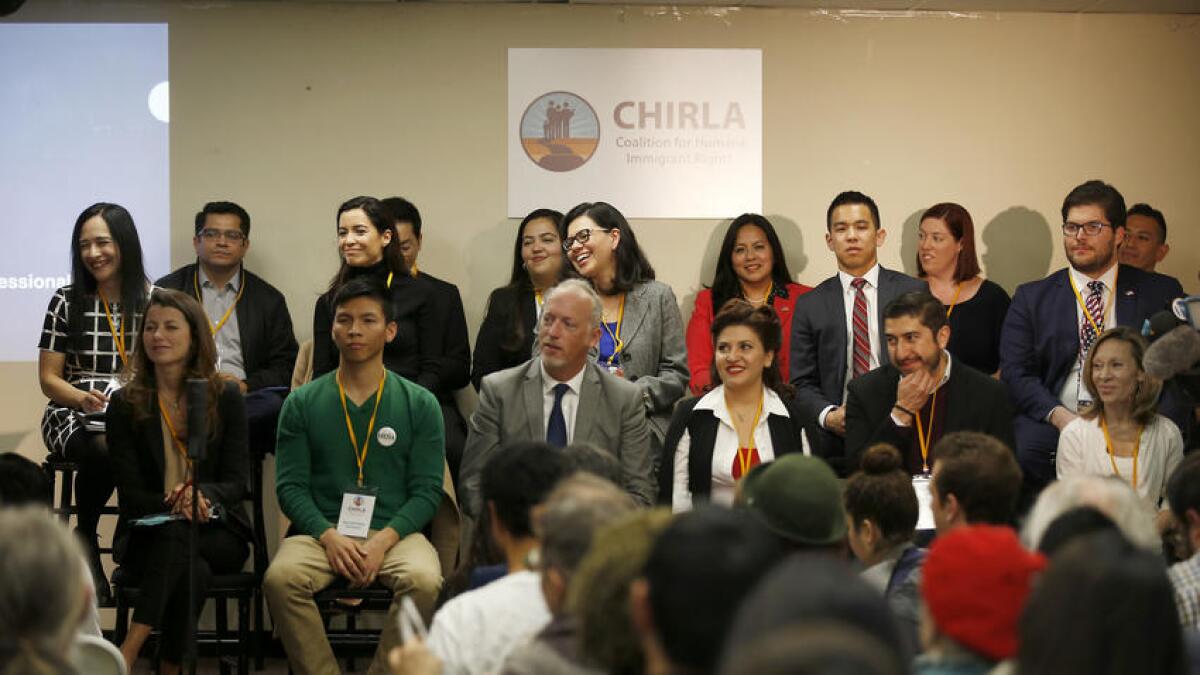
Six of the Democratic candidates who ran against Assemblyman Jimmy Gomez (D-Los Angeles) in the crowded primary for the 34th Congressional District are now backing him.
Alejandra Campoverdi, Yolie Flores, Sara Hernandez, Raymond Meza, Tracy Van Houten and Tenaya Wallace, all Democrats, endorsed Gomez just a week after he advanced to the June 6 runoff for the seat.
In the latest tally, the combined vote total in the primary for all six candidates was a little over 6,300 votes.
In a statement released by Gomez’s campaign, Hernandez, a former aide to L.A. City Councilman Jose Huizar, called Gomez a “tested advocate” who would stand up to Donald Trump, and labor organizer Raymond Meza said they shared a “commitment to fight for all workers.”
Also Tuesday, Democracy for America, a political action committee that had previously endorsed Wendy Carrillo in the primary, threw its support behind Gomez, saying the choice “was an easy one” between Gomez and former L.A. city planning commissioner Robert Ahn, also a Democrat.
Robert Lee Ahn gets boost from late-arriving ballots in L.A. congressional primary
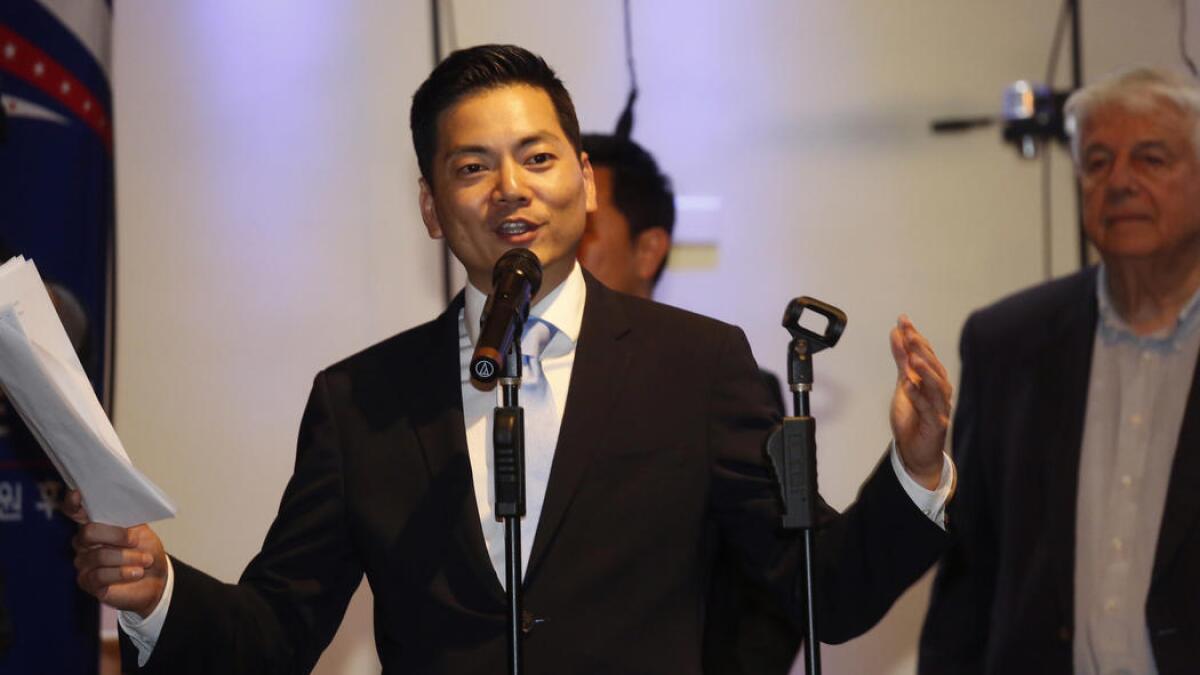
With the near-final tally of votes released by election officials Tuesday, Robert Lee Ahn appears to have finished much closer to the top vote-getter, Assemblyman Jimmy Gomez (D-Los Angeles), than previously thought.
Gomez, who was leading Ahn by nearly eight percentage points Friday, is now ahead by just over three points.
Of the 1,989 ballots counted since Friday, more than 1,800 went to Ahn. Gomez received just 23 votes in the latest round of tallies, leaving him with 25.36% of the vote and Ahn with 22.25%.
Turnout in the April 4 congressional primary is now at 14%.
Ahn spent considerable resources registering and turning out voters in the Korean American community, and while the geographic spread of these late-arriving ballots isn’t yet clear, this may be one indication of those efforts.
Both Democrats are headed to a June 6 runoff election, in which voters will choose their next House representative from the 34th Congressional District.
Lawmakers aim to move California’s presidential primary right behind Iowa and New Hampshire
California lawmakers and the state’s chief elections officer announced a new effort on Tuesday to move the state’s 2020 primary up by three months, even giving the governor power to accelerate the timeline in hopes of closely following elections in Iowa and New Hampshire.
“A state as populous and diverse as California should not be an afterthought,” Secretary of State Alex Padilla said in a statement supporting Senate Bill 568.
The bill’s author, Sen. Ricardo Lara (D-Bell Gardens), plans to bring the proposal to a state Senate committee hearing next week. It is the second bill introduced in the Legislature this year that would move California’s presidential primary from June to the third Tuesday in March.
Unlike the first bill, though, Lara’s effort would allow the governor to move the state’s primary even earlier if other states charge ahead of California.
“By holding our primary earlier, we will ensure that issues important to Californians are prioritized by presidential candidates from all political parties,” Padilla said.
The new efforts would also move the state’s congressional and legislative primaries to March from their traditional spot in June. California lawmakers first moved the presidential primary to March in 1996. In 2008, the presidential primary was held in February, and voter turnout was higher than it had been for almost three decades.
In 2012, lawmakers returned the vote to June for all primaries after complaints about the cost of standalone presidential primaries and the state’s relatively limited impact in picking the eventual Democratic and Republican nominees.
While California was often skipped by presidential candidates in the years of the early primary, supporters say the state’s new focus on absentee voting could encourage the candidates to come west in search of millions of potential votes to be cast in the weeks before election day.
California lawmakers have tried, but largely failed, to help build pro sports stadiums
Since 2009, state lawmakers have made more than a half-dozen high-profile attempts to help build professional football and basketball stadiums. But aside from a 2013 law that helped the Sacramento Kings with their new NBA arena, legislators don’t have much to show for their efforts.
Take a look at this timeline showing all the times legislators weighed in on behalf of stadium projects since 2009.
Another candidate jumps into race for Jimmy Gomez’s Assembly seat ahead of congressional election
Anti-pot group faces campaign finance violations from its work opposing marijuana legalization in California

A national anti-marijuana coalition is facing $6,000 in fines for campaign finance violations in its opposition to Proposition, 64, a November ballot measure that legalized recreational use of cannabis in California.
The fines have been agreed to by SAM Action Inc., the political arm of Smart Approaches to Marijuana, an anti-legalization group founded by Kevin Sabet, a former drug policy advisor to the Obama administration.
The enforcement staff of the California Fair Political Practices Commission proposed $6,000 in fines against SAM Action Inc.
The violations included not changing the campaign committee’s name to include its major donor, Juliet Schauer, a retired art professor and Pennsylvania activist who contributed $1.36 million to the group to cover expenses in California and other states considering marijuana legalization.
The committee also was late in disclosing five Schauer contributions, failed to accurately report the total amount of contributions and failed to file a list of its top 10 contributors, as required by the state Political Reform Act.
“A central purpose of the Act is to ensure receipts and expenditures in election campaigns are fully and truthfully disclosed,” wrote Galena West, the commission’s chief of enforcement, in a report on the violations. “In this case, the Committee failed to timely and accurately disclose contributions received and the Schauer Trust’s involvement as a major donor to the Committee.”
The committee’s operators, including Sabet, told investigators that the violations were “inadvertent,” caused by “inexperience with California campaign reporting requirements,” the report said.
The commission will meet on April 20 to consider approving the fines recommended by its staff.
Sabet said in a statement that the campaign committee “rectified the situation while disclosing everything before the election.”
Proposition 64 was approved in November by 57% of the state’s voters.
Another $3,500 in fines are proposed against a campaign committee called Public and Mental Health Advocates Against 64, which was sponsored by and received major funding from SAM Action, Inc.
The enforcement staff alleges that the campaign committee did not identify in its advertising special interests that contributed more than $50,000.
California leaders to Sessions and Kelly: Legislature ‘will use all available means’ to defend state policies
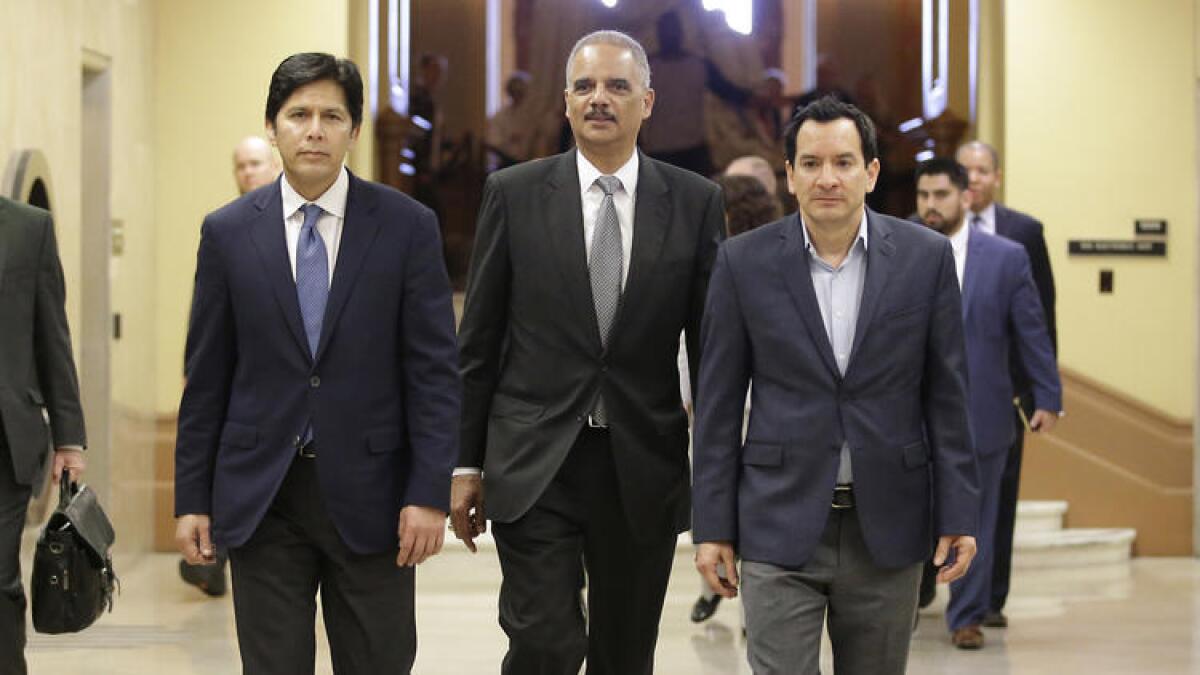
California state leaders are asking U.S. Atty. Gen. Jeff Sessions and Homeland Security Secretary John F. Kelly to identify the state’s statutes or ordinances that they perceive as designed to prohibit or obstruct the enforcement of federal immigration law.
In a letter sent to the U.S. officials last week, a lawyer for Covington & Burling, a private firm hired by the state Senate and Assembly, said the Trump administration had repeatedly made unsupported accusations against California. In its “repeated attacks on states,” the document stated, the administration appeared to disregard the balance of power between the states and the federal government.
The letter came in response to another letter from Sessions and Kelly, in which they admonished California Chief Justice Tani Cantil-Sakauye. Cantil-Sakauye, a former prosecutor who rose through the judicial ranks as an appointee of Republican governors, spoke out against federal immigration agents she said had been “stalking” courthouses to make arrests.
The letter from Sessions and Kelly was “particularly troubling,” state leaders said in their response, when coupled with a January executive order from the Trump administration directing the U.S. attorney general to take action against any entity that prevents the enforcement of federal law.
“The administration’s unnecessary and repeated assaults on the policies of California, its counties, and its cities are deeply unsettling,“ the letter from the Legislature states. “Acting within our constitutional framework, California, its counties and its cities have enacted laws that best protect the rights and interests of their residents.”
Among the policies cited was the California Trust Act, which prevents law enforcement agencies from detaining immigrants longer than necessary for minor crimes, thereby helping federal immigration authorities take them into custody.
“If the Trump administration resorts to attempting to enforce its order against California, the Legislature will use all available means to defend the rights, values and safety of California,” the letter says.
Read the letter here.
Democrats to set up shop in Orange County as part of effort to win GOP congressional seats
The arm of the Democratic Party in charge of winning control of Congress is moving senior staffers from Washington to Orange County in hopes of flipping Republican-held House seats out west during the 2018 midterm elections.
The Democratic Congressional Campaign Committee is aiming to defeat seven California Republicans who represent congressional districts where Hillary Clinton beat President Trump — including a cluster of seats in Los Angeles, Orange and San Diego counties.
The committee will send staffers in charge of overseeing House races in California, Nevada, Oregon and Washington state to work out of an Irvine office in an effort to make inroads in Republican strongholds.
Rep. Ben Ray Luján of New Mexico, the chairman of the committee, said the move was made to “be as close to the voters and the campaigns as possible.”
But Darry Sragow, a veteran campaign consultant who helped Democrats regain control of the California Assembly in 1996, said putting an office in Orange County won’t help the cause if the committee doesn’t find good candidates and a good strategy.
“Where the operation is really doesn’t matter: It’s about looking at voting patterns and figuring out if some of these seats can become Democratic,” he said.
Democrats backing Jimmy Gomez for Congress support candidate seeking to replace him in Assembly
California Politics Podcast: The bumpy road toward a $52 billion transportation deal
The legislative approval of a new California transportation plan paid for by higher fuel taxes and new vehicle fees was not only historic. It was also fraught with political peril.
On this week’s California Politics Podcast, we take an in-depth look at the dealmaking that brought about the $52-billion plan’s passage. And we discuss how it might affect other big negotiations this year in Sacramento.
We also take a look at Thursday’s appeals court ruling that upheld the structure of California’s cap-and-trade climate change program. And we skim the results of Tuesday’s special election for a Los Angeles seat in Congress, which now heads to a June runoff election between two Democrats.
I’m joined by Times staff writer Melanie Mason and Anthony York of the Grizzly Bear Project.
Gov. Jerry Brown celebrates his 79th birthday with cake and a political victory
Gov. Jerry Brown marked his 79th birthday Friday morning by celebrating the passage of a $52-billion transportation package the prior evening as he met with Mexican dignitaries in Los Angeles.
“He was feeling good,” said Luis Alvarado, a political strategist who attended the breakfast. “He was pretty proud of the new tax that will help fix our roads.”
The roads plan will be funded by an increased gas tax and a new vehicle fee.
Brown met with governors of several Mexican states for two hours over breakfast at the country’s consulate in Los Angeles. They discussed trade, human rights and the environment.
Then the attendees presented Brown with a tres leches cake and serenaded him in Spanish with “Las Mañanitas,” a common birthday greeting in Mexico and other parts of Latin America.
With counting almost complete, turnout in L.A.’s congressional primary is about 13%
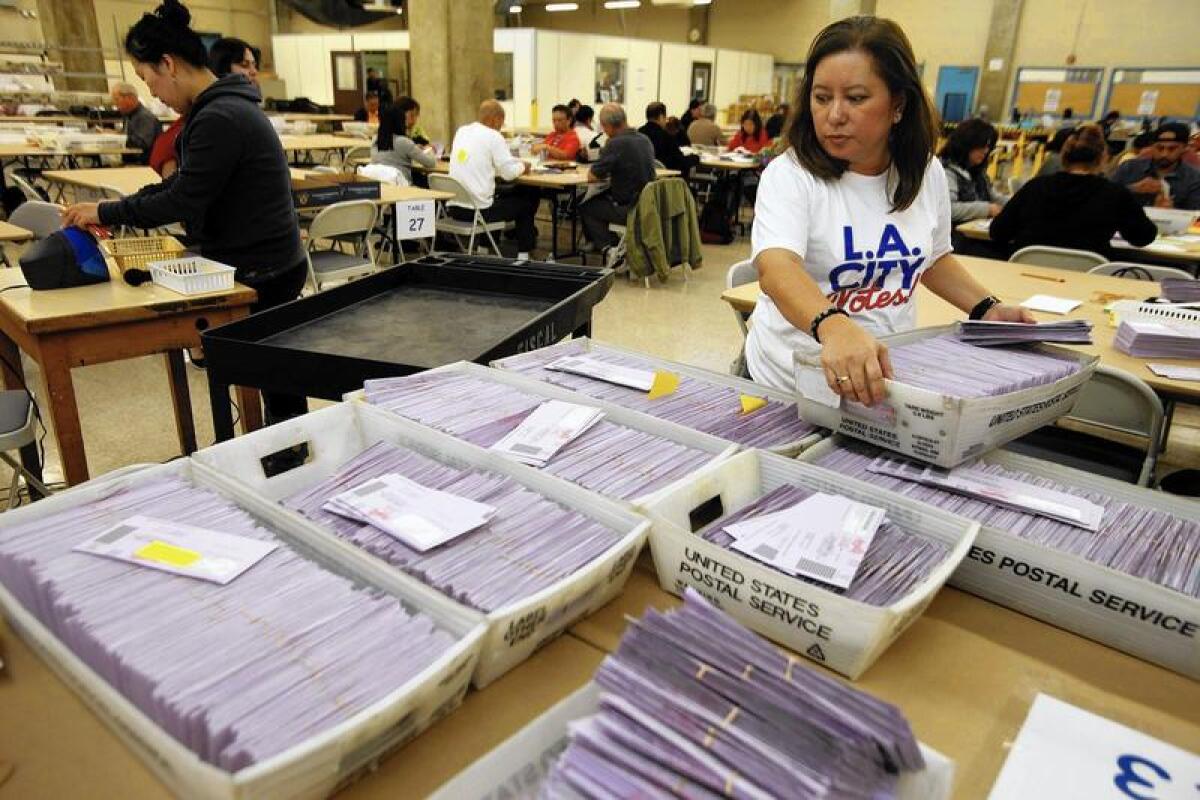
The ballot-counting continues in L.A.’s congressional race, but county election officials released updated vote tallies Friday.
So far, a total of 40,913 ballots have been counted, putting the unofficial turnout just north of 13.4%.
There are still about 2,300 provisional and mail ballots that haven’t been processed, officials said. If all of those are verified and counted, turnout would still hover around 14%.
Voters in the election were split about evenly between those who cast ballots at the polls and those who voted by mail.
In the latest totals, Democrats Jimmy Gomez and Robert Lee Ahn still have sizable leads over the rest of the field, but their vote shares diminished slightly. Maria Cabildo picked up roughly 1,500 votes in the latest update, while Gomez and Ahn each gained roughly 2,500 and 2,000 votes each, respectively.
Gomez and Ahn will advance to a June 6 runoff for the 34th Congressional District seat.
Above are vote totals for the top five candidates as of early Wednesday morning. Below are the tallies from the latest update.
The next round of updated totals will be reported next Tuesday. You can view the latest results here.
L.A. Councilman Jose Huizar endorses Jimmy Gomez for 34th District congressional seat
Rep. Adam Schiff to address California Democrats at May convention
California Assembly votes to expand protections for immigrant crime victims and witnesses
The state Assembly approved a bill on Thursday that would prohibit law enforcement officers from detaining a crime victim or witness on immigration charges or violations.
The legislation, filed by Assemblyman Reggie Jones-Sawyer (D-Los Angeles), was approved with a 69-1 vote and now heads to the state Senate for consideration.
Current state law prevents officers from detaining witnesses to a hate crime on immigration violations or suspicions of immigration offenses. It also prohibits officers from turning over or reporting hate crime witnesses to federal immigration authorities.
On the Assembly floor Thursday, Jones-Sawyer said the bill expands protections for immigrants in the country illegally and “thus promotes social responsibility” for anyone living in California.
“It supports open collaboration of all individuals with law enforcement, an important component to our state’s public safety,” he said.
The legislation was approved without debate.
Nancy Pelosi asks Paul Ryan to cancel House recess for vote on military use in Syria
House Minority Leader Nancy Pelosi (D-San Francisco) urged Speaker Paul Ryan (R-Wis.) Friday morning to bring House members back from their spring recess to discuss President Trump’s use of military force in Syria.
At issue is whether the 2001 authorization for the use of force that Congress approved after the Sept. 11, 2001, terrorist attacks gives the president permission to take military actions in Syria. It was a question lawmakers weren’t able to agree on under President Obama.
Many of California’s House Democrats said Thursday night Trump should have asked Congress before he bombed civil war-torn Syria in retaliation for a suspected chemical attack this week on a rebel-held area. The House had already left for its two-week recess when the bombing occurred. The Senate is scheduled to leave Friday afternoon.
“The president’s action and any response demands that we immediately do our duty. Congress must live up to its constitutional responsibility to debate an authorization of the use of military force against a sovereign nation,” Pelosi said in a letter to Ryan.
The war in Syria will not be resolved with a single night of airstrikes, Pelosi added.
“The American people are owed a comprehensive strategy with clear objectives to keep our brave men and women in uniform safe and avoid collateral damage to innocent civilians in Syria,” Pelosi said.
It’s unlikely that Congress will be called back and Ryan’s office said it hasn’t changed the schedule. But Ryan’s spokeswoman AshLee Strong said the White House should come to Congress to discuss the next moves.
“Last night’s response was fully within the president’s authority,” she said. “It is now appropriate for the administration to consult with Congress as it considers next steps to resolve the long-running crisis in Syria.”
8:54 a.m.: This post has been updated with a quote from Speaker Paul Ryan’s spokeswoman.
It was originally published at 7:25 a.m.
State legislators approve $52-billion transportation plan to repair California’s ailing roads

After a nail-biter vote in the Assembly, the $52-billion transportation package cleared the Legislature late Thursday night and now goes to Gov. Jerry Brown for his signature.
“Members, it’s been a long, crumbling road to get where we are today,” said Assemblyman Jim Frazier (D-Oakley), who helped craft the legislation.
Frazier cast the measure as “monumental” and balanced between funding public transit and repairing weathered roads.
Republicans were unanimous in their opposition to the measure.
“This is the largest gas tax increase in California history,” said Assemblyman Vince Fong (R-Bakersfield).
“My biggest concern is that California is becoming unaffordable,” he added.
The measure to generate $5.2 billion annually would raise taxes on both gasoline and diesel fuel. Electric car owners would pay a $100 yearly fee. It also creates a new annual vehicle fee that varies based on the value of the car.
It passed the Senate earlier Thursday on a 27-11 vote. One Republican senator, Anthony Cannella of Ceres, voted for the measure.
The bill posed a test of the Democratic supermajority, with members in swing districts wary of casting a politically unpopular vote to raise taxes. Legislative leaders and the governor amped up the arm-twisting in the hours before the vote, negotiating side deals to entice members with projects in their districts.
The scrounging for votes was complicated by the sudden absence of Assemblywoman Sharon Quirk-Silva (D-Fullerton), who was hospitalized late afternoon. She returned to the Assembly chambers late Thursday night.
Assemblyman Adam Gray (D-Merced), a key swing vote who signaled his support Thursday morning after Brown agreed to $500 million in commuter train and roadway investments in the northern Central Valley, praised the bill on the Assembly floor as a “package that provides new money so that the state can keep its commitment to local communities that need potholes filled, that needs roads built and maintained.”
Assembly GOP leader Chad Mayes (R-Yucca Valley) pointedly accused Democrats on the fence of “being bought off — not personally, but for your districts.”
“We’re all friends, we’re friends,” Mayes said. “And I know a week ago, you didn’t want to go up on this bill.”
The bill was initially short three votes, with one Assembly Democrat, Assemblyman Rudy Salas of Bakersfield, voting no. After fierce wrangling on the Assembly floor, the bill ultimately cleared with 54 votes, the bare minimum it needed to pass.
Many of California’s House Democrats say Trump should have asked them before he bombed Syria

Democrats in California’s congressional delegation were quick to weigh in Thursday on the U.S. bombing of a Syrian airbase, expressing horror at atrocities committed by Syrian President Bashar Assad during a years-long civil war, but most faulting President Trump for not going to Congress before launching the missile strikes.
The U.S. launched dozens of Tomahawk missiles Thursday night onto a Syrian airbase in retaliation for a poison gas attack this week that U.S. officials said was carried out by Assad’s forces.
Trump did not seek congressional authorization for the bombing, and critics on both the left and right say Trump needs Congress’ approval to use military force.
Democratic Minority Leader Rep. Nancy Pelosi (D-San Francisco) was measured, praising the move but saying the president ought to seek congressional authorization if he plans further action.
“Tonight’s strike in Syria appears to be a proportional response to the the regime’s use of chemical weapons,” Pelosi said.
The president did not mention the authorization issue in a brief statement he delivered Thursday night about the strike, but the matter is likely to be debated in coming days, and most California Democrats faulted him for not seeking it.
Fewer Republican members of the California delegation immediately weighed in.
House Majority Leader Kevin McCarthy (R-Bakersfield) was fully supportive, commending American troops and pointing to Assad’s use of chemical weapons to kill civilians.
Congressman Ed Royce (R-Fullerton), the chairman of the House Foreign Affairs committee, praised Trump’s move but also called on the president to coordinate his efforts with Congress.
Labor heavyweight Maria Elena Durazo will run for Kevin de León’s state Senate seat
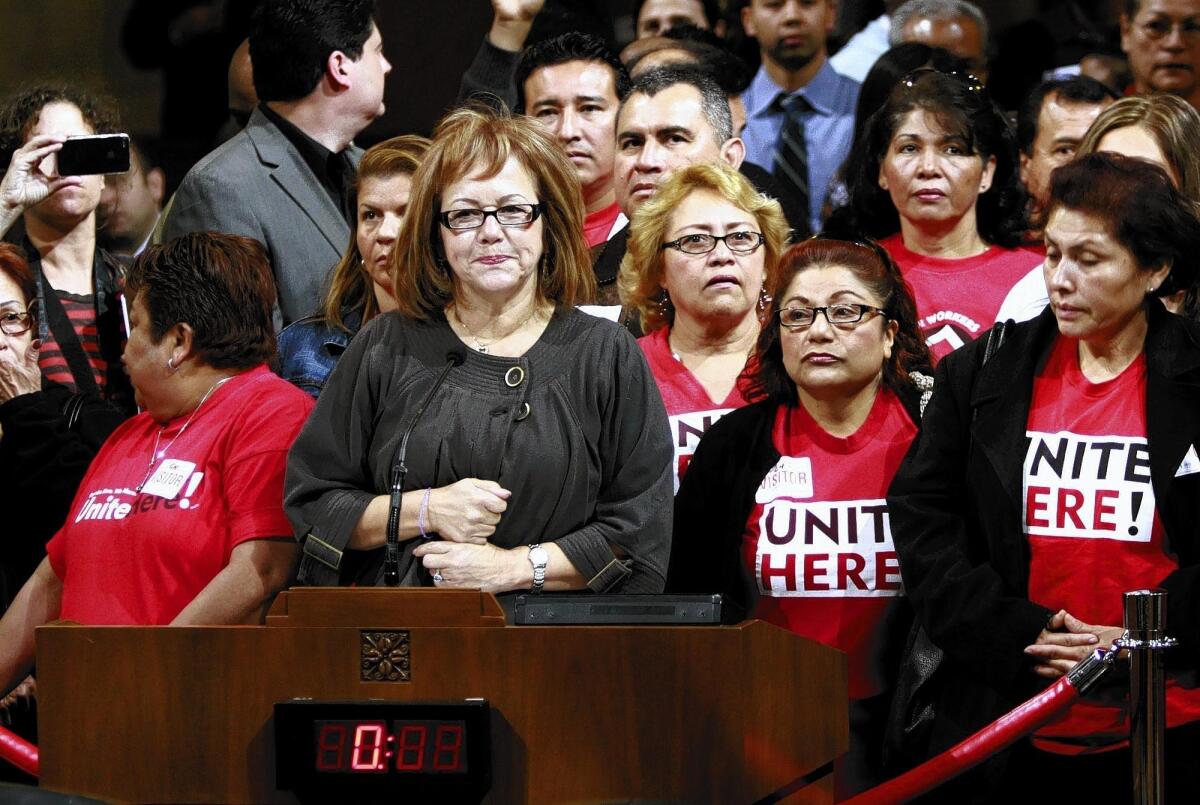
Maria Elena Durazo, who served for years as the leader of the Los Angeles County Federation of Labor before stepping down in 2014, said Thursday she will make the jump into electoral politics and run for state Senate President Pro Tem Kevin de León’s seat representing parts of Los Angeles when he is termed out in 2018.
Durazo was widely considered one of the most powerful figures in Los Angeles politics when she gave up her labor post to become a vice president of Unite Here, a union representing hospitality workers in the United States and Canada.
The county labor federation reached new heights of power during Durazo’s tenure, helping elect a bevy of labor-friendly candidates to the Los Angeles City Council and the county Board of Supervisors. She also scored numerous legislative wins, including a minimum wage law requiring some large Los Angeles hotels to pay workers at least $15.37 an hour.
But Durazo, who has served as a vice chairwoman of the Democratic National Committee since 2013, had never before displayed a desire to run for public office, opting instead for a behind-the-scenes role.
“It was not a long time coming — in fact, I’ve always felt very strong about not doing that,” she told The Times on Thursday. “At times people urged me or suggested it, but I always felt it wasn’t the place for me.”
She credits the election of President Trump with changing her mind.
“I think things are changing in this country; obviously the Trump administration is doing things I consider very bad,” she said. “I just never imagined him getting elected and pushing for these things.”
Durazo is the first candidate to announce a campaign to represent the 24th State Senate District, which De León, a fellow Democrat, first won in 2010. The diverse district stretches from East Los Angeles through Boyle Heights, part of downtown Los Angeles, Highland Park, Mount Washington and Eagle Rock, into Silver Lake and Echo Park. Chinatown, Koreatown, Little Armenia and Thai Town also fall within the district.
Nearly 60% of voters in the district are Democrats, and 27% are registered as having no party preference. Just 8.9% are Republicans.
Durazo said she will highlight her accomplishments during her time with the labor movement but also take into account the viewpoints of business interests.
“I’ve invested practically my whole life in Los Angeles and California to change the environment, to make it a positive environment for progressive policies and at the same time not be too crazy — and take in business needs,” she said.
Though she is making her first run for public office, Durazo said her years listening to workers and organizing them will help her as she builds a coalition in the district.
“I don’t pretend to know everything; I don’t pretend to be the great savior,” she said. “I do think I come with experience, with helping people help themselves.”
Divided Senate approves gas tax and vehicle fee increases to raise $5.2 billion annually for road repairs
After a week of fierce debate between opposing interests, the state Senate on Thursday approved a proposal to raise gas taxes and vehicle fees by $5.2 billion per year to pay for the repair of California’s pothole-ridden, decaying system of roads, highways and bridges.
The plan was forcefully pushed by Gov. Jerry Brown as a necessary response to 23 years without a gas tax increase, which has resulted in a backlog of $130 billion in repair and replacement projects throughout the state.
The governor and legislative leaders ended up giving nearly $1 billion to specific transportation projects in the districts of legislators who had been on the fence before voting for Senate Bill 1.
State Sen. Jim Beall (D-San Jose) said his bill will fix a crumbling road system and boost the economy.
“If we are able to have better maintained roads we could prevent accidents and deaths and help have a better outcome in terms of traffic congestion,” Beall said during the floor debate.
Senate President pro Tem Kevin De León (D-Los Angeles), who negotiated the package with Brown and other Senate leaders, said it is the first gas tax increase in 23 years. Brown and the legislative leaders set a self-imposed deadline for action on the bill by Thursday before the Legislature goes on spring recess.
The bill, which passed the senate on a 27-11 vote, goes to the Assembly for a possible vote today.
Republican Sen. Anthony Cannella of Ceres voted for the bill and Democratic Sen. Steve Glazer of Orinda voted against it.
Republicans opposed the tax increase, saying the money should instead be taken from a general fund that has swollen by $36 billion in recent years. They also called for diverting non-bond money from Brown’s proposed high-speed train project.
Sen. Jeff Stone (R-Temecula) said the tax hikes will hurt small businesses and low-income families, who he said would have to choose between buying gas or food.
“Are you really going to increase taxes on the families who are struggling in this state every single day?” Stone asked his colleagues.
The legislation, for which final details were unveiled last week, would raise the base excise tax on gasoline by 12 cents per gallon, bringing it to 30 cents. Another variable excise tax would be set at 17 cents.
The excise tax on diesel fuel would jump 20 cents per gallon and the sale tax on diesel would go up four percentage points. Electric cars would pay a $100 annual fee.
The package also creates a new, annual vehicle fee ranging from $25 for cars valued at under $5,000 to $175 for cars worth $60,000 or more.
About $34 billion of the first $52 billion would go to repairing roads, bridges, highways and culverts, with most of the money split 50-50 between state and local projects.
Another $7 billion over the first decade would go to mass transit projects. Other money would fund improvements to trade corridors, including the roads serving the ports of Los Angeles and Long Beach, and would go toward reducing congestion on the most clogged commuter routes.
The bill was opposed by several agricultural industry groups, including the Western Growers’ Assn. and California Farm Bureau Federation, which worried the additional costs of fuel will be a difficult financial burden.
Several environmental groups, including the Coalition for Clean Air, objected to a provision of the bill that they said ties the hands of air quality regulators who might want to adopt new rules to provide for cleaner operations of existing trucks.
The California Chamber of Commerce, cities, counties and labor groups supported the measure.
The Senate also approved a measure for the June 2018 ballot that would prohibit borrowing the new money for non-transportation programs.
‘We can’t afford to be purists,’ Sen. Kamala Harris warns progressive Democrats
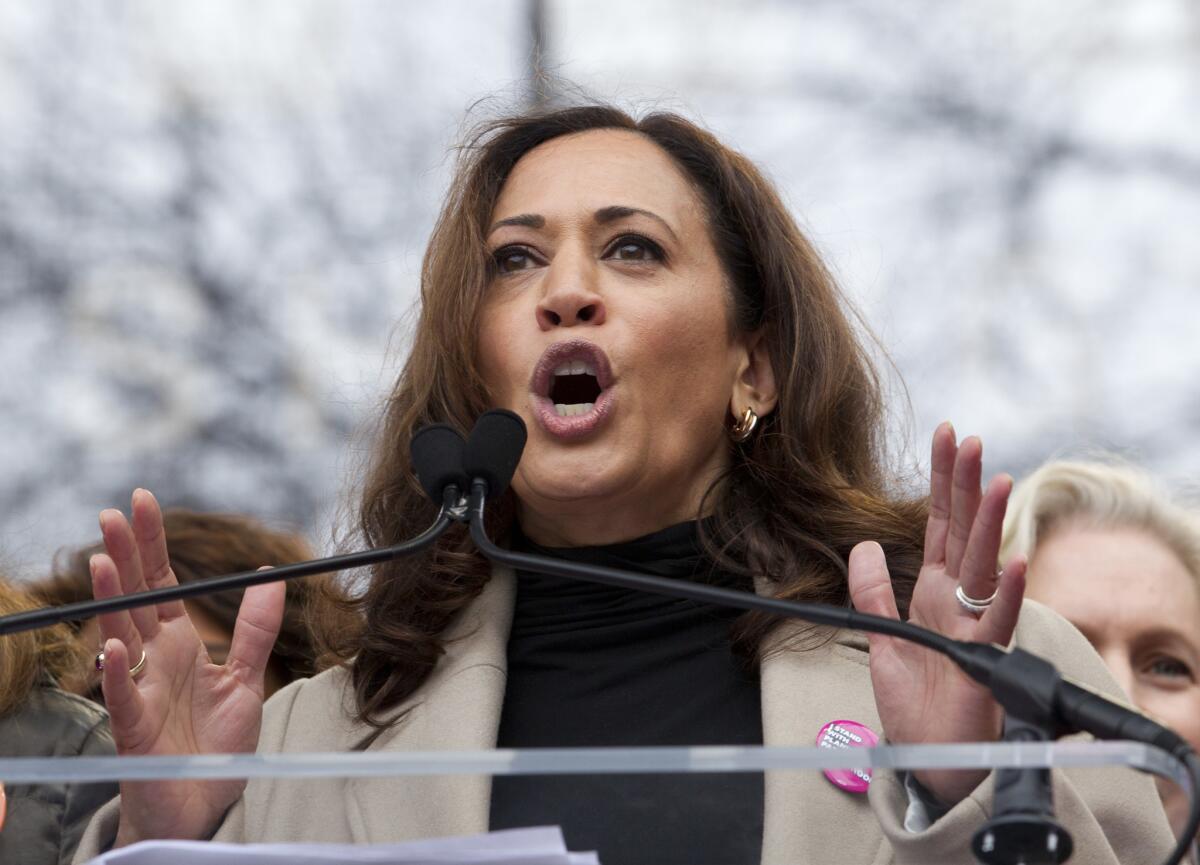
Amid all the self-reflection and infighting among Democrats about how they find their way out of the wilderness in Washington, Sen. Kamala Harris is emerging as a more nuanced political character than many on either side of the political line expected.
California’s freshman senator has embraced an approach somewhat at odds with her liberal image as she talked about the path back for Democrats and why she won’t unconditionally slam the door on working with Republican President Donald Trump.
New York City Mayor Bill de Blasio meets with Sacramento Mayor Darrell Steinberg
Rep. Devin Nunes’ role turns from controversial to untenable
Devin Nunes’ departure from his role as leader of the House investigation into Russian interference in the presidential election put a blot on the Tulare congressman’s record that the preceding drip-drip-drip of controversy had not.
For weeks, Nunes has been beset by criticism, especially after his startling trip to the White House to receive what he described as classified evidence indicating possible surveillance of some members of Donald Trump’s transition team. And for weeks, Nunes steadfastly denied he’d done anything wrong and pledged to remain at the helm of the House Intelligence Committee’s investigation.
But Thursday, a new investigation — this time by the House Ethics Committee into whether Nunes had inappropriately released classified information — marked a more serious turn for the Republican congressman.
It is far too soon to know whether his hold on his district has loosened, although Nunes’ opponents in the Central Valley district were heartened. But for now, the events were a reminder that power can vanish in Washington as swiftly as it accumulates, and that, at minimum, every act in this hyper-partisan environment spurs a furious reaction.
State appeals court upholds California’s cap-and-trade program
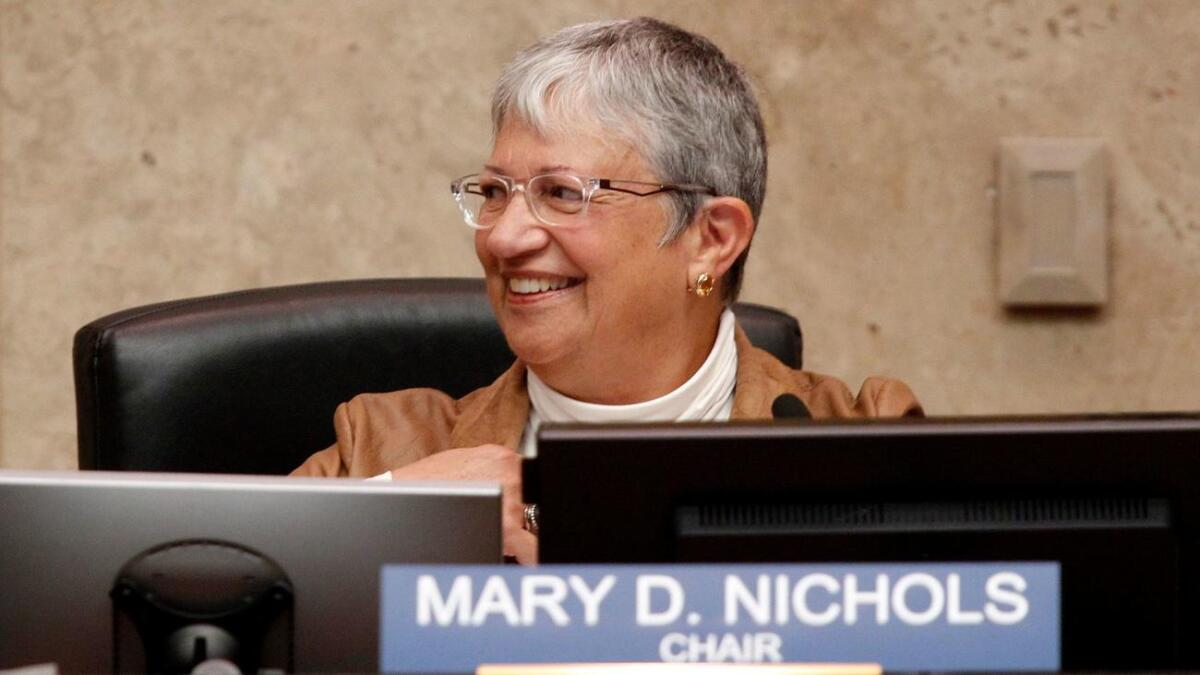
California’s controversial cap-and-trade program, a cornerstone of the state’s battle against climate change, has been upheld by a state appeals court.
Two judges on the appeals court panel sided with state officials who argued that the program, which requires companies to buy permits to release greenhouse gases into the atmosphere, fell within their authority to regulate industry.
A third judge on the panel of the 3rd District Court of Appeal in Sacramento agreed with the business groups who claimed that cap and trade functioned as an unconstitutional tax.
“This is great news for one of the world’s most ambitious climate programs and one of the best tools to solve climate change globally,” said Erica Morehouse, a lawyer with the Environmental Defense Fund. “We need that kind of positive news more than ever these days.”
The case, which began with a lawsuit filed nearly four years ago by the California Chamber of Commerce, has been a cloud over the cap-and-trade program ever since it began.
However, the decision could still be appealed to the California Supreme Court.
“We are reviewing the decision and evaluating our options,” said Denise Davis, a spokeswoman for the California Chamber of Commerce.
In addition, lawmakers are still debating whether to extend the program because there are separate legal questions over whether it can keep operating after 2020.
Read the ruling here.
At crime victims’ rally, Gov. Jerry Brown calls for public safety that focuses on rehabilitating offenders
De León and Gov. Brown agree to support GOP senator’s millions in budget requests in talks over backing gas tax
Ahead of a vote on legislation to raise taxes and fees to repair California’s roads, state Senate leader Kevin de León (D-Los Angeles) and Gov. Brown on Thursday supported a new bill that would provide $500 million for pet projects in the district of state Sen. Anthony Cannella (R-Ceres), including the extension of a Bay Area commuter rail line to Ceres and Merced.
Cannella’s vote is seen as crucial because at least one of the 27 Senate Democrats is expected to vote against Senate Bill 1, which would deprive the transportation proposal of the two-thirds vote needed for approval. The GOP lawmaker did not comment Thursday on whether he will vote for the plan, but had previously said he might if his requests, including the rail extension, were included.
Another $427 million was put in the budget for Riverside County transportation projects in districts of legislators including Sen. Richard Roth (D-Riverside) who had also been a holdout
For Cannella, the new budget bill put in print Thursday provides $400 million in transportation funds for “the extension of the Altamont Corridor Express (ACE) to Ceres and Merced, including associated system improvements.” The system runs between San Jose and Lathrop in the San Joaquin Valley. The extension would be funded through the year 2027.
The new bill also would provide $100 million through 2023 for a parkway project at the UC Merced campus.
A third new bill requested and written by Cannella, and co-authored by De León, would provide additional indemnification to professional designers on government contracts.
Gov. Brown said about SB 1: “I don’t think I’ve ever seen anything as big as this particular transportation bill.” He said the side “arrangements” are modest in comparison.
Though Cannella was not immediately available Thursday for comment, he said earlier in the week that the rail extension and indemnity for designers were his top requests from legislative leaders in negotiating for his support on the gas tax measure.
“The ACE train is a big deal for me. It’s important for my district,” Cannella said in an interview Tuesday. “I don’t see how I can support something that doesn’t have the [extension] language.”
A voter-approved initiative requires bills to be in print for 72 hours before a vote, so the train extension could not be put into SB 1 and voted on Thursday.
Cannella said the extension would allow a connection to the high-speed rail system.
“It’s a game-changer for my area,” he said. “If it’s built, you can hop on a train and make your way to the Bay Area.”
Aides to Brown and De León confirmed the leaders support the train extension funding bill.
The $100-million parkway request for UC Merced would help connect the campus to the 99 freeway. It is part of a proposed highway loop that would also connect the former Castle Airforce Base, which Assemblyman Adam Gray (D-Merced) said would be crucial to helping boost the local economy.
Gray said he was now on board with the proposed transportation package.
“Absolutely,” he said. “With that kind of investment — not just this but with the ACE rail to Modesto and to Merced — it gives us public transit and access.
“I can go home straight-faced and say to people: `This is tough. We’ve got to dig deeper. Nobody likes diesel and gas taxes. But this is a tangible, real benefit that I can point to,” Gray said.
He acknowledged that other members may blanch at the extra money going to his district.
“It’s a fair point, although I would make the argument [that] we’ve historically been underserved. And they’ve historically been over-served,” he said, noting specifically Los Angeles’ large share of transportation dollars.
12:40 pm: This post was updated to include comments from Assemblyman Adam Gray and the governor’s support for the rail extension bill.
This post was originally published at 12:00 p.m.
California joins 15 states in filing court brief supporting Planned Parenthood’s lawsuit against Ohio healthcare law
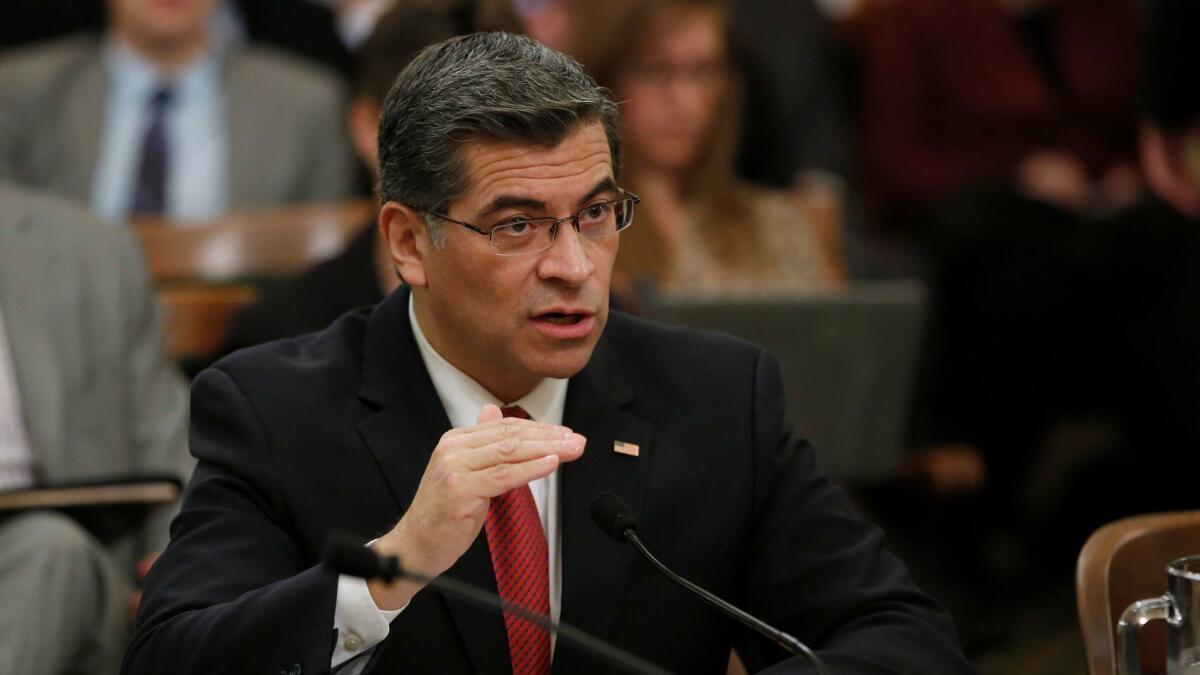
California has joined 15 other state attorneys general in filing a friend-of-the-court brief in support of a lawsuit by Planned Parenthood of Greater Ohio challenging a law in that state that excludes healthcare providers that offer abortion services from participating in other publicly funded health programs, officials said Thursday.
The lawsuit challenges the exclusion of such providers from breast and cervical cancer prevention programs, according to California Atty. Gen. Xavier Becerra.
“A woman, not politicians, should decide what is in her best interest when it comes to her health,” Becerra said in a statement a day after the brief was filed. “There is no rational basis for a state to deny women the right to choose among qualified healthcare providers.”
Since his appointment by Gov. Jerry Brown in December, Becerra has been active in arguing in court against national policies of the Trump administration and those of other states.
A third challenger announces bid for Rep. Mimi Walters’ Orange County seat
Democrat Kia Hamadanchy announced he’ll run for the 45th Congressional District Thursday, becoming the third Democrat this week to announce plans to challenge Rep. Mimi Walters (R-Irvine) for the seat.
Hamadanchy said he decided to run the night the Trump administration’s ban on travel from several predominantly Muslim countries, including Iran, was first announced. His Iranian-born mother asked him if they should sell their Orange County home and move to Canada.
Hamadanchy, 31, was a legislative assistant for U.S. Sen. Sherrod Brown (D-Ohio) until about a month ago, and he enters the race with Brown’s endorsement.
“I know firsthand how hard Kia will work to improve the lives of Americans from all walks of life. He is committed to protecting civil rights, making education more affordable, and increasing opportunities for all Americans,” Brown said in a statement.
Hamadanchy’s parents fled the Iranian Revolution, and he grew up in Orange County, graduating from Irvine’s Northwood High School. He has a law degree from the University of Michigan and also worked for former U.S. Sen. Tom Harkin (D-Iowa).
Two UC Irvine law professors, Katie Porter and Dave Min, each announced plans earlier this week to run for the seat in 2018.
The three Democrats have called Walters out of touch with the district’s changing population for supporting President Trump.
Democrats are targeting the Orange County district in 2018 in part because it chose Hillary Clinton by 5% in November’s presidential election. But Walters secured a second term with 58.6% of the vote, and it will likely be difficult for her Democratic challengers to win the seat.
Rep. Devin Nunes temporarily steps aside from Intelligence Committee investigation into Russia and 2016 election
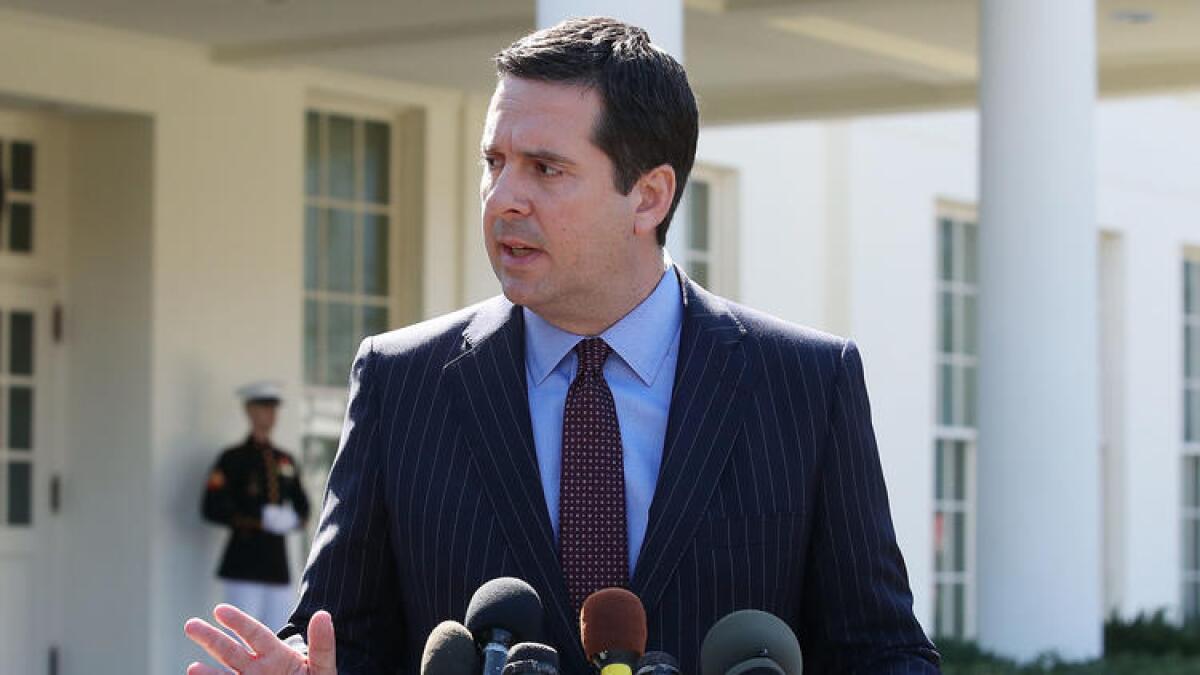
House Intelligence Committee Chairman Devin Nunes today said he’s temporarily stepping aside from the Russia probe amid accusations he may have improperly disclosed classified information.
Nunes (R-Tulare) said he was stepping down temporarily as head of the House probe into whether Trump associates colluded with Russia during last year’s election.
In a statement, Nunes said he was taking the action because “several leftwing activist groups have filed accusations against me with the Office of Congressional Ethics.”
It’s official: Robert Lee Ahn will face Jimmy Gomez in June runoff for L.A. congressional seat
Former L.A. city planning commissioner Robert Lee Ahn has secured the second and final spot in a runoff for the 34th Congressional District seat, according to the Associated Press.
He will go up against state Assemblyman Jimmy Gomez, a fellow Democrat, in a June 6 runoff for the Los Angeles seat that was vacated by Xavier Becerra when he became California’s attorney general.
While about 13,000 ballots from Tuesday’s primary election are still uncounted, Ahn has a significant 2,700-vote lead over third-place finisher Maria Cabildo. In the latest tally, Ahn had 19% of votes counted so far. The AP had previously reported that Gomez, who has 28% of votes so far, secured the first-place spot.
Schwarzenegger picks a 2020 primary challenger for Trump: Ohio Gov. John Kasich

Former California governor Arnold Schwarzenegger discusses Ohio Gov. John Kasich, his pick to challenge President Trump in 2020.
Former Gov. Arnold Schwarzenegger said Wednesday that Ohio Gov. John Kasich should campaign for the White House in 2020, essentially calling for a primary challenge to his fellow Republican, President Trump.
“He should run in 2020, yes,” Schwarzenegger said in an interview with The Times when asked whether Kasich, whom he supported over Trump in the 2016 presidential race, should launch another presidential campaign.
“Kasich is an extraordinary guy. He’s a man of substance. He’s worked in Washington, he’s worked in local government, he’s worked in statewide government. He has the experience. He can see things. He has vision,” Schwarzenegger enthused. “He’s also a moderate. He’s a tough Republican and very fiscally conservative, but he also at the same time loves helping people.”
Speculation is swirling around Kasich, who is traveling this month on a book tour in New Hampshire, which holds the first presidential primary in the nation. When asked whether he planned to run for president again, Kasich has said he is not planning on it, but also refused to rule it out.
Kasich and Schwarzenegger have a long friendship, in part forged when the former California governor held his Arnold Classic bodybuilding competition in Ohio.
In 2016, after Kasich dropped out of the GOP nominating contest, Schwarzenegger still voted for him a month later in the California primary and acknowledged doing so, a pointed snub of Trump, then the presumptive Republican nominee.
Schwarzenegger and Trump have feuded since then on issues including funding for after-school programs, immigration, climate change and their respective approval ratings.
Among the times Trump has publicly insulted Schwarzenegger include during the National Prayer Breakfast, when he asked the crowd to pray for Schwarzenegger because of the viewership of “Celebrity Apprentice,” on which Schwarzenegger replaced Trump as host.
Schwarzenegger said Wednesday that he and Trump have a long relationship, and the real estate mogul backed his gubernatorial efforts.
“I know him very well. I spent time with him throughout the decades.… We always had a good relationship,” Schwarzenegger said. “I just think that what ticked him off obviously was when I said, ‘Look, I’m not going to vote for you.’”
Schwarzenegger chuckled when asked whether the president’s focus on him, frequently on social media, was a frustration.
“No, no, I’m very happy. To me I think it is helping us, putting the spotlight on all of the issues I care about — environmental issues, after-school issues, all the issues that are important to me,” he said after a forum on after-school programs where he denounced Trump’s proposal to cut federal education funding. “He puts the spotlight on it by just doing something that is a little crazy, and then everyone talks about it, and then I go and say, ‘Whoa. Here is really what should happen.’
“We can play ping-pong back and forth – you say something, tweet something; I tweet something. It’s perfectly fine,” Schwarzenegger said. “I don’t at all have any complaints.”
California’s tax collection agency is ‘eroding the trust of the public,’ assemblyman says
Assemblyman Phil Ting (D-San Francisco) said Wednesday that the state’s tax collection agency, responsible for bringing in $60 billion annually, has failed to properly handle its budget money and has damaged public faith in its work.
The state Board of Equalization was recently accused of mismanagement in a review conducted by the state Department of Finance. On Wednesday, Ting, the former assessor-recorder of San Francisco, chaired a budget subcommittee hearing on the allegations.
Ting said the board and its administration could not answer “the simplest questions” from auditors about its finances and is “not fulfilling its fiduciary duty.” He added that “it is clear that [the board] is eroding the trust of the public and the taxpayers it is asked to serve.”
The Department of Finance review found employees assigned to revenue-generating jobs were reassigned temporarily to help elected board members and their political staffs with jobs that included putting on public outreach events to boost the board members’ standing in their districts.
A conference on empowering women hosted by board member Jerome Horton in his district involved borrowing 113 revenue-generating employees, including highly paid tax auditors, from the main office to help with crowd control and “parking lot duty.”
Brenda Fleming, the board’s chief deputy director, told the panel that the use of so many employees for tasks far outside their normal duties was inappropriate.
The Department of Finance evaluation found that the board “had difficulty providing complete and accurate documentation” in response to inquiries and misallocated millions of dollars in revenue, and that “various levels of management were not aware of and could not speak to” the informal establishment of a call center and creating an unofficial office location.
In response, State Controller Betty T. Yee recently called for stripping the panel of its tax administration duties and audit and compliance functions so it can focus on handling taxpayer appeals.
On Wednesday, David J. Gau, the executive director of the tax agency, said that there is room for improvement and that steps are being taken to address problems, including unspecified “abusive behavior issues.”
Under advice of his attorney, Gau declined to answer a question from Ting about whether he leaked an early copy of the review to a newspaper.
Fleming said the agency takes the findings of the Department of Finance seriously and is pursuing changes.
Election officials still have more than 13,000 ballots left to process in L.A.’s congressional race
Rep. Dana Rohrabacher has a plan to pay for Trump’s border wall: Charge rich foreigners $1 million to become citizens
When Rep. Dana Rohrabacher (R-Huntington Beach) met with President Trump in the Oval Office on Tuesday, he took the opportunity to pitch the president on a plan to pay for Trump’s proposed border wall: Charge 50,000 wealthy foreigners a year $1 million each to become citizens.
“We have 50,000 people come into the country every year chosen by a lottery, which is ridiculous. If we’re going to have people come in, OK, let’s choose the people coming in,” the Republican said on Wednesday.
The 50,000 visas Rohrabacher referred to are granted each year largely to people from Eastern Europe and Africa. To qualify, a person must have a high school diploma and be from a country few people emigrate from.
Unlike the hundreds of thousands of other visas the U.S. grants each year, which are based on specific factors like working in a high-demand field or having family in the country, the lottery is the only visa program based on a willingness to drop everything and move to the U.S.
Under Rohrabacher’s plan, the visa lottery would end and wealthy visa applicants would pay to become citizens within two years of their application. Such as effort would require legislation, which Rohrabacher says he hasn’t finished writing yet.
Rohrabacher said Trump was so interested in the idea he called in White House Chief of Staff Reince Priebus and senior strategist Steve Bannon to join the 45-minute conversation, which lasted three times longer than scheduled.
Rohrabacher said he and Trump also touched on a variety of foreign and domestic policies during their Tuesday meeting, but he wouldn’t be more specific.
Rohrabacher has been a vocal defender of the new president and his foreign policy proposals, including improving relations with Russia. Rohrabacher’s pro-Russia stance has long put him at odds with the majority of the Republican Party, but has gained Rohrabacher new standing with Trump.
Rohrabacher said Trump’s invitation to the White House came just after he defended the president on Fox News on Saturday. He didn’t believe the invitation was real because it was April Fools’ Day.
“It was a lively discussion on Fox News and I was my normal aggressive self and when I got off the interview ... my phone rang and it was the White House operator saying the president’s on the line for you,” Rohrabacher said. “It turned out this wasn’t a prank from one of my friends.”
National Democrats have announced plans to target Rohrabacher in 2018, and he’s drawn two opponents already. While the congressman was elected to a 15th term with 58.32% of the vote, the district narrowly chose Hillary Clinton for president.
“Congressman Dana Rohrabacher has existed on the fringe of American politics for decades but now has the ear of the president and the ability to push his dangerous views inside the Trump administration,” Democratic Congressional Campaign Commmittee spokesperson Tyler Law said in a statement.
Jimmy Gomez rolls out endorsement from progressive congressman and early Bernie Sanders backer
Schwarzenegger blasts Trump for proposed education cuts: ‘That’s not how you make America great’
In the latest round of the simmering feud between Arnold Schwarzenegger and President Trump, the former California governor on Wednesday blasted the president’s proposal to slash federal funding for after-school programs.
“President Trump promised us that he wants to make America great again. That’s not how you make America great, by taking $1.2 billion away from the children and robbing them blind,” he told a packed crowd at a summit on after-school programs at USC. “Why would you do that? Why would you balance the budget on the backs of these kids? Kids are the most vulnerable citizens. Kids are our future.”
The cut is part of a Trump administration budget proposal released last month that would reduce federal education spending by $9 billion, or 13.5%.
Schwarzenegger argued that such a move was penny wise but pound foolish, adding that investing in after-school programs now would save future government spending because they keep children out of trouble and provide academic and physical enrichment.
It’s the same argument he successfully made in 2002, when he pushed for the passage of Proposition 49, which earmarks $550 million in annual funding for after-school programs in California. The ballot measure, which was supported by a broad array of interests, was the political foundation of Schwarzenegger’s successful run for governor the following year.
The summit — which was attended by education and elected officials from all 50 states and entertainment and sports personalities including “American Ninja Warrior” host Matt Iseman, Houston Texans defensive end J.J. Watt and “Extra” host Mario Lopez — was planned before Trump unveiled his budget. But the timing of the gathering was fortuitous.
Schwarzenegger pledged to take the fight over the funding to the nation’s capital, as he did when former presidents Barack Obama and George W. Bush also sought to cut the funding.
“When I look out there, I see crusaders, I see warriors, I see a bunch of terminators,” he said. “I know we’re going to go to Washington. We’re not going to take this lying down…. We’ll talk to both parties and make sure that money goes back into the budget – that’s the bottom line.”
Schwarzenegger, who did not support Trump during the 2016 presidential race, has routinely sparred with his fellow Republican over issues such as the environment, the president’s travel bans that have blocked in the courts and their respective approval ratings.
Iseman joked that he expected Trump to hear about the after-school remarks later Wednesday.
“I think we saw a sound bite that we all know someone’s going to see later tonight,” he said as the crowd roared. “Way to go! Shots fired by the Terminator.”
CNN host Van Jones, who took the stage later to moderate a discussion with Schwarzenegger, added, “That was kind of hot. That was kind of spicy. Twitter about to break.”
Brown administration proposes merging medical and recreational pot rules and licensing
Gov. Jerry Brown’s administration has proposed a plan for merging regulations for medical and recreational marijuana ahead of licensing the growing and selling of the latter next year.
The new rules proposed by the administration include eliminating both state-issued medical-marijuana identification cards and the requirement that pot goes through a third-party distributor, and the rules use a Proposition 64 licensing structure for both recreational and medicinal cannabis.
The proposition passed by California voters in November will also be the guide for who will be issued a state license and therefore who is required to undergo background checks.
The state Department of Consumer Affairs proposes that a license holder be someone with at least 20% ownership in a business, or any person with the power to affect management decisions.
The proposal drew initial support from Ruben Honig, executive director of the Los Angeles Cannabis Task Force.
“We are closely reviewing the proposal, but applaud the State for proposing much-needed reconciliations between medical and recreational laws,” Honig said in a statement. “L.A.’s cannabis industry is one of the world’s largest and we must have a system that’s clear, streamlined and allows businesses and patients to thrive.”
Gov. Brown faces skeptical Assembly Democrats as he pitches transportation plan
Gov. Jerry Brown is making a rare cameo at an Assembly Democratic caucus gathering on Wednesday, giving an in-person sales pitch for his $52-billion transportation plan. But he’ll be facing a wary audience of fellow Democrats.
Brown’s visit comes one day after tensions flared at the caucus’ regular Tuesday lunch, where fears about a tough political vote were compounded by complaints about the short turnaround between the deal’s unveiling and Thursday’s scheduled vote.
“Part of the frustration that you’re hearing is that it’s a self-imposed deadline,” said Assemblywoman Anna Caballero (D-Salinas). “My perspective is that people want to be reflective about how we handle a big change, and so we want to make sure we’re checking in with our constituents and this doesn’t leave much time.”
The bill requires a two-thirds vote to pass. That would require every Democrat in the Senate and all but one Democrat in the Assembly to vote yes.
The scramble for votes has exposed the fractures within the large Democratic caucus, but unlike in past legislative battles, the fault lines are regional rather than ideological.
The informal but powerful group of business-friendly Democrats, who self-identify as moderates, are not voting as a bloc on the package. Some “mods,” including Assemblyman Jim Frazier of Oakley, who helped shepherd the proposal, are on board. Others, such as Assemblyman Rudy Salas of Bakersfield, are on the fence.
Assemblyman Jim Cooper of Elk Grove, the other Mod Caucus co-chair, said he was undecided, despite appearing at a news conference at the plan’s unveiling last week. He said he attended the media briefing to show general support for a transportation package, but he continued to have reservations about the current proposal.
“My constituents in my district are overwhelmingly against the tax,” he said.
He said resistance was coming for several reasons, not just from one centrist faction.
“If someone’s saying this is a Mod Caucus play, they are dead wrong,” Cooper said. “It’s about their district.”
Salas struck a similar note.
“I’m approaching this as the representative from Bakersfield,” he said. “I have to think of the fact that in my district, people have to drive a distance to drop their kids off to school. They have to drive a further distance even to go to work. And does this transportation plan take into account the distance that they travel in rural areas?”
Business groups, such as the California Chamber of Commerce, which Salas is ordinarily aligned with, are in favor of the proposal. But agricultural interests, which flex muscle in the Central Valley, are opposed.
Salas said he was taking the temperature from constituents not affiliated with interest groups at a local event last week.
“They were saying, ‘Yeah, something needs to be on transportation, but this is too steep,’” he said.
Another member who sometimes votes with the business-aligned caucus, Assemblyman Jose Medina, appeared at a rally in favor of the plan with the governor and legislative leaders in his Riverside district on Tuesday.
Medina had a rosier outlook on prospects for the plan.
“I’m a teacher,” he said. “I’m always optimistic.”
Another UC Irvine professor will challenge Orange County’s Rep. Mimi Walters in 2018
Inspired by the November election of Donald Trump, UC Irvine associate law professor Dave Min will challenge Republican Rep. Mimi Walters in Orange County’s 45th Congressional District.
“It was a call to action, really,” said Min, a Democrat. “After the election my wife and I went through our seven stages of grief.”
Min, 41, is a mortgage and housing finance expert who has worked as an enforcement attorney for the Securities and Exchange Commission and a financial policy advisor for Senate Minority Leader Chuck Schumer (D-N.Y.).
Min, a first-generation Korean American who grew up in the Bay Area, said he was happy helping craft policy outside of politics, but Trump’s ban on travel from some predominantly Muslim countries and Walters’ refusal to directly condemn it was the tipping point that made him run.
“As a child of immigrants myself I definitely feel like this is un-American. I feel like we’re going in the wrong direction,” Min said. “We wanted to be able to look our kids in the eyes in 20 years and say we did everything we could.”
Min enters the race with endorsements from former Irvine Mayor Sukhee Kang and former longtime Irvine Councilwoman Mary Ann Gaido.
“Dave is a warm and thoughtful family man who is running for all the right reasons,” Gaido said in a statement. “He’ll stand up for our values in Congress and put the residents of this district in control for a change. It’s about time.”
Min has an economics degree from the University of Pennsylvania’s Wharton School of Business, and graduated from Harvard Law School.
Earlier this week, MIn’s fellow UC Irvine law professor Katie Porter also announced a bid against Walters. Min said he expects several more people to enter the race, and Democrats should stay focused on beating Walters.
Though the district is slowly trending left, beating a Republican in the 45th District is still an uphill climb.
Even though the Orange County district went for Hillary Clinton by 5% in November’s presidential election, Walters was elected to a second term with 58.6% of the vote.
Min and Porter have both sought to tie Walters to President Trump on the heels of Democratic Congressional Campaign Committee ads targeting Walters after she voted for the GOP’s healthcare plan in committee.
Gov. Brown makes a final plea to holdouts on eve of gas tax vote
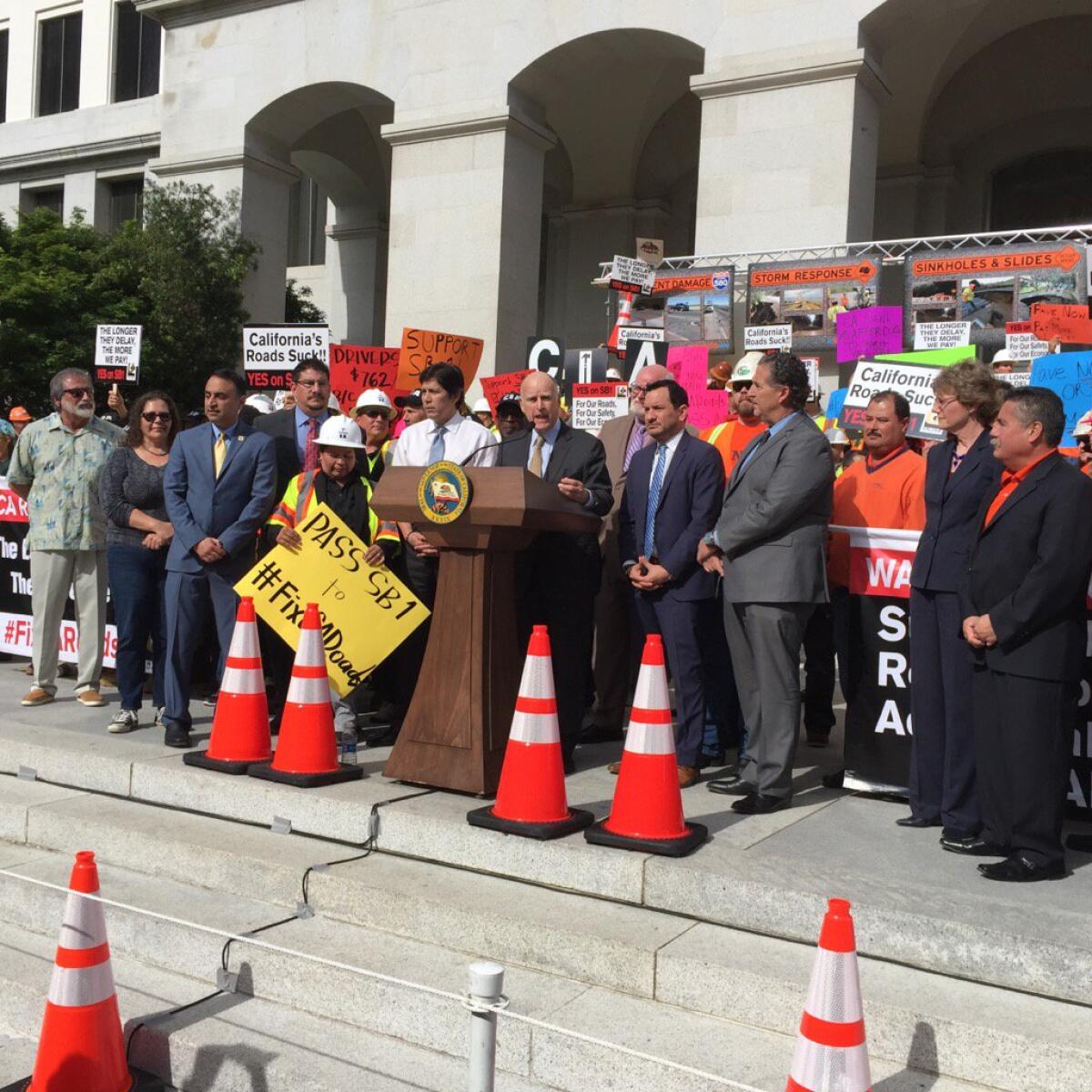
Shy of the support they need on the eve of a possible vote on a gasoline tax increase, Gov. Jerry Brown and legislative leaders made a final public appeal Wednesday to the many lawmakers who are on the fence, saying courage is needed to stand up against political fallout from supporting new money to fix the state’s roads.
Democratic sources say they are two or three votes short of the two-thirds majority needed to pass SB 1 in the Senate, as one Democrat, Sen. Connie Leyva of Chino, joined the ranks of the undecided Wednesday because of concern over how it will effect air pollution.
Brown has been working on getting the vote of Republican Sen. Anthony Cannella of Ceres in case all 27 Democrats do not vote for the bill.
“I know there are couple of people who are worried about voting for taxes,” Brown said during a rally Wednesday on the Capitol steps. “This is a fee, a fee for the privilege of driving on our roads that the people pay for, and we’ve got to keep paying for them. Otherwise, they are not going to work for us. It’s just that simple.”
Senate leader Kevin de León (D-Los Angeles) also appealed to undecided lawmakers.
“This is a courageous step for many legislators, but you can’t stand on the sidelines and be a naysayer,” De León said. “You can’t say no, no, no, no, no, no to everything.”
The rally featured a Republican county supervisor, Richard Forster of Amador County, and California Air Resources Board member Phil Serna, who both urged lawmakers to vote for the bill amid opposition from GOP lawmakers and environmentalists.
The environmentalists oppose a provision limiting the state’s authority to require aging trucks to be retrofitted with new technology, but Serna said it also includes a clause that will require 300,000 “dirty diesel trucks to clean up their act” by proving they upgraded their engines before the Department of Motor Vehicles will renew their registration.
The last-minute change that would delay the mandatory retrofitting of trucks until they are 13 years old or have 800,000 miles on them is of concern to Leyva, who said growing up in the Inland Empire made her especially sensitive to the issue of air pollution.
“When I was a little girl we could not see the mountains in the early ‘70s because the smog was so bad,” Leyva recalled.
Assembly Republican leader Chad Mayes of Yucca Valley said Democrats don’t have the two-thirds majority needed in the Assembly either, so he looks forward to working with them after the spring recess on improving the bill.
“As of today, from my conversations that I had with some Democratic members last night, I do not think there are the votes,” Mayes said. “There is a lot of concern among the Democratic Caucus that this is not a good deal for hardworking Californians.”
Thursday, he said is “an artificial deadline. If it doesn’t come up tomorrow they will be able to come back. My hope is we will be able to work together, both Democrats and Republicans alike, sit down and put a plan together that comes up with some efficiencies for our transportation system.”
Robert Lee Ahn could be first Korean American member of Congress in 20 years

John Yi and Jinha Park shot each other strained looks Tuesday night as they tried to name Korean American elected officials other than Los Angeles city councilman David Ryu.
There was Mark Keam, member of the Virginia House of Delegates. And New York State Assemblyman Ron Kim. State Assemblyman Steven Choi was just elected last year to represent part of Orange County.
“It is a short list,” said Yi, the president of the Korean American Democratic Committee.
The two were at the election night party for Robert Lee Ahn, the man they hope will soon leap onto the national stage and become the first Korean American to win a seat in Congress in more than 20 years. Ahn is in second place behind state Assemblyman Jimmy Gomez, who has garnered 28% of the vote to Ahn’s 19%. The two will likely meet in a runoff for the 34th Congressional District on June 6.
“It is very significant,” said Park, a radiologist. “The Korean American community has always felt voiceless at the federal level.”
Dozens of Ahn’s supporters packed into the La Fonda de los Camperos restaurant in the Westlake neighborhood. Several members of the Korean press were there to interview Ahn and his family.
Ryu’s election was a poignant victory for many in Koreatown in 2015. Now Korean American politicos are seeing if they can repeat the feat.
“It is a show of force for our community, which people have undervalued,” Yi said. “We need a seat at the table in the decision-making process.”
Ahn said it was meaningful to have the potential to represent Korean Americans at the federal level.
“Especially with everything happening on the Korean peninsula [and] the dangers presented by North Korea, we need to have a Korean American person in Congress,” he said.
Congressional runoff kicks into gear as Gomez, Ahn size each other up
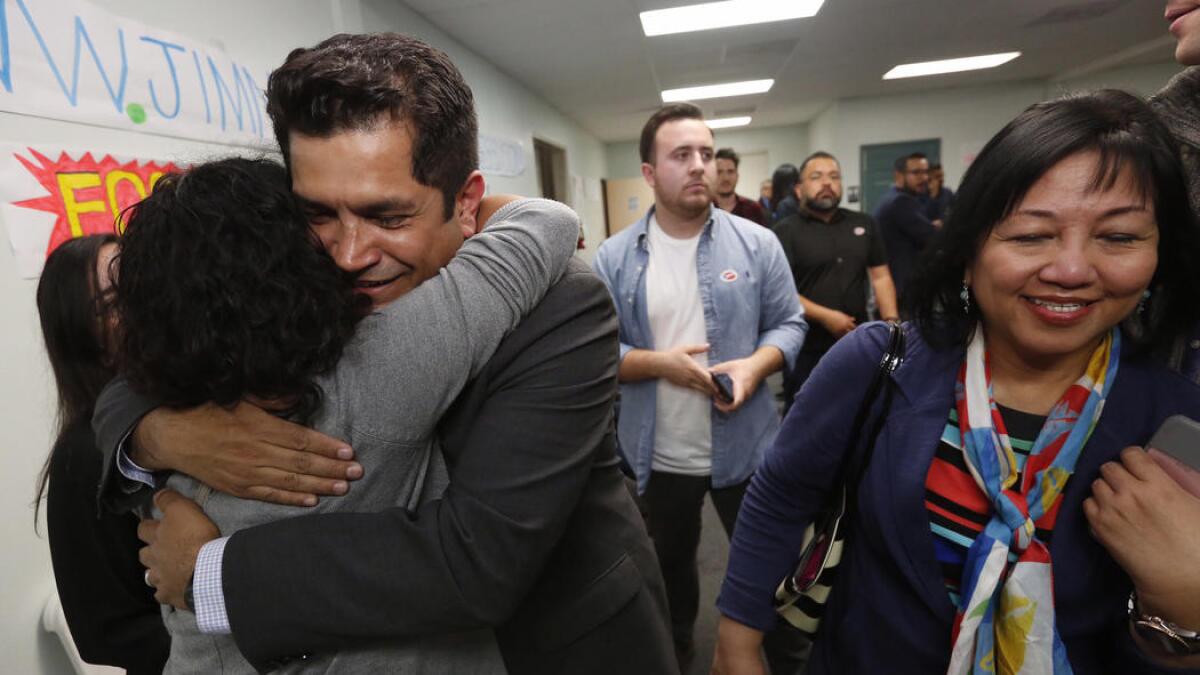
Jimmy Gomez is already honing his strategy against Robert Lee Ahn as the two appear headed to a June runoff for the 34th Congressional District.
That Gomez prevailed in the primary election to fill the seat left vacant when Rep. Xavier Becerra became attorney general shouldn’t be too big of a surprise. He is the Democratic Party’s pick, as well as Becerra’s choice for a replacement.
Speaking with The Times during his election night party, Gomez gave some insight into how he views the likely runoff match-up between Ahn and himself.
He said that even if Ahn — a political newbie who has turned heads with his prodigious fundraising and strong support from the Korean American community — raises serious cash, voters will trust his resume more.
“I suspect that he is going to be able to raise a lot of money but I believe that his message and his credentials will probably fall flat,” Gomez said.
Ahn is a former planning commissioner and Gomez a two-term Assemblyman who has backed progressive legislation in Sacramento. Gomez said he will champion his record in the campaign ahead.
“I am the true environmentalist, the true champion for workers and for women. And I have people to back me up,” he said.
He also said he would venture into diverse parts of the Los Angeles district to build up a coalition.
“I’m going to make a play for every community, every neighborhood, every single vote,” he said.
Gomez was attacked in the campaign for funds he got from PACs representing various industries. Ahn seems likely to pick that theme.
Speaking to supporters Tuesday night in Los Angeles’ Westlake neighborhood, Ahn said he was running to oppose “politics as usual” and criticized politicians who take “special interest” money and “do the bidding of those special interests.”
“It is time to put the people first,” he said.
“I think it makes it very difficult when you have so much funding from special interest sources to legislate on behalf of the people,” he told The Times in an interview.
Jimmy Gomez, Robert Lee Ahn advance in L.A. congressional race, prepare to face off in June contest
Assemblyman Jimmy Gomez will advance to a June 6 runoff in the 34th Congressional District, according to the Associated Press. With all 192 precincts reporting, Gomez was leading with 28% of the vote in a crowded 24-person field.
Robert Lee Ahn, a former L.A. city planning commissioner, was in second place with just under 19% of the vote.
Both Democrats claimed victory early Wednesday morning, as they positioned themselves for what could be a costly general-election contest.
Parke Skelton, a campaign consultant for Gomez, said the assemblyman’s lead in such a crowded field was “astonishing.”
“It’s a testament to the strong base of support in the district and a powerful grass-roots campaign,” Skelton said.
Darby Levin, a consultant for the Ahn campaign, said it was clear his candidate was moving on to the runoff.
“This is a mandate that politics as usual isn’t going to work anymore,” Levin said. “This is not, by any stretch of the imagination, a victory for Jimmy.”
Scenes from the Ahn election party as the 34th District primary draws to a close
Meet the men leading L.A.’s congressional race in early returns
It’s looking like it will be a long night of vote-counting, but with just a few precincts reporting in the special election, two Democrats led the race for the 34th Congressional District in Los Angeles.
Here’s a look at who they are:
Robert Lee Ahn is a businessman and former L.A. city planning commissioner. He raised the most money -- more than $338,700 -- in the latest campaign finance reports. If Ahn wins, he would be the only Korean American in Congress and the first Korean American Democrat to be elected to the body.
Jimmy Gomez is a state assemblyman who represents an area that substantially overlaps the congressional district that was held by former Rep. Xavier Becerra before he was named attorney general. He raised the second-highest amount, according to the latest campaign finance reports.
Nothing to do but wait for results in California’s special congressional election
Supporters of Assemblyman Jimmy Gomez’s congressional bid crammed into an office off York Boulevard in Highland Park and were treated to pupusas and tamales while pop songs blared over a speaker.
Anabel Cuevas, 26, a political science major at Cal State L.A. and volunteer for the Gomez campaign, leaned on a table and looked over at a nearby wall where election results were being projected.
She volunteered for Hillary Clinton last fall and said Gomez was a regular fixture at the local campaign offices. Cuevas phone banked for him the last few weeks.
With just a handful of precincts reporting results, Gomez was in second place with just over 26% of the vote. A runoff election on June 6 seems likely.
“It looks like I’ll have to be knocking on some doors now,” she said. “I’ll have to get my Nike Cortez out.”
Gomez walked in around 9 p.m. to applause, and posed for photos with Los Angeles City Councilman Gil Cedillo.
Scenes from the Gomez election party
Last-minute voter in Mt. Washington jokes he’s the only Republican ‘for a hundred miles’
Last-minute voters trickled into a polling place at Mt. Washington Elementary School Tuesday night to cast their votes in the race to represent California’s 34th Congressional District.
Steve Brown, a 62-year-old, semi-retired business consultant, joked as he was leaving that he was the only Republican voter “for a hundred miles.”
He said he voted for Steven Mac, who like Brown is a military veteran. Brown said he personally leans progressive on social issues, but is more conservative when it comes to international issues. He said liked that Mac, who served as a U.S. Army JAG officer, spent time in Iraq. He noted that Mac, a Los Angeles County prosecutor, was the only candidate to knock on his door.
“He has a really good demeanor about him,” Brown said.
Eddie Rosas, 42, and Jasmin Thomson, 34, said they both decided on Wendy Carrillo after studying the candidates’ campaign videos.
Rosas, an animator, said Carrillo, an activist and journalist, didn’t strike him as a typical politician.
“She just seemed a little more humble, a little more honest,” he said.
By the numbers: See the results in L.A.’s congressional primary election
The top two finishers are advancing to a June 6 runoff. Results here show how the rest of the pack finished behind Jimmy Gomez and Robert Lee Anh.
Voters in L.A.’s congressional election talk about their picks: ‘We need more women in positions of power’
‘Don’t blow it, guys’: Gov. Brown warns lawmakers not to hold out support for plan to repair California’s roads

Gov. Jerry Brown on Tuesday ratcheted up pressure on lawmakers who have not committed to a gas tax increase for road repairs, appearing in the Riverside district of Democratic state Sen. Richard Roth, one of the holdouts, and calling for legislators to step up and act.
With a self-imposed deadline for a vote just two days away, Brown warned that if legislation raising $52 billion over 10 years is not approved this year, the cost of repairing the same crumbling roads and bridges could grow to $100 billion in five years, creating a deeper “hole” to dig out from.
“Now is the time — and don’t blow it, guys,” Brown said in a message aimed at legislators. “I’m going off to my ranch” at retirement. “You’re going to be driving on these damn roads. Fix them now, or we may never get them fixed.”
During the rally Tuesday at Riverside’s North Park, Brown was critical of Republicans who he said are afraid of the political fallout of voting for tax increases even though the money is needed.
“I can tell you the Republicans in Sacramento want to fix our roads. They love the idea,” Brown said. “They just don’t want to be associated with the bill because it has money in it. I think they expect the Tooth Fairy to pay the $5 billion every year.”
Brown was joined at the rally by co-authors of the bill, Assembly Speaker Anthony Rendon (D-Paramount) and Senate leader Kevin de León (D-Los Angeles), as well as several city council members and other public officials from Riverside County.
De León also addressed colleagues who have criticized the plan.
“We are beyond the point where all you do is bluster and rhetoric,” the Senate leader said.
Others present at the rally included Riverside County Supervisor Chuck Washington, Riverside County Board of Supervisors Chairman John Tavaglione and Riverside Mayor Rusty Bailey.
“California roads are deteriorating so we’ve got to fix them,” Brown said.
The measure by Brown and legislative leaders would increase the base gas tax by 12 cents per gallon, add a 20-cent tax to diesel fuel, implement an annual vehicle fee averaging $51 and charge electric cars a new $100 fee.
With Brown and legislative leaders pressing for a vote on Thursday, Roth said Tuesday that he remains undecided on the bill.
“I’m still looking at it,” he said in an interview in his Capitol office. “The issue is, how is Riverside County going to benefit from SB 1?”
Roth noted that other groups have come out against the measure since it was unveiled last week.
“We now have the environmental justice community upset down there because of certain modifications to the bill that I was not involved with, so I am looking at the bill and the amendments and I haven’t decided,” he said. “We’ll just have to see.”
The senator was unfazed by the pressure coming from the governor’s appearance in his district.
“We always invite the governor to come down and see us in western Riverside County. From my perspective he isn’t down there enough,” Roth said, smiling.
A spokesman for state Sen. Steve Glazer (D-Orinda) said he also remains undecided on the bill, even though Brown held a news conference in his district last week.
Meanwhile, Republican Sen. Anthony Cannella of Ceres said Tuesday that he plans to vote against the bill, as written, if it comes up on Thursday. He said he was prepared to vote for the bill if it had incorporated a few of his requests, including money to extend a commuter train line that runs from San Jose to Lathrop, so that it would also go to Merced.
“I’m going to vote ‘no,’” Cannella said. “How can I support something that doesn’t include any of my asks?”
California gubernatorial candidates call for a change in approach to public safety policies
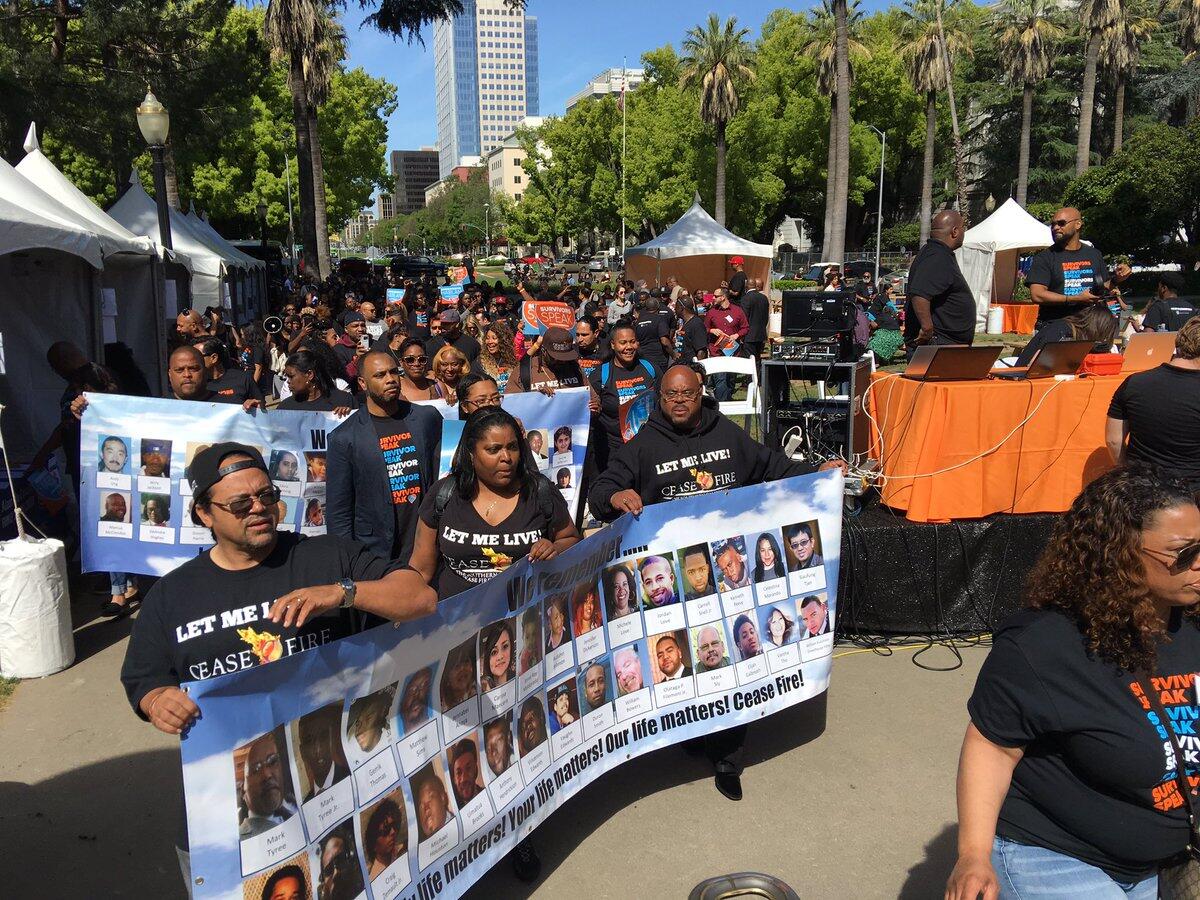
Candidates in California’s 2018 race for governor on Tuesday sounded off on their support for mental health services, rehabilitation programs and an approach to criminal justice that puts victims at the center of policy.
At a community forum hosted by the group Crime Survivors for Safety and Justice, State Treasurer John Chiang, former Los Angeles Mayor Antonio Villaraigosa and Lt. Gov. Gavin Newsom were quizzed on their public safety priorities as the state has moved to loosen sentencing, reduce prison overcrowding and provide greater assistance to offenders re-entering society.
The event, held at a Sacramento hotel, was part of a two-day conference that brought hundreds of crime survivors and victims advocates to the state Capitol. Participants marched, rallied and lobbied lawmakers to carry legislation that focuses on treatment, not incarceration.
All of the candidates spoke of the need to tackle the vast income inequality across the state that can lead children in some neighborhoods into gangs, drugs and the prison pipeline. Chiang and Villaraigosa touched on their upbringings and personal experiences with crime.
Chiang, the eldest son of Taiwanese immigrants who grew up in Chicago and New York, described the discrimination his family faced as they moved up the socioeconomic ladder. He spoke of the death of his sister, Joyce, a federal immigration lawyer who disappeared and was found slain in 1999.
“My family is Catholic,” he told the audience of about 500 people. “We believe in redemption. We believe in hope. We also believe in being serious on crime.”
Villaraigosa said he was raised by a single mother and grew up in a home with domestic violence and alcoholism. He called for intervention programs that give young people second chances, like the kind he said had allowed him to become an elected official, though he had once dropped out of school.
He said he was one of the few to take on the death penalty and tough-on-crime policies as president of the American Civil Liberties Union of Southern California in the 1980s and ‘90s.
And he drew applause and cheers from the audience as he spoke of his efforts to counter gang violence in South Los Angeles.
“I think we need to invest in people again,” he said. “We have to educate our kids, support our families, address the poverty.”
Newsom, a former mayor of San Francisco who once served as a member of the San Francisco Board of Supervisors, also cited his long-standing opposition to the death penalty and his support for Proposition 47, a sweeping 2014 ballot measure that reduced punishment for lower-level drug and theft crimes.
Praising crime survivors for changing the narrative on criminal justice policy, he said he would advocate for early intervention programs, such as the wellness center initiative he implemented at San Francisco public schools.
“I am committed to funding these priorities because it is the right thing to do,” he said. “I am committed to funding these priorities because they are long overdue. I am committed to funding these priorities because they work.”
Proposal to keep Aliso Canyon gas storage facility temporarily closed advances in California Senate

California senators advanced legislation Tuesday that would keep the gas storage facility at Aliso Canyon closed until a study is completed on the 2015 leak that forced thousands to evacuate their homes.
However, the measure was modified by the Senate Energy, Utilities and Communications Committee to address concerns that Southern California could see power outages without a supply of gas from Aliso Canyon.
Under the amendment, the governor could declare an emergency that would allow the facility to start operating again.
“I’m feeling good about it,” said Sen. Henry Stern (D-Los Angeles), who authored the legislation, Senate Bill 57.
Because it’s considered an urgency measure that would take effect immediately, the legislation requires a two-thirds vote in both the state Senate and the Assembly.
The measure was opposed by the Southern California Gas Co., which said a study was unnecessary and the facility was safe.
“It’s time to resume [gas] injections,” said Rodger R. Schwecke, vice president for gas transmission and storage.
Watch live: Sen. Kamala Harris on why she opposes Trump’s Supreme Court nominee
California farming groups band together to oppose gas tax increase to repair roads

A coalition of two dozen agricultural industry groups has announced its opposition to proposed gas tax and vehicle fee increases to pay for road repairs, saying the additional costs will be a burden on struggling farming operations without greatly expanding the capacity of roads to transport goods.
The letter to legislators is on behalf of groups including the Western Growers’ Assn., California Cattlemen’s Assn., California Fresh Fruit Assn., the Assn. of California Egg Farmers and the California Farm Bureau Federation.
“The proposed taxes in SB 1 will dramatically increase transportation costs for farmers, ranchers, food processors and agricultural suppliers,” the letter said.
It said new vehicle fees will also add to the cost of operating trucks, and the new costs are on top of expenses incurred in dealing with more regulation of the industry.
“By dramatically increasing costs to manage our farms, transport inputs and transport our commodities to market, SB 1 will reduce returns on agricultural commodities entering the marketplace,” the groups wrote. “Unlike the diesel and gasoline tax, increased input costs cannot be passed to consumers by farmers and ranchers and as such must be absorbed with no added value.”
California members of Congress worry Homeland Security isn’t taking their immigration concerns seriously

Rep. Pete Aguilar (D-Redlands) and Rep. Nanette Barragán (D-San Pedro) give updates on their meeting with Homeland Security Secretary Kelly.
California members of the Congressional Hispanic Caucus said Tuesday that they still feel Homeland Security Secretary John Kelly is dismissing their stories about misbehaving immigration officials.
“The secretary was very evasive in answering specific questions, so I’m still really disappointed in his refusal to acknowledge that while he may think that he’s putting out a certain directive, that directive is not being followed in the streets,” said Rep. Norma Torres (D-Pomona).
Kelly met with the Congressional Hispanic Caucus, including 10 Californians, Tuesday morning in a Capitol office building to discuss their concerns about the department’s implementation of the more aggressive deportation efforts ordered by the Trump administration.
The orders have caused panic in many of California’s immigrant communities because they are aimed at deporting millions of people who are in the country illegally.
The members told stories about officers staking out churches, schools and hospitals — all of which are on the list of spaces immigration officials are not supposed to target — or intimidating people by hovering in neighborhoods with heavy immigrant populations.
Homeland Security spokesman Dave Lapan told reporters after the meeting that the secretary has confidence in the professionalism of the immigration enforcement officers.
“His message to the members was, by and large, our agents are hardworking professionals, highly trained, very well screened ... but if somebody steps out of line, if somebody is not following policy, then there are steps we can take,” Lapan said.
Lapan said Kelly asked the members to bring him specific, detailed examples of immigration officials doing something they shouldn’t, rather than broad concerns.
“Give us specific details, don’t say, hey we’re hearing that this happened on this day somewhere. If you can give me what had happened, as much specific information as you can, I’ll have my staff look into it,” Lapan said.
He pointed to photos Rep. Lou Correa (D-Santa Ana) previously presented Kelly showing an Immigration and Customs Enforcement vehicle outside Christ Cathedral in Garden Grove. Correa also showed Kelly a letter from Bishop Kevin Vann of the Orange County Diocese asking ICE not to enter diocese property. Once the Los Angeles Times wrote about the photos, ICE officials announced that customs and Border Patrol officers were at the church to attend a funeral.
Torres was incredulous that the secretary asked members to verify accounts about what his employees were doing. The members have met several times with Kelly, and Torres said the same concerns were brought up over again.
“He’s asking us to do his job for him. If we have to continue to do his job for him, we are happy to do that, but it shouldn’t take a member of Congress to have to go outside and take photos and take videos of the misbehaviors that we are bringing forward to him,” Torres said. “It’s embarrassing that the secretary would ask us to continue to bring forward evidence.”
The caucus has asked Kelly for periodic meetings with him or his staff for updates, but nothing has been scheduled yet.
Rep. Pete Aguilar (D-Redlands) said the secretary committed to informing the caucus if the Trump administration decides to make information submitted by people who have deportation relief under the Deferred Action for Childhood Arrivals program available to immigration enforcement officers.
Nearly 750,000 people brought to the country illegally as children applied for the program, and one in three are estimated to live in California. Aguilar said he was glad to get a direct answer from Kelly, but “I still remain very cautious that there are individuals within the administration whose end game is to use that information for enforcement.”
Reports of no lines, mostly empty polling places on election day for L.A.’s congressional race
With so many candidates in L.A.’s congressional race, some supporters couldn’t choose just one
With so many candidates to chooose from in the race for the 34th Congressional District seat, some donors and supporters didn’t limit themselves to just one in the primary race that ends today.
Eli Broad, a prominent local philanthropist and charter school advocate, gave $2,700 to both Sara Hernandez and Yolie Flores. Paul Song, an oncologist married to journalist Lisa Ling, gave $2,700 to both Assemblyman Jimmy Gomez and Arturo Carmona. Johng Ho Song, executive director of the Koreatown Youth and Community Center, gave Carmona and Flores each $250.
But not everyone spread the love equally. Architect Christopher Pak gave Gomez $2,700 in December but then contributed $1,500 to Robert Lee Ahn two months later. Interior designer Lauren Turner gave Gomez $1,000 at the beginning of 2017, but later donated $2,700, the maximum allowed amount, to Hernandez. Linda Griego, a businesswoman and former deputy mayor, gave Maria Cabildo $2,700 and two days later kicked in another $500 to Flores.
And L.A. City Councilman Jose Huizar, who himself considered running for the seat before deciding against it, has approved the use of quotes and his image for two candidates: Hernandez and Wendy Carrillo.
As polls opened, thousands of 34th Congressional District voters had already cast ballots
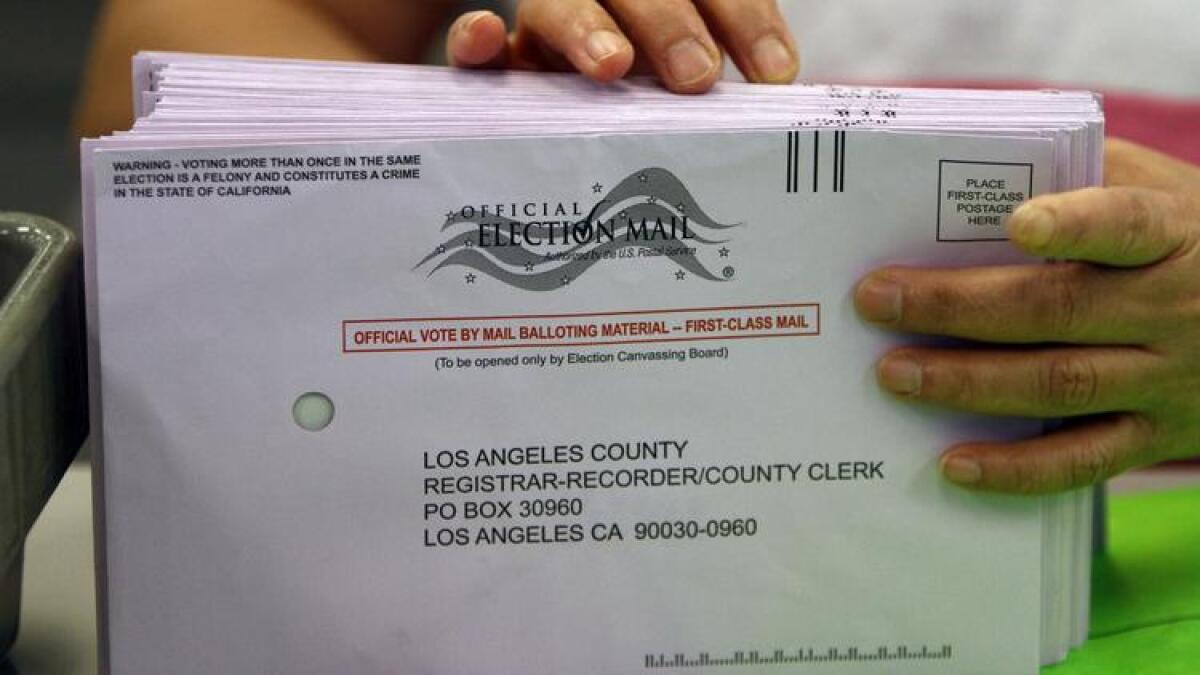
Before polls opened this morning, thousands of voters had already cast ballots in the primary election for the 34th Congressional District seat.
As of Monday evening, 17,458 voters, or about 5.7% of registered voters in the district, had submitted mail-in ballots. That’s slightly higher than the 16,178 voters in the district who had submitted ballots the day before the March 7 city election.
Predictions for turnout in the race range from as low as 9% to as high as 21%, closer to the Los Angeles city races last month.
Of those who had already voted in the race to replace Xavier Becerra in Congress, 12% were Republicans, 60% were Democrats and about 27% had no party preference, according to Political Data. People 55 years or older made up 60% of early voters.
Latinos, who make up about half of the district’s registered voters and represent a majority of candidates in the field, had sent in just 28% of the mail-in ballots cast as of Monday, while Asian Americans, who are just 16% of registered voters, made up 35% of the early vote. Korean Americans, in particular, were outperforming in early returns: They make up just 6% of voters in the district but had cast 35% of ballots as of Monday.
Not among those voters are at least four of the candidates who don’t live in the district. Aerospace engineer Tracy Van Houten lives in Pasadena; Tenaya Wallace, a strategist for public education campaigns, lives in Silver Lake; attorney Richard Sullivan resides in West Los Angeles; and Mark Edward Padilla lives in Montebello.
Federal law does not require members of Congress to live within the districts they represent, but none of them will be able to cast ballots for themselves in the crowded race.
It’s election day for some Angelenos. Here’s what you need to know to vote

Voters in Koreatown, part of downtown and much of L.A.’s Eastside are casting ballots Tuesday in a race that will determine their next member of Congress.
Two dozen candidates are running to replace Xavier Becerra in the 34th Congressional District. Find out who they are at latimes.com/34candidates and read about their policy positions at latimes.com/34issues. Want to follow the money? We’ve got more on that at latimes.com/34money.
If you’re not sure whether you live in the district, you can double check here. Polls will be open from 7 a.m. to 8 p.m. Tuesday and you can find your polling place here. If you vote by mail, your ballot will be counted as long as it’s postmarked by Tuesday and received by election officials by Friday. You can check on the status of your mail ballot here.
Special note for Korean-language voters: double-check your sample ballot to make sure it lists the candidates in the correct order. A previous error on some Korean-language sample ballots could cause you to vote for the wrong person inadvertently. Korean-speaking voters who need assistance or want to report voting problems can call (562) 462-3066.
For all other voters who need help, call (800) 815-2666.
For more information on this race from county election officials, go here.
And don’t forget to follow results as we report them at latimes.com/essentialpolitics.
Controversial ‘sanctuary state’ bill clears major hurdle after hours of debate
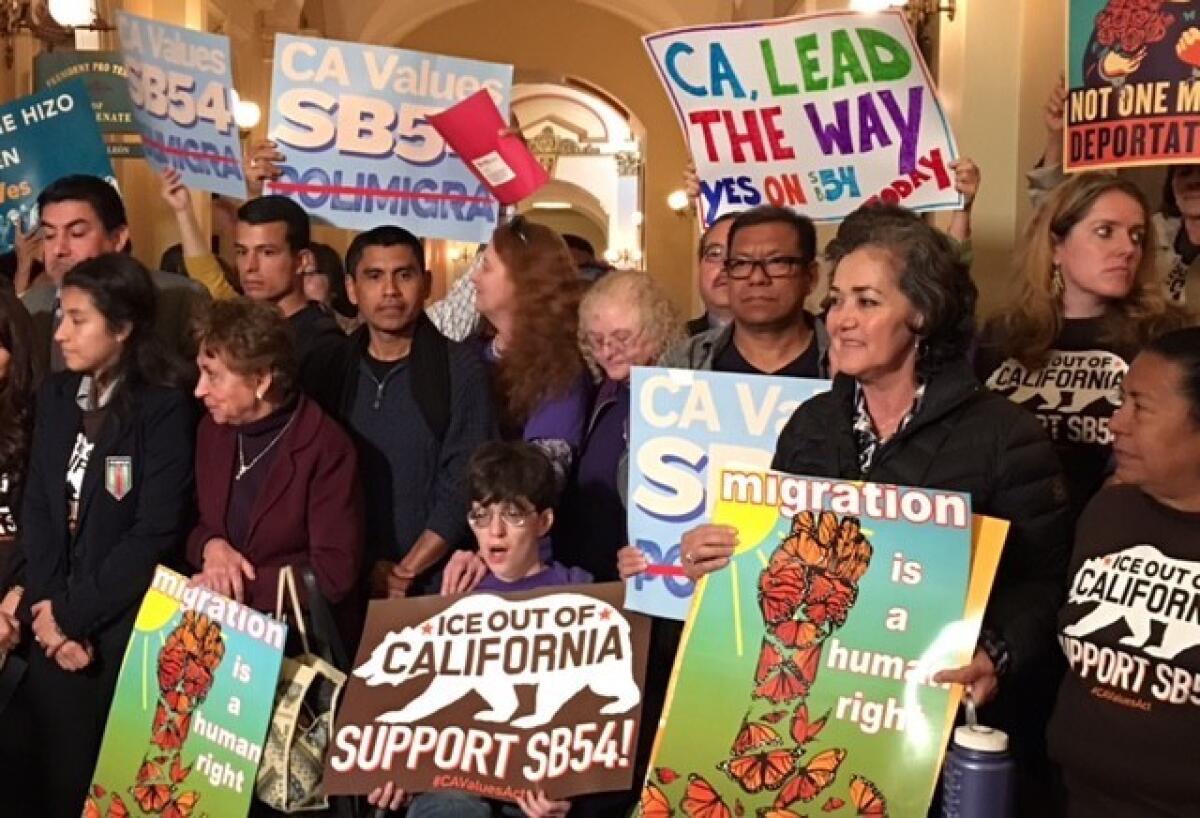
After dozens of advocates and lawyers descended upon the state Capitol to lobby in support of bills to protect immigrants, the state Senate on Monday passed legislation that would provide lawyers for immigrants facing deportation and limit the cooperation between local and state law enforcement agencies with federal immigration officials.
The Senate floor approval was the first major hurdle cleared for a legislative package of bills introduced by the majority party Democrats amid rancorous debate over the election of President Trump. The bills now head to the state Assembly for consideration.
In hours-long debate, Democratic lawmakers argued the bills were vital to protect vulnerable immigrants from expanded deportation orders under the Trump administration. They pointed to the economic contributions of all immigrants to the state’s economy, and they urged their colleagues to send a message against harmful national rhetoric stereotyping entire communities.
At the center of the legislative package is a so-called “sanctuary state” bill introduced by Senate President Pro Tem Kevin de León (D-Los Angeles). Senate Bill 54, which was approved with a 27-12 vote along party lines, would keep state and local law enforcement agencies from using resources to investigate, detain, report or arrest people for the purposes of immigration enforcement.
Speaking on the Senate floor, De León said new amendments to his legislation would allow local law enforcement agencies to participate in task forces and give U.S. Immigration and Customs Enforcement 60-day notices on the release of violent and serious felons.
The Trump administration’s threats against so-called sanctuary cities and “mass deportation strategies are based on the false premise that sanctuary cities are unsafe,” he told lawmakers.
Outside the Senate chambers after the vote, members of the Service Employees International Union clapped and chanted “Sí, se puede.” De León said the time had come for lawmakers to “roll up their sleeves” and get the measure approved in the Assembly. The latest changes to his bill removed an emergency clause that would have required a two-thirds vote of approval in both chambers.
“Will he strike back? We don’t know,” the Senate leader told reporters when asked how he thought President Trump would respond to his bill. “We hope not. He is the president of the greatest country in the world. It is not about retribution. It is about bringing the country together.”
On the Senate floor, state Sen. Ben Hueso (D-San Diego) said he had to make concessions in amendments to Senate Bill 6, which would create a $12-million legal defense program for immigrants facing deportation who do not have a violent felony on their records.
Hueso said he reduced the scope of the legislation given the limited resources to prioritize immigrants with children, immigrants with parents who are citizens, veterans and asylum seekers.
“This grants our friends, our families and our neighbors the same rights that are afforded to us,” Hueso said.
But Republican lawmakers were not persuaded. They argued the legislation shielded dangerous offenders and inappropriately limited cooperation among agencies at different levels of government.
Sen. Joel Anderson (R-San Diego), a staunch sanctuary state bill opponent, argued Democrats were trying to have it both ways.
“On one hand, we don’t want any federal immigration enforcement from any state agency,” he said. But on the other, he said, lawmakers wanted to use state money to defend people from federal immigration laws.
The only proposal to pass with unanimous, bipartisan support, with a 34-0 vote, was legislation introduced by Sen. Ricardo Lara (D-Bell Gardens) and coauthored by Anderson. It attempts to block the creation of a “Muslim registry,” another Trump proposal, by prohibiting state and local agencies from providing or disclosing religious affiliation information to the federal government.
“Collecting information early and often is wrong,” Anderson said.
New opposition arises to bill that would raise the gas tax in California
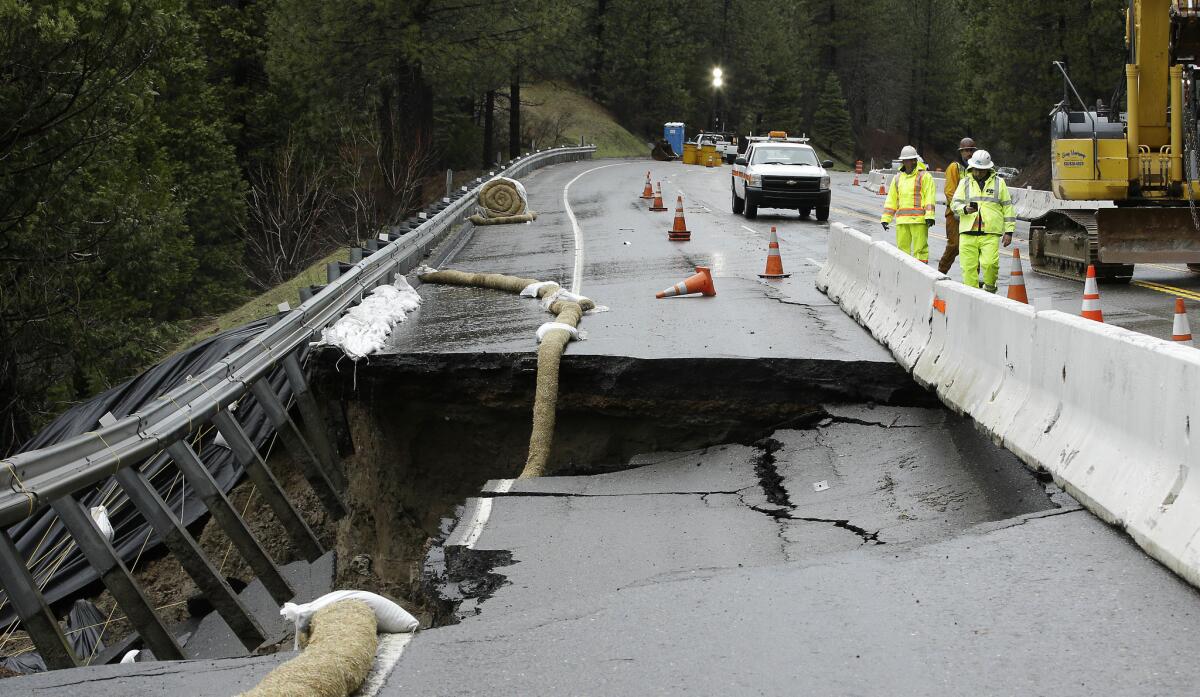
Assemblyman Vince Fong (R-Bakersfield) clashed Monday with Gov. Jerry Brown over how a proposal to raise gas taxes for road repairs may add to increases in fuel prices expected from the state’s cap-and-trade program.
Fong told Brown during a legislative hearing that he opposes a bill by the governor and legislative leaders that would raise the gas tax by 12 cents per gallon. He warned that drivers could already face higher prices at the pump from the state’s cap-and-trade program, which requires polluters such as oil refineries to buy permits to release greenhouse gases into the atmosphere.
Fong pointed to a report he requested from legislative analysts, who said the price per gallon could increase between 24 cents and 73 cents per gallon by 2031, depending on the cost of cap-and-trade permits.
“California continues to become more unaffordable because of decisions made in Sacramento, and hardworking Californians are bearing the burden,” Fong said.
Brown noted that Republicans will vote against extension of the cap-and-trade program anyway.
“You guys are talking about both sides of your mouth,” he said to the assemblyman during a hearing by the Assembly Transportation Committee.
Wendy James, director of the California Business Alliance for a Clean Economy, said it was “ridiculous to try to assess any specific cost increase to a particular policy.”
“Blaming environmental policies for gas price spikes has been the industry’s go-to excuses for decades while they sit back and count their cash,” James said. “The truth is, almost every gas price spike is related to some problem within the oil industry.”
Meanwhile, the activist group Consumer Watchdog on Monday said it opposes the legislation as long as it takes money from motorists and said the state instead should pass a bill that would take a portion of windfall profits from the oil industry to pay for road and bridge repairs.
“In recent years, Californians have been paying an unjustifiable amount at the pump, and oil companies should be giving some of that back to fix the roads themselves,” consumer advocate Liza Tucker wrote in a letter to California lawmakers. “Consumer Watchdog calls upon you to oppose the gas tax Governor Brown has proposed until it requires oil refiners to pay some of the billions of dollars in windfall profits they have made recently at the pump.”
Later Monday, State Republican Party Chairman Jim Brulte criticized the Democrats who he said have diverted money from transportation projects for years.
“Now, our roads and dams are at a crisis point and the Democrats want to loot money from the pockets of the middle class and working poor through a gas tax and vehicle registration fee hike totaling more than $5 billion per year,” Brulte said in a statement. “It seems that the Democrats are determined to drive California’s middle class into poverty.”
Updated at 4:30 pm to include comments from Jim Brulte.
Actress Sharon Stone defends Rep. Maxine Waters in spoken word video
Actress and activist Sharon Stone spoke about Rep. Maxine Waters (D-Los Angeles) and her willingness to challenge the Trump administration in a new video released on Monday.
Waters, who has represented the 43rd Congressional District since 1991, has taken particular aim at President Trump since he took office in January, including repeatedly calling for him to be impeached.
The video, a mashup of Walters’ photos and videos with Stone speaking over the footage, is a response to Fox News host Bill O’Reilly saying last week that he was distracted by Waters’ hair while she was giving a speech about patriotism under Trump. He compared her hair to that of the late musician James Brown. O’Reilly apologized after an outcry.
Waters responded on MSNBC, saying she was not intimidated by O’Reilly and won’t let the comment distract her from her concerns about the administration.
Sacramento rallies draw hundreds in support of laws to protect immigrants and to reform the California bail system
Dozens of advocates, lawyers and community members gathered on opposite sides of the state Capitol on Monday to rally in support of bills to protect immigrants and to reform the bail system across the state.
Cumbia music blared at the start of the event organized by the Service Employees International Union near the Capitol rose garden. Attendees said they planned to lobby for bills they said would counter the effects of the Trump administration’s expanded deportation orders.
Among the measures they plan to lobby for is a sanctuary state bill that was filed by Senate leader Kevin de León. It would prohibit law enforcement agencies from using resources for immigration enforcement. Another bill by Assemblymember David Chiu (D-San Francisco) would require employers to ask for warrants during workplace raids and set standards so that they don’t occur illegally.
On the opposite end of the Capitol, a rally organized by the American Civil Liberties Union of California focused on De León’s sanctuary state bill and legislation to reform the bail system.
10:21 a.m.: This article was updated to clarify the provisions of Assemblymember David Chiu’s workplace legislation.
This article was originally published at 3:05 p.m.
California, other states accuse Trump administration of dragging heels on energy efficiency standards
The legal battles between California and President Trump over environmental policies are starting to pile up.
State Atty. Gen. Xavier Becerra is joining with his counterparts in other states to accuse the U.S. Department of Energy of unlawfully delaying new efficiency standards. Becerra and nine other attorneys general filed a notice that they’re prepared to sue within 60 days if the federal government doesn’t implement standards on portable air conditioners, walk-in coolers and other equipment.
“Energy efficiency standards are a win-win for consumers and the environment,” Becerra said in a statement.
California is one of several states also preparing for a legal fight over Trump’s effort to roll back the Clean Power Plan.
Lawmakers advance proposal to increase gas taxes and vehicle fees to fund California road repairs

Faced with a personal appeal by Gov. Jerry Brown, a Senate panel on Monday gave the first approval to a measure that would raise gas taxes and vehicle fees by $52 billion during the next decade for road and bridge repairs.
The bill by Brown and legislative leaders was approved in a 5-2, party-line vote by the Senate Appropriations Committee, which sent it to the Senate floor, where it is proposed to come up for a vote on Thursday.
“The roads are broken and they are getting worse and they are not going to get better unless we get a significant injection of money,” Brown told the panel in rare testimony to a legislative committee.
The governor made similar comments later in the day to the Assembly Transportation Committee, where Republicans challenged him on the past diversion of transportation funds to the general fund. Brown noted the money went to pay debt on transportation bonds, so the money was properly spent.
Brown acknowledged that the tax increases are “a big lift” and are politically difficult. “I know there is a political concern because people don’t like gas taxes, but what do you do,” he said. He said if action is not taken this year, it might not happen for years.
“All the guys running for governor [in 2020] want to be president so they are not going to want to raise taxes,” he told the committee.
State Sen. Jerry Hill (D-San Mateo) was among the committee members who voted for the bill.
“The tax hasn’t increased in 23 years,” Hill said. “I think this is a reasonable approach in trying to balance the need with the demand.”
Republican Sen. Patricia Bates of Laguna Niguel complained the proposal ignores Republican ideas for using existing funds to fix roads.
“It isn’t bipartisan,” she told the governor, who accused Republican lawmakers of being haunted by “the ghost of Howard Jarvis,” the late tax-cutting pioneer.
Several environmental groups said they oppose a provision in the bill that bars government agencies from requiring the retirement, replacement or retrofit of trucks until the later of either 13 years from the model year of the engine, or when the vehicle reaches 800,000 miles.
“This is one of the most extreme efforts to put bounds on the regulatory agencies’ activities to stop pollution that I have seen in recent times,” said Kathryn Phillips, director of Sierra Club California.
Environmentalists continued to oppose the measure despite an amendment Monday to allow state and regional air-pollution control boards to create new rules to reduce smog created by trucking hubs, such as giant warehouses, ports and airports.
Bill Magavern of the Coalition for Clean Air said he continues to oppose the bill for tying the hands of air quality regulators who might want to adopt new rules to provide for cleaner truck operations.
“We are concerned by the negative effects that will be caused in the disadvantaged communities we work in,” added Abigail Ramirez of the Leadership Council for Justice and Accountability.
If approved by the Senate and Assembly, the measure would raise the base excise tax on gasoline by 12 cents per gallon, to a total of 30 cents per gallon, raise diesel taxes and create a new annual vehicle fee that would average $51 based on the value of the car or truck. State officials estimate the tax package will cost the average motorist $10 per month.
The bill was supported in testimony by Transportation California, a business and labor group; the California Trucking Assn.; and the League of California Cities.
Opponents citing its added cost include the National Federation of Independent Business/California, the California Farm Bureau and the Howard Jarvis Taxpayers Assn.
“Let’s not jam this through before spring break,” David Wolfe of the Howard Jarvis Taxpayers Assn. said.
Providing driver’s licenses to immigrants who are in the U.S. illegally has reduced hit-and-run wrecks, study says

Providing driver’s licenses to immigrants who are in the U.S. illegally has reduced the number of hit-and-run wrecks in California, a new study has found.
The report, released Monday by the Stanford Immigration Policy Lab, provides the first in-depth analysis of the impact of Assembly Bill 60, which in January 2015 allowed immigrants in the country without legal status to apply for special licenses.
More than 600,000 immigrants became eligible to drive legally under the reform in 2015, according to the study published in the Proceedings of the National Academy of Sciences. The report found the law had no discernable effect on the number of traffic wrecks and fatalities in California.
But the report found it did cut the rate of hit-and-run collisions by up to 10%, resulting in roughly 4,000 fewer wrecks overall. It saved about $3.5 million in out-of-pocket expenses for victims, and decreased insurance market distortions by an estimated $17 million, according to the study.
To measure traffic safety, researchers used monthly data on crashes reported by the Statewide Integrated Traffic Records System from the California Highway Patrol. Data were available for each county and month between January 2006 and December 2015, according to the report.
With transportation vote looming, Proposition 54 backers warn that late changes could be a problem

The advocacy organizations that convinced voters last fall to impose a new waiting period for public review of bills have a message for the Legislature: Don’t skip the rules if you don’t want to end up in court.
The letter delivered Monday to leaders of the state Assembly and Senate pointed out what the advocates suggested was a less than complete implementation by lawmakers of the legislative transparency ballot measure.
“As supporters of Proposition 54, we write to express our concerns with the Legislature’s implementation to date, which could inadvertently result in the invalidation of bills that the Legislature wishes to pass,” said the letter from members of the measure’s campaign advisors.
Proposition 54 mandates that almost all bills approved by the Legislature be available for public review for at least 72 hours. It also imposes other new rules on the Legislature, including new availability of video and and audio recordings of legislative proceedings.
The two houses of the Legislature, when they convened in December, passed operational rules that take different views of the Proposition 54 bill review period. Assembly Democrats enshrined a rule that states the 72-hour period applies only to final passage of a bill before it goes to the governor — and thus would allow last-minute amendments to any bill as long as it still needed ratification by the Senate.
Backers of the ballot measure dispute that interpretation, saying the 72-hour waiting period applies to either house’s last action on a bill.
The question hasn’t been tested yet, with no major legislative action so far in 2017. But that could change this week with efforts by Gov. Jerry Brown and Democratic leaders to win passage of a multi-billion dollar transportation proposal.
While the current version of the bill was drafted last week, any changes to placate critics would ostensibly have to be in print and online by the end of Monday night. The Legislature adjourns for spring break on Thursday.
“If the Legislature does not follow this requirement before voting to pass a bill, that bill would not be constitutionally passed and would not be eligible to become a law,” said the letter from the ballot measure backers.
That kind of disagreement could trigger legal action against any bill passed under the disputed rules.
Lawmakers aren’t required to take action on the transportation plan this week, but are operating under a deadline decided upon by Brown and Democratic legislators.
State Senate panel will investigate allegations of misconduct against California’s tax collection agency
A state Senate panel will conduct an investigation into allegations by the Department of Finance of mismanagement by the State Board of Equalization, which collects taxes, officials announced Monday.
Sen. Richard D. Roth (D-Riverside) says the probe to determine whether public funds were misused will be conducted by the Senate budget subcommittee No. 4 that he chairs.
“Californians should have confidence that their hard-earned tax dollars are being invested and managed in a responsible and transparent manner,” Roth said in a statement, adding that the issues outlined by finance officials “are deeply troubling.”
Last week’s review by the Department of Finance found the board “had difficulty providing complete and accurate documentation” in response to inquiries, and “various levels of management were not aware of and could not speak to” certain actions, including the informal establishment of a call center, creating an unofficial office location and inconsistent use of community liaisons.
The review said personnel records showed workers assigned to administrative jobs that they were not doing, having been transferred to help board members in their districts.
Will there be another bid in the California Legislature to unionize Uber drivers this year?

After failing last year in her attempt to allow Uber and Lyft drivers — and other workers in the state’s growing on-demand economy — to collectively bargain for their pay and benefits, Assemblywoman Lorena Gonzalez Fletcher (D-San Diego) wants to try again.
Gonzalez Fletcher believes that the drivers should be able to argue for different working conditions, but she and others have struggled to develop a system that would accomplish her goals while at the same time preserving the flexibility that many drivers enjoy.
Feinstein on Supreme Court pick: ‘I cannot support this nomination’
Sen. Dianne Feinstein (D-Calif.) will vote against the confirmation of Judge Neil M. Gorsuch to the U.S. Supreme Court, she announced Monday morning.
Feinstein, the ranking Democrat on the Senate Judiciary Committee, had indicated her displeasure with Trump’s pick for the Supreme Court, but hadn’t said for sure how she would vote until shortly before the committee voted on Gorsuch’s nomination.
“Our job is to assess whether the nominee will protect the legal and constitutional rights of all Americans and whether the nominee recognizes the humanity and justice required when evaluating the cases before him,” she said. “Unfortunately, based on Judge Gorsuch’s record at the Department of Justice, his tenure on the bench, his appearance before the Senate and his written questions for the record, I cannot support this nomination.”
Gorsuch is expected to be approved by the Judiciary Committee on Monday. Democrats are expected to filibuster his nomination on the Senate floor, and Feinstein will join the effort to block his confirmation, a spokesman confirmed.
Senate Majority Leader Mitch McConnell (R-Ky.) has said if Democrats try to block Gorsuch, he’ll trigger a change in the rules and allow Supreme Court nominees to be confirmed on a majority vote instead of the 60 votes now required to end debate.
UC Irvine law professor to challenge Rep. Mimi Walters in Orange County’s 45th District
UC Irvine law professor Katie Porter is challenging Republican Rep. Mimi Walters in Orange County’s 45th District in 2018.
The 43-year-old Democrat is an expert on consumer-protection law and banking and was an early whistleblower about mortgage fraud by Wall Street banks ahead of the 2008 financial collapse.
“I’m really running to do what I’ve always done, which is to stand up to special interests,” Porter told The Times in an interview. “I want to take that fight to Washington.”
In 2012, she was picked by then-Atty. Gen. Kamala Harris to monitor distribution of California’s share of a $25-billion national mortgage foreclosure settlement. Harris, now a U.S. senator, has endorsed Porter.
“It was my job to hold those banks accountable,” Porter said. “We won thousands of victories.”
Porter also enters the race with the endorsement of her former Harvard Law School professor, Sen. Elizabeth Warren (D-Mass.). Porter and Warren co-authored a book on debt and credit law.
“Katie is a fighter! She’s been in the trenches with me fighting for families for nearly two decades — and she’s gotten real results. She’s fought relentlessly for important protections that safeguard consumers and force banks to give families a fair shake. There’s no one I trust more to take on Donald Trump and the entrenched special interests in Washington on behalf of working families,” Warren said in a statement.
Even with two high-profile endorsements in hand, beating a Republican in the 45th District will be a heavy lift. Walters won reelection in 2016 with 58.6% of the vote, and prognosticators such as Larry J. Sabato’s Crystal Ball, from the University of Virginia Center for Politics, say even though the Orange County district went for Hillary Clinton by 5 percentage points in last November’s presidential election, the seat is likely to remain in Republican hands in 2018.
Nevertheless, local activists have been particularly focused on Walters and the seat, protesting weekly outside her office and leaving petitions demanding she hold a town hall meeting.
Porter has been part of that activism, serving as spokeswoman for the local chapter of the protest group Indivisible and getting involved with some of the other local groups.
“I think those groups have done a great job helping to make families’ voice heard,” she said.
National Democrats have their eye on the seat as well. The Democratic Congressional Campaign Committee rolled out ads targeting Walters after she voted for the GOP’s healthcare plan in committee. Walters, who serves on the Energy and Commerce Committee, was one of the earliest supporters of the bill among the California Republican delegation.
California Politics Podcast: The rubber meets the road on a transportation deal in Sacramento
This is likely to be the biggest week of the year so far in Sacramento as Gov. Jerry Brown and Democratic legislative leaders try to pull off one of the state Capitol’s most difficult feats: A long-term, multibillion-dollar tax increase.
On this week’s California Politics Podcast episode, we take a closer look at the plan to raise taxes for transportation repairs and improvements across the state. While the details were made clear last week, the plan’s fate depends on political calculations of a handful of skeptical Democrats in the Legislature.
We also discuss the pressure President Trump’s administration is putting on “sanctuary cities,” even as the leader of the state Senate makes a major modification in his bill to extend those sanctuary efforts to all of California.
And with the announced relocation of the Oakland Raiders to Las Vegas, we consider a long trail of efforts by California politicians to craft deals in hopes of attracting new professional sports teams or keeping existing franchises from packing their bags.
I’m joined by Times staff writer Melanie Mason and Anthony York of the Grizzly Bear Project.
Is George Takei really planning a run for Congress against Rep. Devin Nunes?

No, Mr. Sulu is not running for Congress.
Star Trek actor and civil-rights advocate George Takei on Friday posted a link on social media to an article that said he planned to challenge Rep. Devin Nunes (R-Tulare), the head of the House Intelligence Committee who has been in the news recently due to his handling of the investigation of Russia’s interference in the presidential election.
Most media outlets, including The Times, were skeptical because of the timing — today is April Fool’s Day.
And on Saturday, Takei admitted that it was a gag, but he used the attention to promote the candidacy of Jon Ossoff, who is running for Congress in a special election in Georgia later this month.
A political run by Takei would not have been entirely surprising — the state has a history of electing actors to office (think Ronald Reagan and Arnold Schwarzenegger).
And Takei has run for elected office before. He unsuccessfully ran for Los Angeles City Council in 1973. He is also an outspoken Democrat who is a vocal critic of President Trump. The Los Angeles resident has also regularly spoken out about the Russia investigation that Nunes is overseeing.
